THE MES ;SENGER

December 19 2 0



December 19 2 0

Subecription Price $1.51 Per ·Annum
Entered at the Pol't Oiiice 'at lUChlnollll'Coni!te,V-a., ·a • second-class matter.
E. B. WUl,INGflAld:, '.2L_________________ u • Editor-in-Chicf
K E. BURKE, '2l ________________________________.:,___Assistant Editor
3
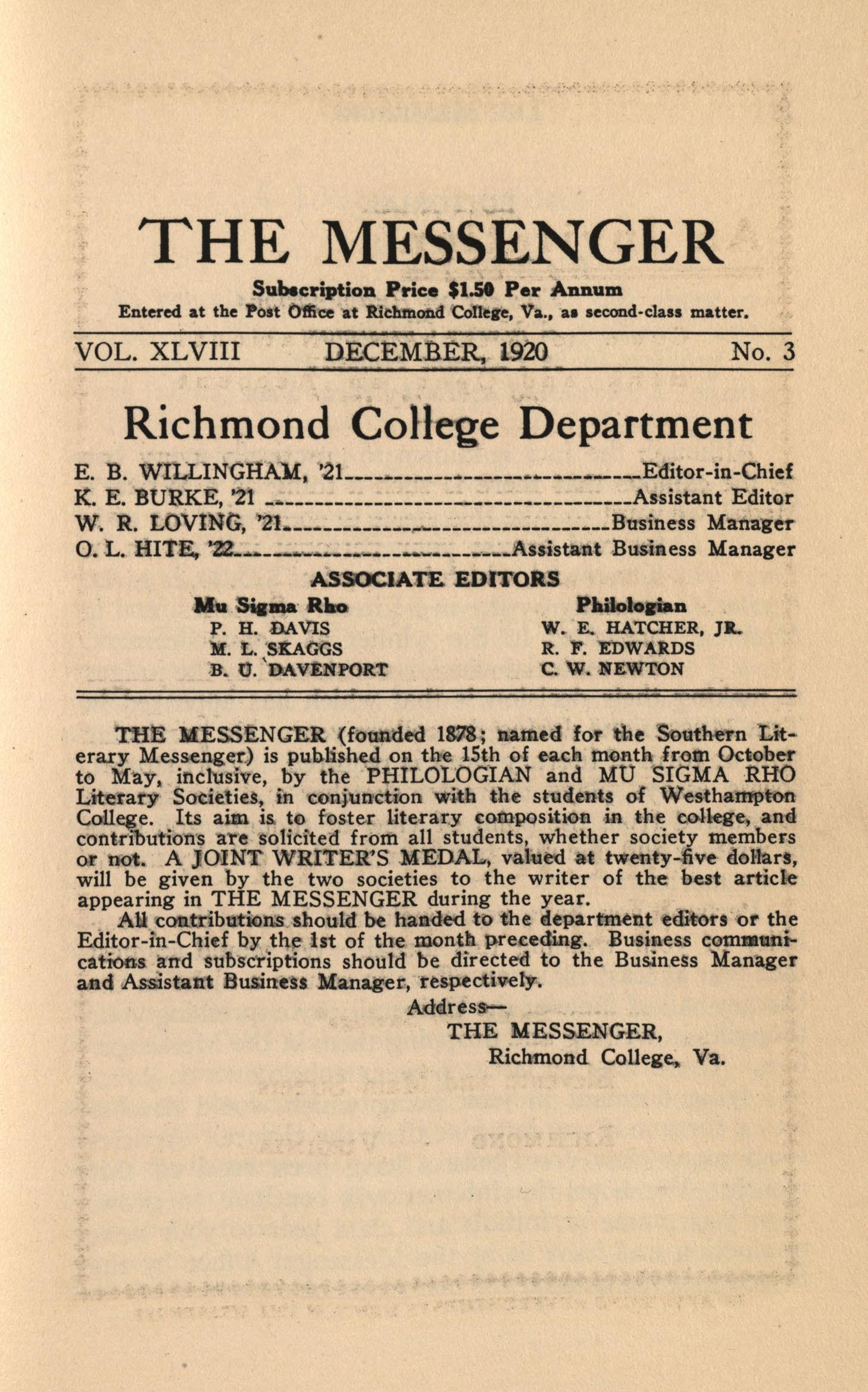
W R. LOVtNCi, "21..____________,.....__________________Business M'analier·
0. L .. HITS, . ~zz.....___.________________ ..A.ssistant Business Manager
ASSOCIATE .EDITORS ,Ila , Sia- RIID
P. H. D.A\1.1S '.M.t. 'SKAGGS ,B. u.DAVbPORT
P~l•aian
W. E., HATCHER, JL R. ~ ; l:'DWAltDS C 'W. ,NEWTON
'l'Hii llESSENG'ER (fotllld~ 18'8; named lot tile Southern t.iterary Messenger..) is puhlished on the -15th of each month from October to May, inclusi<ve, by the PHILOL'OGIAN and MU SIGMA RHO Lite:tary Sotidies. fu ·conjuni;:tion wlt-h the student! of w~sthartll)ton Coll~e. Its aim is. to foster literar.y composition .in the oo.Uege, and cotltr'ibution ·s -ate ·solidtecl from all students, whether society members or oot. A JOINT WRl'TER•S YEDAL., valued 3t twenty4ive dollars, will be given by the two societies to the writer of the best article appearing in THE MESSENGER during the year . . AU. c011_ttib~tions_·should handed tb- the i!leparfment -editors 'ot the Editor-in-Chief by the, ist of the JllQnth p.rece($ing. Business communrcations and sul'>scriptions should be directed to the Business Manager and Ass'istant Bu&intlS Man~ei:;, respectively.
AddrcsSI-
THE MESSENGER, Richmond Colleg~ Va.
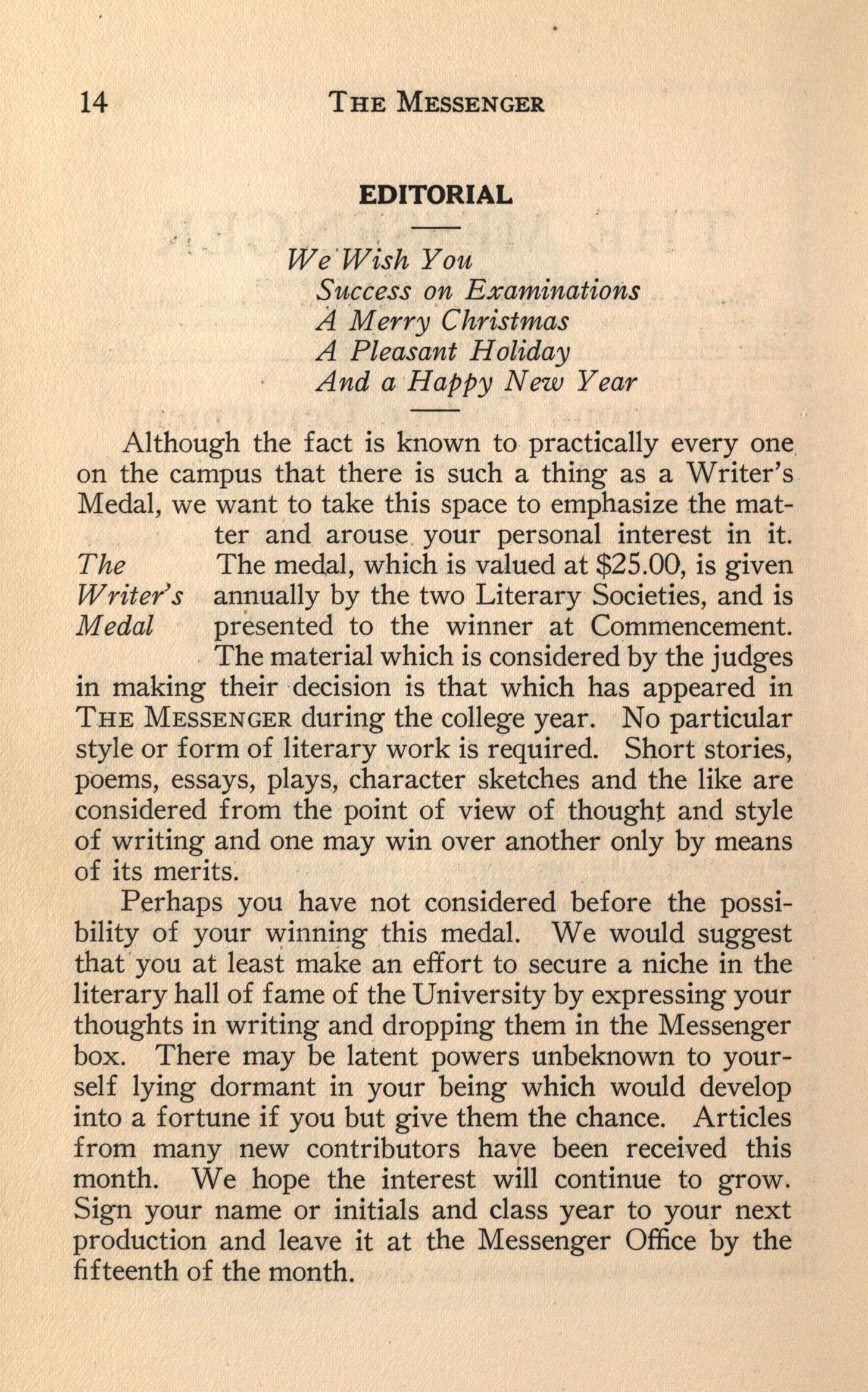
Although the fact is known to practically every one _ on the campus that there is such a thing as a Writer's Medal, we want to take this space to emphasize the matter and arouse . your personal interest in it. The The medal, which is valued at $25.00, is given Writer's annually by the two Literary Societies, and is Medal presented to the winner at Commencement . . The material which is considered by the judges in making their ·decision is that which has appeared in THE MESSENGERduring the college year. No particular style or form of literary work is required. Short stories, poems, essays, plays, character sketches and the like are considered from the point of view of thought and style o.f writing and one may win over another only by means of its merits:
Perhaps you have not considered before the possibility of your vyinning this medal. We would suggest that ·you at least make an effort to secure a niche in the literary hall of fame of the University by expressing your thoughts in writing and dropping them in the Messenger box. There may be latent powers unbeknown to yourself lying dormant in your being which would develop into a fortune if you but give them the chance. Articles from many new contributors have been received this month. We hope the interest will continue to grow. Sign your name or initials and class year to your next production and leave it at the Messenger Office by the fifteenth of the month.
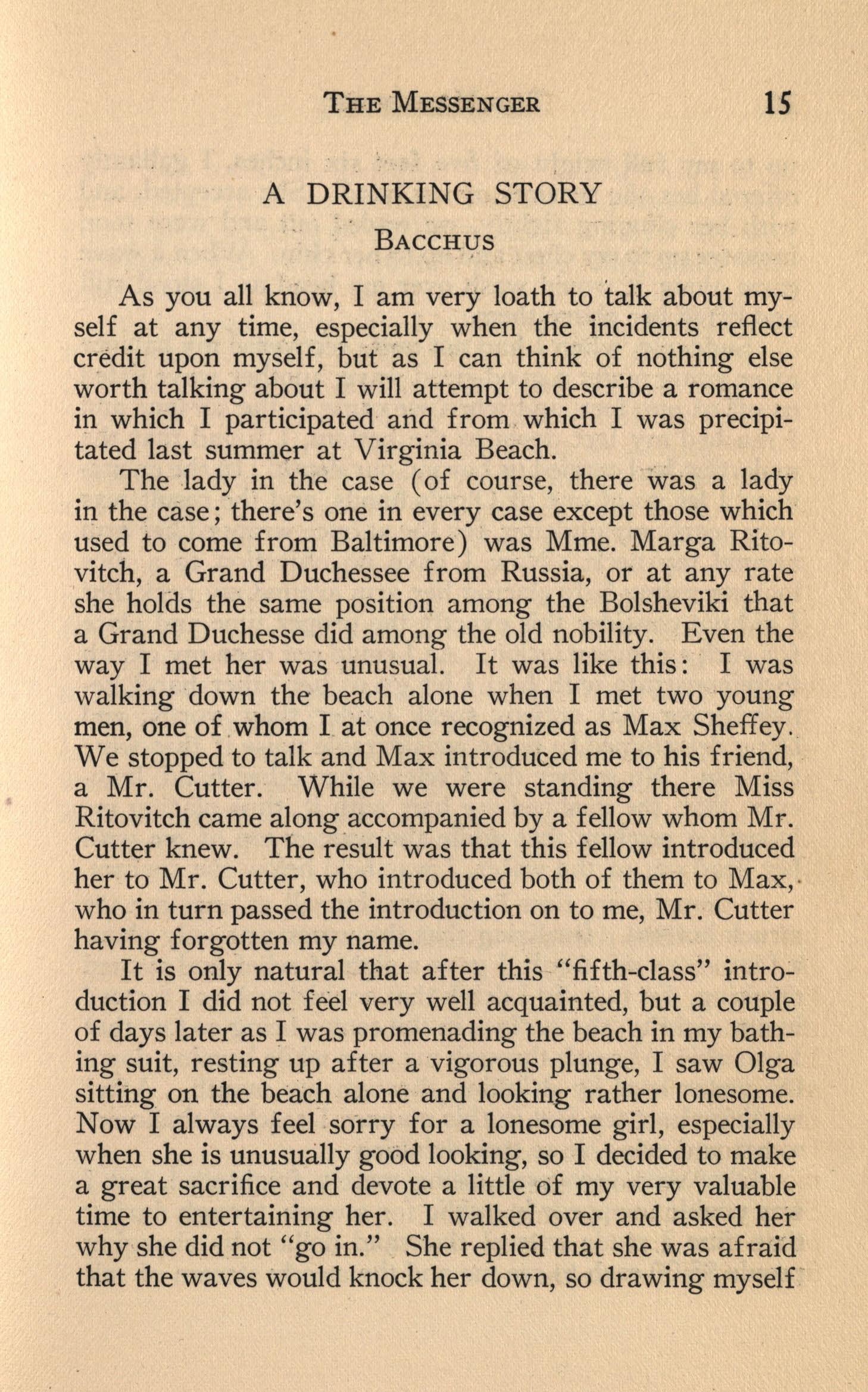
As you all kriow, I am very loath to talk about myself at any time, especially when the incidents reflect credit upon myself, btit as I can think of nothing else worth talking about I will attempt to describe a romance in which I participated and from . which I was precipitated last summer at Virginia Beach.
The lady in the case ( of course, there was a lady in the case; there's one in every case except those which used to come from Baltimore) was Mme. Marga Ritovitch, a Grand Duchessee from Russia, or at any rate she holds the same position among the Bolsheviki that a Grand Duchesse did among the old nobility. Even the way I met her was unusual. It was like this : I was walking ·down the beach alone when I met two young men, one of .whom I at once recognized as Max Sheffey. We stopped to talk and Max introduced me to his friend, a Mr. Cutter. While we were standing there Miss Ritovitch came along accompanied by a fellow whom Mr. Cutter knew. The result was that this fellow introduced her to Mr. Cutter, who introduced both of them to Max ,. who in turn passed the introduction on to me, Mr. Cutter having forgotten my name.
It is only natural that after this "fifth-class" introduction I did not feel very well acquainted, but a couple of days later as I was promenading the beach in my bathing suit, resting up after a vigorous plunge, I saw Olga sitting on the beach alone and looking rather lonesome. Now I always feel sorry for a lonesome girl, especially when she is unusually good looking, so I decided to make a great sacrifice and devote a little of my very valuable time to entertaining her. I walked over and asked her why she did not "go in." She replied that she was afraid that the waves would knock her down, so drawing myself
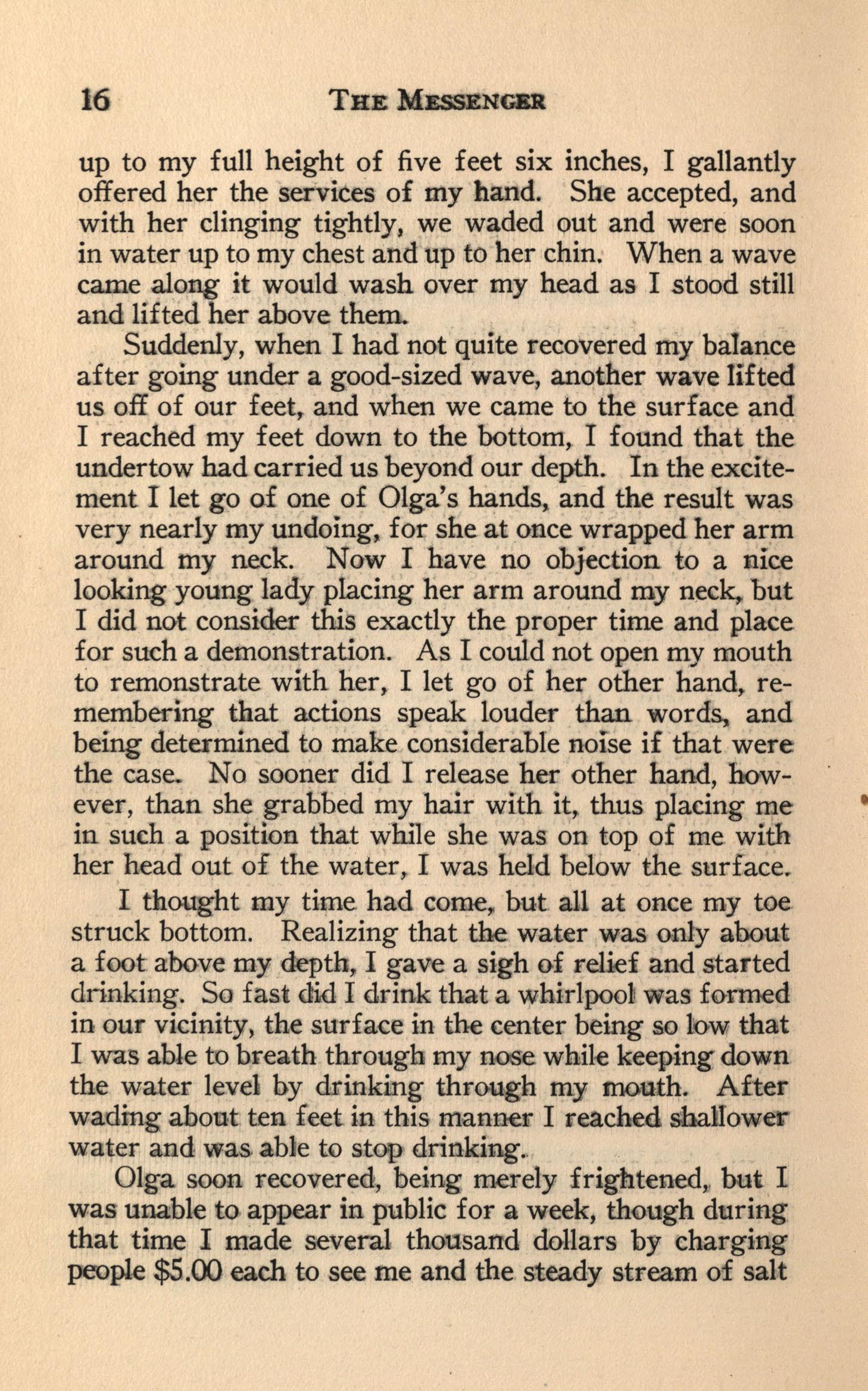
up to my full height of five feet six inches, I gallantly offered her the services of my hand. She accepted, and with her clinging tightly, we waded <;>utand were soon in water up to my chest and qp to her chin. When a wave came along it would wash over my head as I stood still and lifted her above them. Suddenly, when I had not quite recovered niy balance after going under a good-sized wave, another wave lifted us off of our feet~ and when we came to the surface and I reached my feet down to the bottom, I found that the undertow had carried us beyond our depth. In the excitement I let go of one of Olga's hands, and the result was very nearly my undoing, for she at once wrapped her arm around tny neck. Now I have no objection to a nice looking young lady pl.acing her arm around my neck,. but I did not consider this exactly the proper time and place for such a demonstration. As I could not open my mouth to remonstrate with her, I let go of her other hand, remembering that actions s,peak louder than words,, and being determined to make considerable n01se if that were the case.. Na sooner did I release her other hand, however, than she grabbed my hair with it, thus placing me in such a position that while she was on top of me with her head out of the water, I was held below the surface. I thought my time had come , but all at once my toe struck bottom. Realizing that the water was only about a foot above my depth , I gave a sigh of relief and started drinking. So fast did I drink that a whirl poohwas fortned in our vicinity, the surface in the center being so low that I was able to breath through my nose while keeping down the water level hy drinking through my mouth. After wading al>oliltten feet in this manner I reached shallower water and was able to stop drinking .
Olga soon reco~ered, being merely frightened, , but I was unable to appear in public for a week, th{)ugh during that time I made several thousand dollars by charging people $S.OOeach to see me and the steady stream of salt
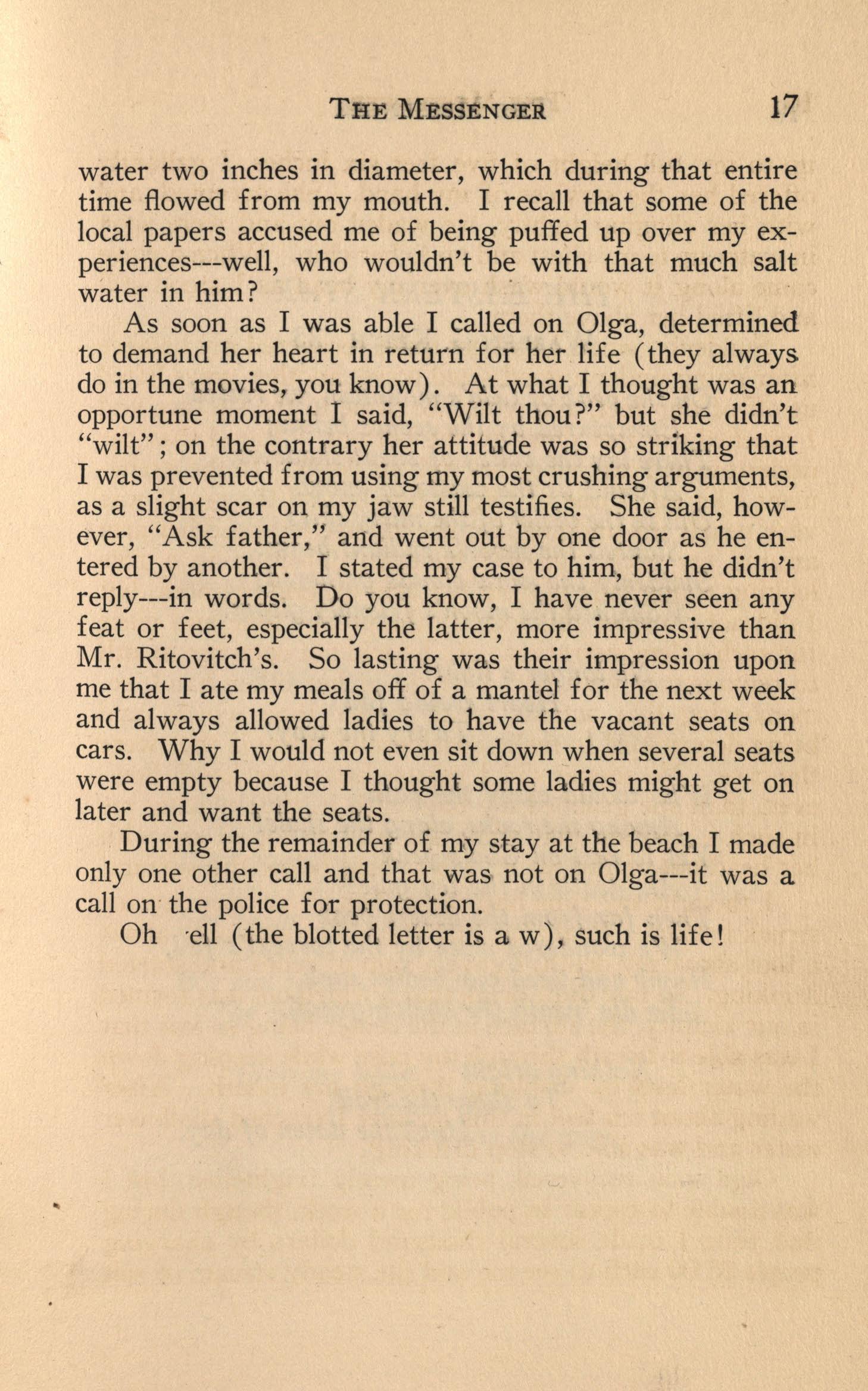
water two inches in diameter, which during that entire time flowed from my mouth. I recall that some of the local papers accused me of being puffed up over my experiences---well, who wouldn't be with that much salt water in him? ·
As soon as I was able I called on Olga, determined to demand her heart in return for her life ( they always do in the movies, you know). At what I thought was an opportune moment I said, "Wilt thou?" but she didn't "wilt"; on the contrary her attitude was so striking that I was prevented from using my most crushing arguments, as a slight scar on my jaw still testifies. She said, however, "Ask father," and went out by one door as he entered by another. I stated my case to him, but he didn't reply---in words. Do you know, I have never seen any feat or feet, especially the latter, more impressive than Mr. Ritovitch's.
So lasting was their impression upon me that I ate my meals off of a mantel for the next week and always allowed ladies to have the vacant seats on cars. Why I would not even sit down when several seats were empty because I thought some ladies might get on later and want the seats.
During the remainder of my stay at the beach I made only one other call and that was not on Olga---it was a call on- the police for protection.
Oh ·ell ( the blotted letter is a w), such is life!
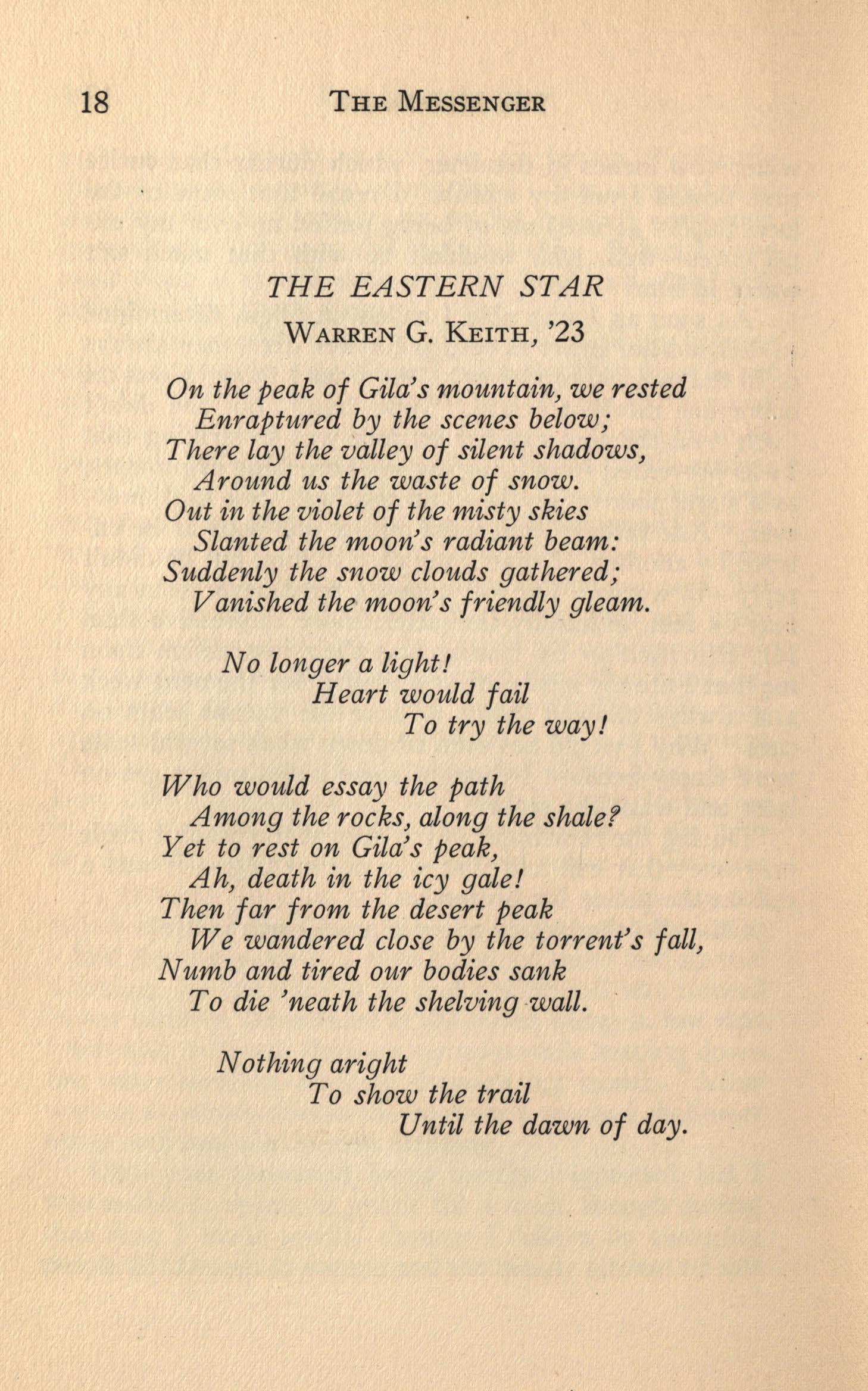
WARREN G. KEITH, '23
On the peak of Gila's mountain, we rested Enraptured by the scenes below; There lay the valley of silent shadows, Around us the waste of snow. Out in the violet of the misty skies
Slanted the moon's radiant beam: Suddenly the snow clouds gathered; Vanished the moon's friendly gleam.
No longer a light I Heart would fail To try the way!
Who would essay the path
Among the rocks, along the shale? Yet to rest on Gila's peak, Ah, death in the icy gale I Then far from the desert peak
We wandered close by the torrent's fall, Numb and tired our bodies sank To die 'neath the shelving wall.
Nothing aright
To show the trail
Until the dawn of day.
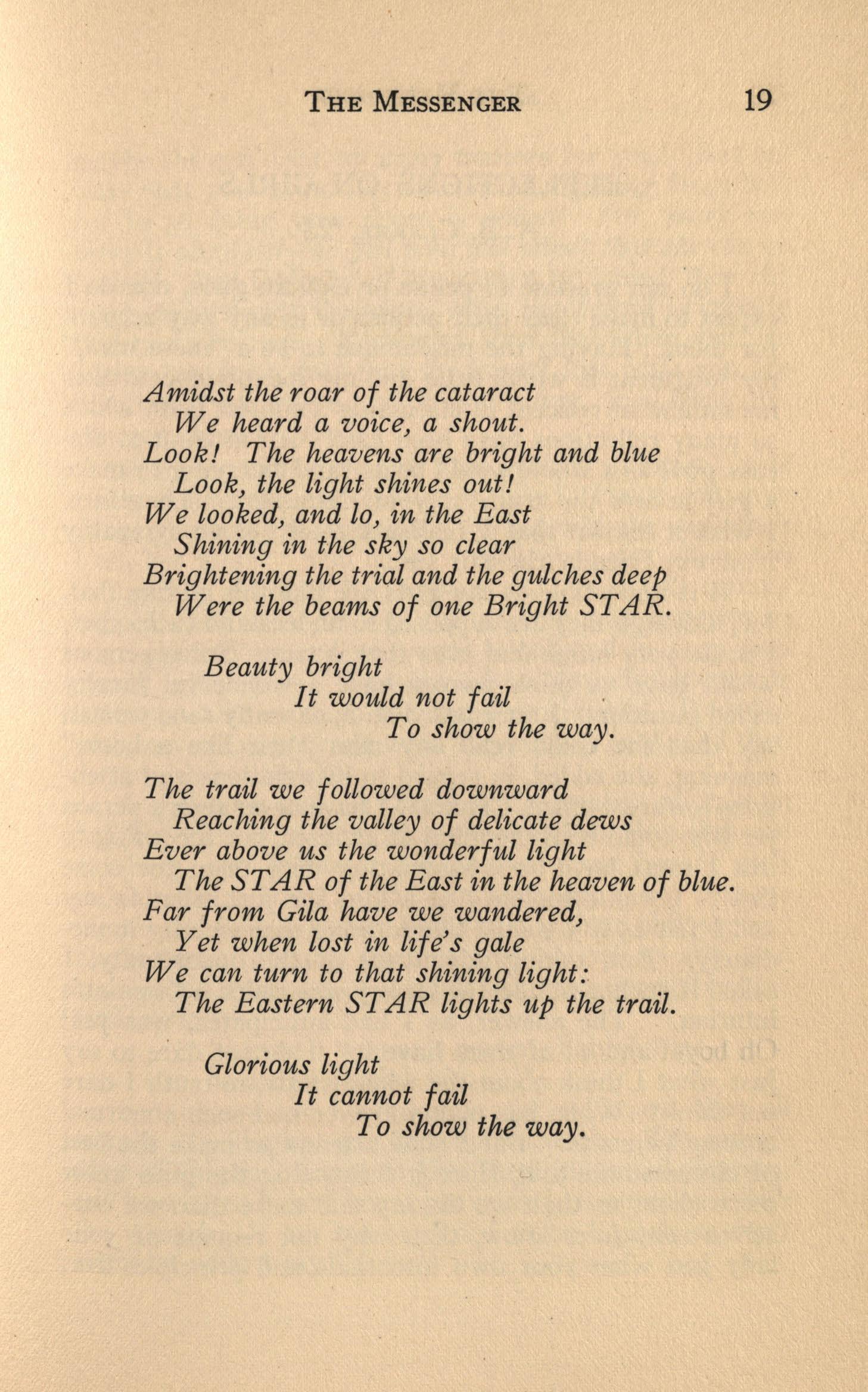
Amidst the roar of the cataract
We heard a voice, a shout. Look! The heavens are bright and blue Look, the light shines out! We looked, and lo, in the East Shining in the sky so clear
Brightening the trial and the gulches deep Were the beams of one Bright ST AR.
Beauty bright It would not fail To show the way.
The trail we followed downward
Reaching the valley of delicate dews
Ever above us the wonderful light
The STAR of the East in the heaven of blue. Far from Gila have we wandered, Yet when lost in life's gale We can turn to that shining light: . The Eastern ST AR lights up the trail.
Glorious light It cannot fail To show the way.

I do not propose to define or explain girls, nor do I expect to make clear their actions or in any way account for them. Having the misfortune to be a "mere man," my judgment is worth little and my inexperience makes me somewhat reticent in discussing a subject upon which so many re:6,ec_tionshave been cast. An attempt to discuss girls as a whole would be as fatal a,s trying to make a girl believe the truth of your discussion. Therefore, I wish · it known that l realiie I shall get no sympathy from our frieu.ds, the fair sex. It is impossible to say girls are like this or like that, for, although they are supposed to understand each other, I doubt very much that even that is true. Some persons would have us think women have a wonderful faculty called intuitiop. _ I once beard an apparently sane woman say that she could read any man "just like · a book," meaning, she added, in regard to his relations and attentions toward wome.n. There! I have never seen a person yet who could read the mind of another, but a.ccording to this I must . have been. assodating with them for some time! I was completely at a loss for just what to say and I felt as if I should like to leave that vicinity immediately. But, taking adv,antage of the opportunity, I asked if ~qch a won .derful faculty was called a, "woman's intution." The answer, as I had anticipated, was yes! Oh boys! and all of them have it! I do not dare to say just what I think about the whole affair, in truth I dare not think ! Wh .~v.bas ma.o.kind ever had such abnormal accomplishments? But I shall attempt to make the best of circumstance and, since it seems that the girls know more about us than we display and more than we ourselves sometimes know, tlien why not request of your lady just what your own intentions and principles are;
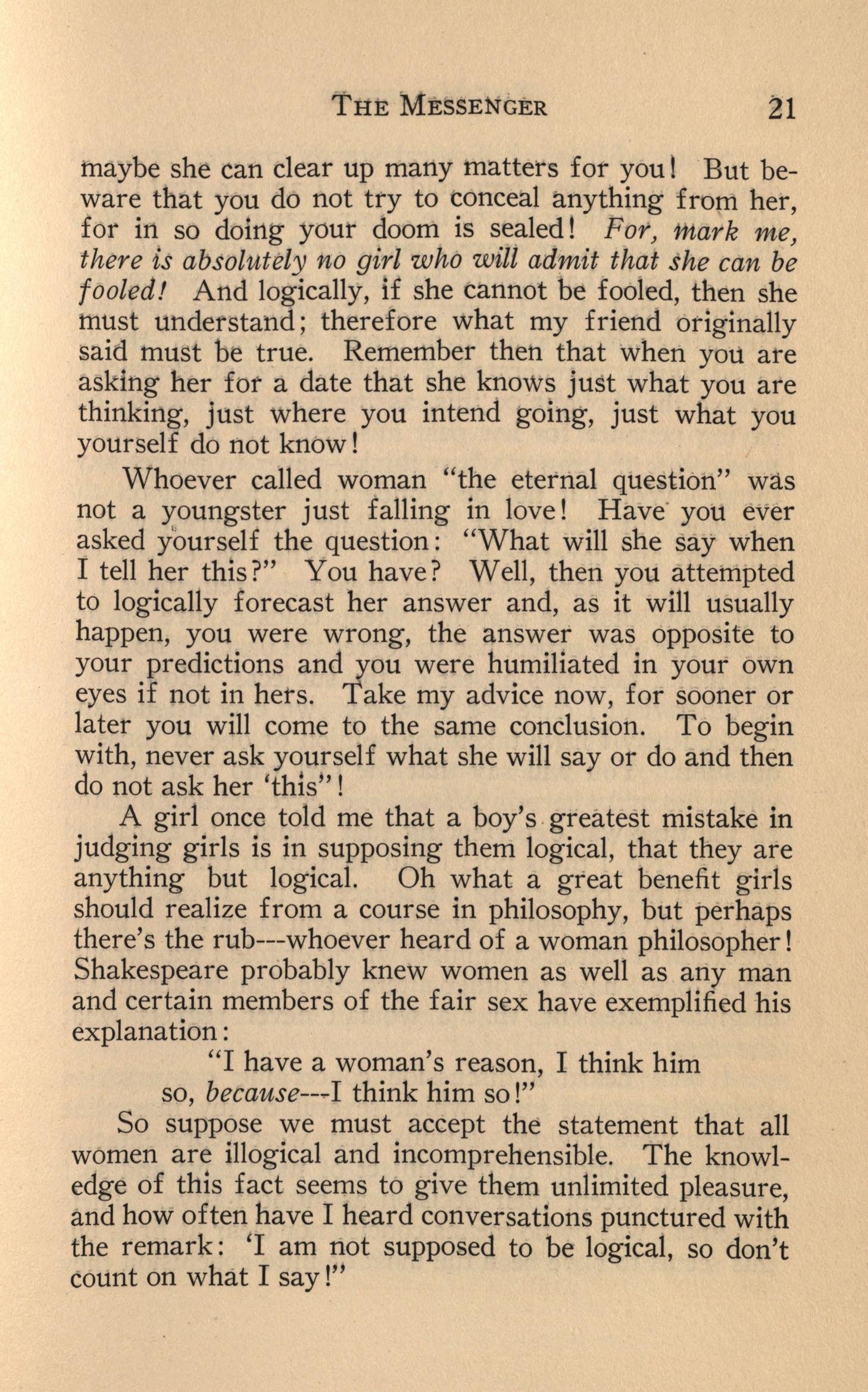
tnaybe she can clear up many matters for you l But beware that you do not tty to conceal anything from her, £or irt so doirtg yout doom is sealed! For , #tark me, there is absolutely no girl who will admit that she can be fooled! And logically, it she cannot be fooled, then she hlust understand; therefore what my friend originally said tnust be true. Remember theh that when yott are asking her for a date that she knows just what you are thinking, just where you intend going, just what you yourself do not know!
Whoever called woman "the etetn.al question" was not a youngster just falling in love! Have · you ever asked y'ourself the question: "What will she say when I tell her this?" You have? Well, then you attempted to logical1y forecast her answer and, as it will usually happen, you were wrong, the answer was opposite to your predictions and you were humiliated in your own eyes if not in hets. Take my advice now, for sooner or later you will come to the same conclusion. To begin with, never ask yourself what she will say or do and then do not ask her 'this ,' !
A girl once told me that a boy's greatest mistake in judging girls is in supposing them logical, that they are anything but logical. Oh what a great benefit gir1s should realize from a course in philosophy, but perhaps there's the rub---whoever heard of a woman philosopher! Shakespeare probably knew women as well as any man and certain members of the fair sex have exemplified his explanation :
"I have a woman's reason, I think him so, because--- ! think him so!"
So suppose we must accept the statement that all women are illogical and incomprehensible. The knowledge of this fact seems to give them unlimited pleasure, and how often have I heard conversations punctured with the remark: 'I am not supposed to be logical, so don't count on what I say!''
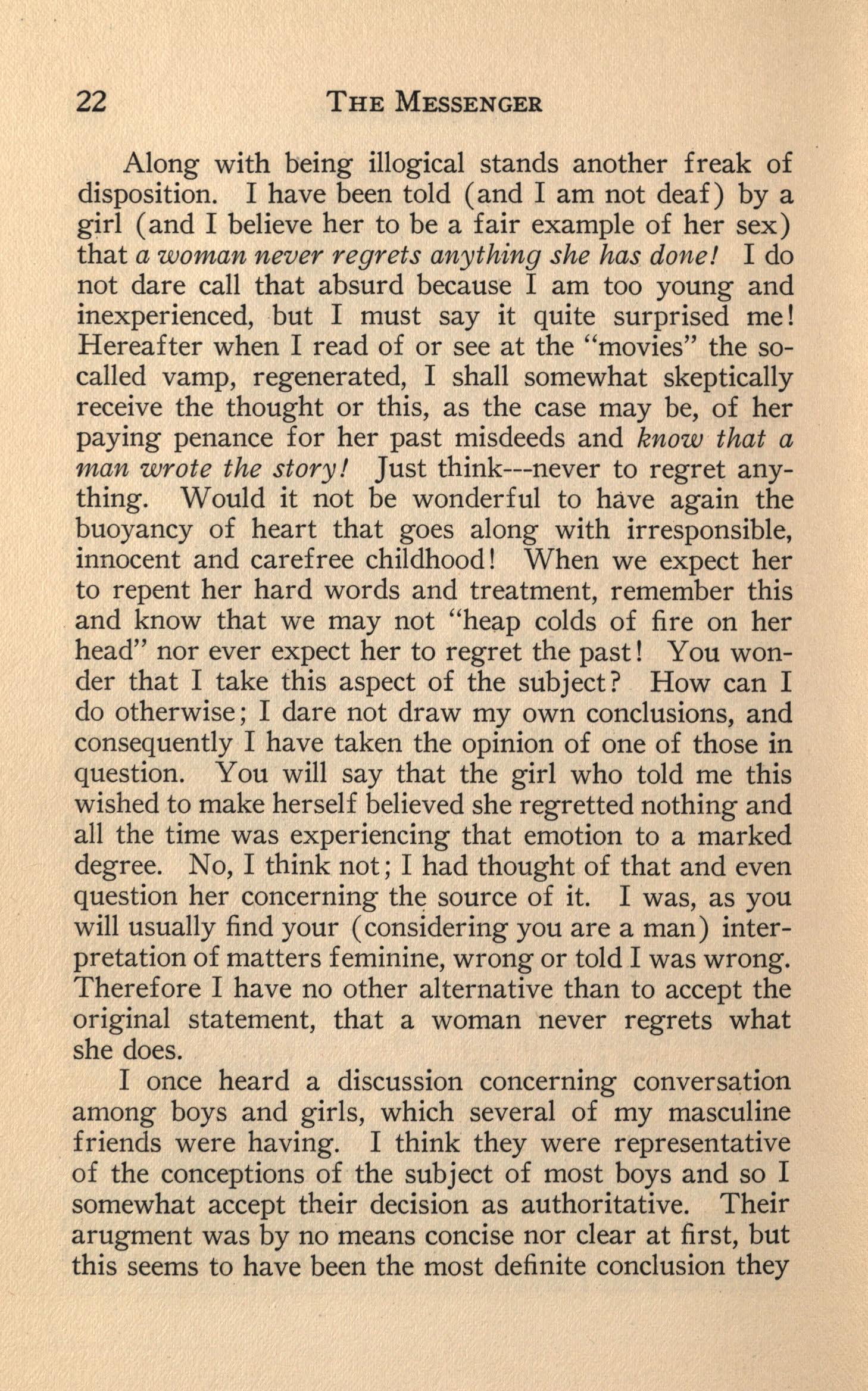
Along with being illogical stands another freak of disposition. I have been told (and I am not deaf) by a girl ( and I believe her to be a fair example of her sex) that a woman never regrets anything she has done I l do not dare call that absurd because I am too young and inexperienced, but I must say it quite surprised me! Hereafter when I read of or see at the "movies" the socalled vamp, regenerated, I shall somewhat skeptically receive the thought or this, as the case may be, of her paying penance for her past misdeeds and know that a man wrote the story I Just think---never to regret anything. Would it not be wonderful to have again the buoyancy of heart that goes along with irresponsible, innocent and carefree childhood! When we expect her to repent her hard words and treatment, remember this . and know th.at we may not "heap colds of fire on her head" nor ever expect her to regret the past! You wonder that I take this aspect of the subject? How can I do otherwise; I dare not draw my own conclusions, and consequently I have taken the opinion of one of those in question. You will say that the girl who told me this wished to make herself believed she regretted nothing and all the time was experiencing that emotion to a marked degree. No, I think not; I had thought of that and even question her concerning the source of it. I was, as you will usually find your ( considering you are a man) interpretation of .matters feminine, wrong or told I was wrong. Therefore I have no other alternative than to accept the original statement, that a woman never regrets what she does.
I once heard a discussion concerning conversation among boys and girls, which several of my masculine friends were having. I think they were representative of the conceptions of the subject of most boys and so I somewhat accept their decision as authoritative. Their arugment was by no means concise nor clear at first, but this seems to have been the most definite conclusion they
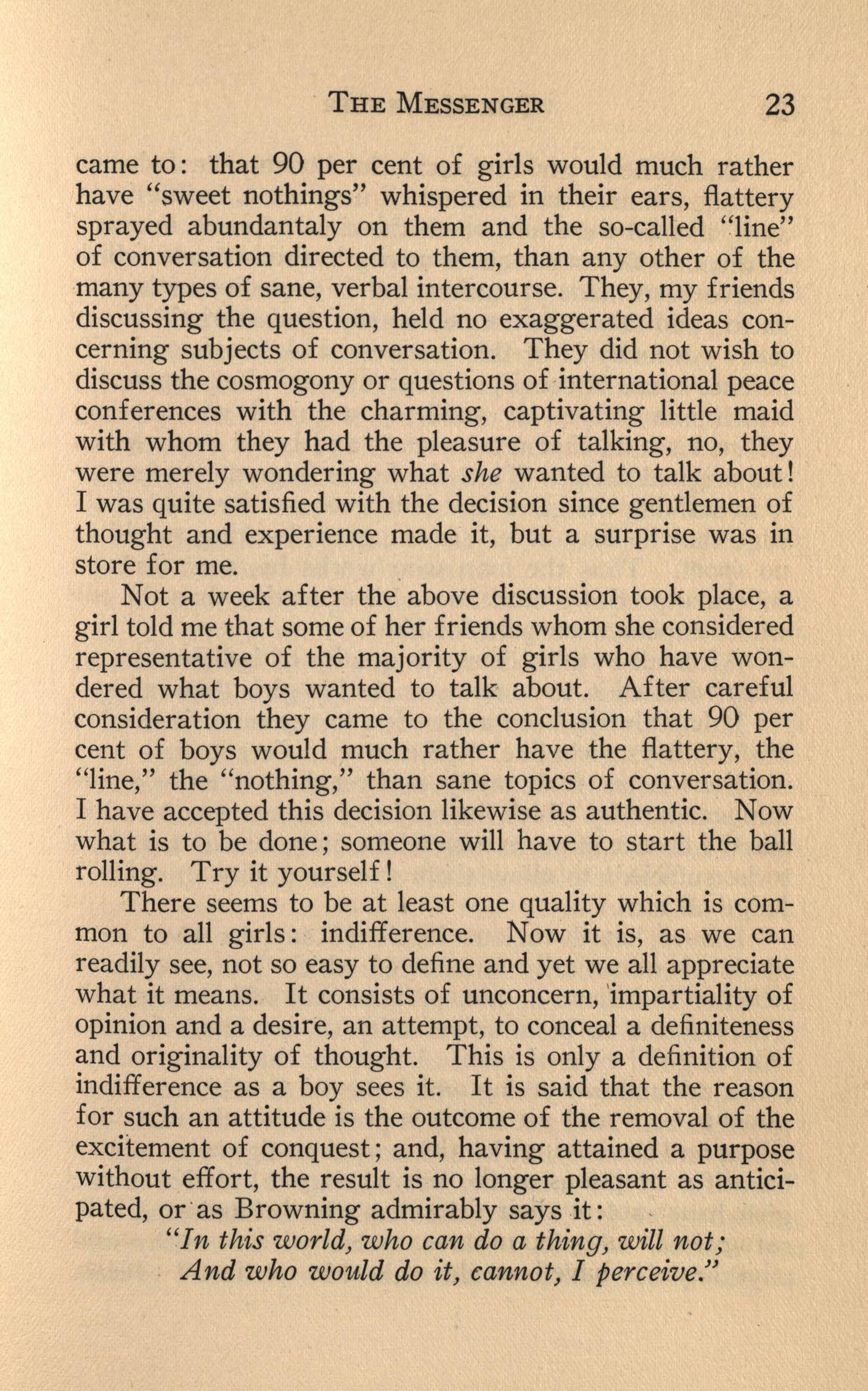
came to: that 90 per cent of girls would much rather have "sweet nothings" whispered in their ears, flattery sprayed abundantaly on them and the so-called "line" of conversation directed to them, than any other of the many types of sane, verbal intercourse. They, my friends discussing the question, held no exaggerated ideas concerning subjects of conversation. They did not wish to discuss the cosmogony or questions of international peace conferences with the charming, captivating little maid with whom they had the pleasure of talking, no, they were merely wondering what she wanted to talk about! I was quite satisfied with the decision since gentlemen of thought and experience made it, but a surprise was in store for me.
Not a week after the above discussion took place, a girl told me that some of her friends whom she considered representative of the majority of girls who have wondered what boys wanted to talk about. After careful consideration they came to the conclusion that 90 per cent of boys would much rather have the flattery, the "line," the "nothing," than sane topics of conversation. I have accepted this decision likewise as authentic. Now what is to be done; someone will have to start the ball rolling. Try it yourself!
There seems to be at least one quality which is common to all girls: indifference. Now it is, as we can readily see, not so easy to define and yet we all appreciate what it means. It consists of unconcern, 'impartiality of opinion and a desire, an attempt, to conceal a definiteness and originality of thought. This is only a definition of indifference as a boy sees it. It is said that the reason for such an attitude is the outcome of the removal of the excitement of conquest; and, having attained a purpose without effort, the result is no longer pleasant as anticipated, or as Browning admirably says it:
"In this world, who can do a thing, will not; And who would do it, cannot, I perceive."

Thus when a girl finds attention lavishly expended on her, she assumes that manner of unconcern, indifference, as if all men were not worth the time taken in thinking of them. I do not say she is wrong in this attitude, which I have been made to understand is a quality of human nature and therefore not necessarily characteristic of one sex. An analysis of this manner of aloofness or indifference seems to consist of this: any definite purpose for which one strives, if suddenly acquired without any effort, loses its charm completely and is not regarded as the original desire. Thus the hunter's ·greatest pleasure is in stalking the game and if it were not for the knowledge that he may never see the game hunting would be no sport. Thus the man who works his way through college appreciates much more his education than the one whose expenses are paid for him. After all I still believe this quality of indifference, as I have defined it, to be more marked in girls than in boys. It has always been a question in my mind just what kind of boys girls like. Of course, different girls have different tastes, fortunately, and yet there must be a certain standard by which the majority of them ( and understand I do not mean women whose judgment is supposed to be sufficient to allow them greater ability in choice) judge all men.
I have heard various ideals (I suppose they were ideals) bombastically announced which I do not know whether to believe or not, perhaps you will understand. There seems to be a universality of weakness for the "Greek god" type of man. I suppose that means handsome, tall and everything which the old Greeks were supposed to be. And yet which is preferable: Socrates' intellect and slovenly, awkward, corpulent figure or a body beautiful in the extreme, but lacking in mind? Some girls have said: "I want the man who is handsome, tall, soft-voiced, athletic, a slave to his wife, wealthy and anything else which would make him perfect." Ideals
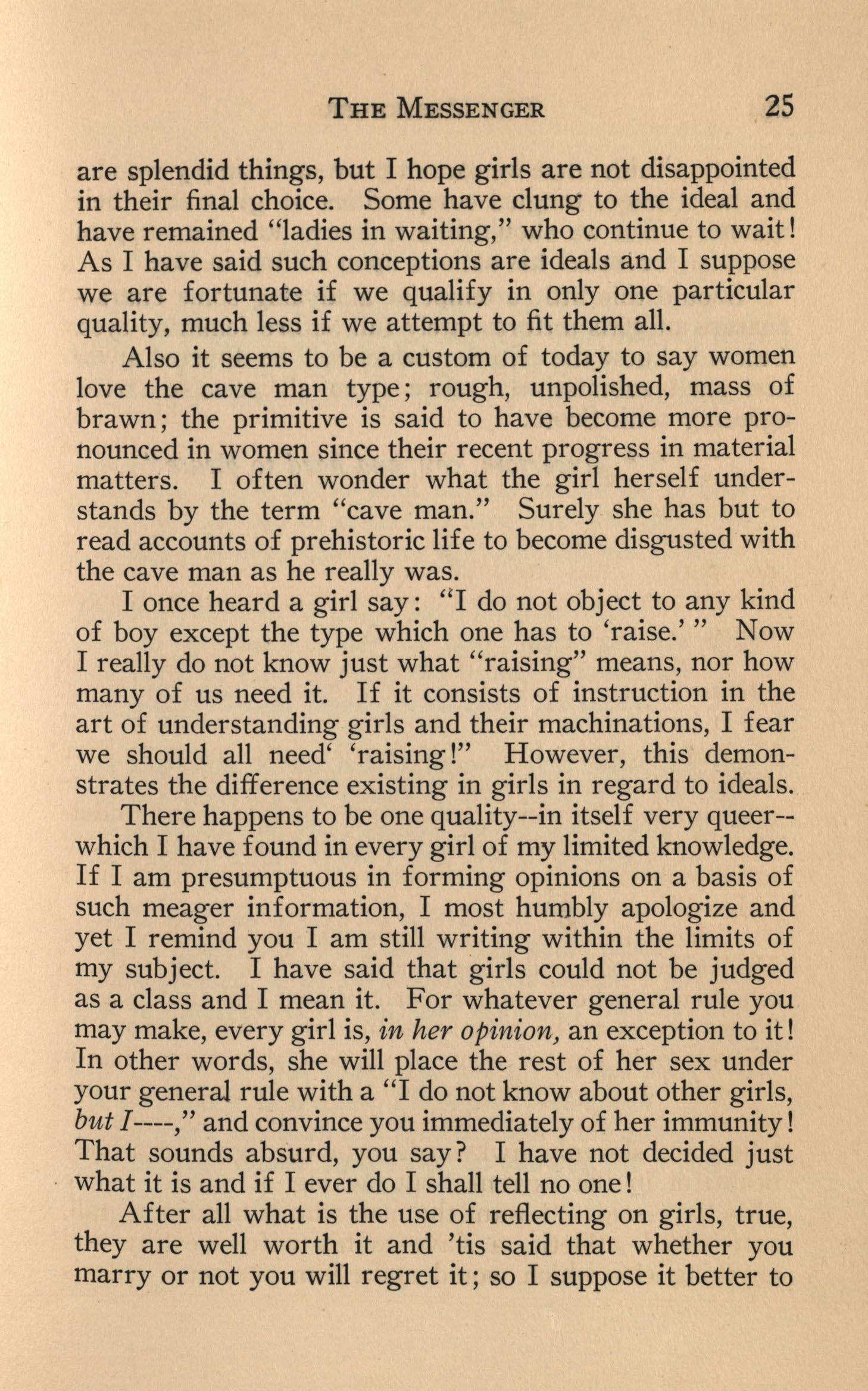
are splendid things, but I hope girls are not disappointed in their final choice. Some have clung to the ideal and have remained "ladies in waiting," who continue to wait! As I have said such conceptions are ideals and I suppose we are fortunate if we qualify in only one particular quality, much less if we attempt to fit them all. Also it seems to be a custom of today to say women love the cave man type; rough, unpolished, mass of brawn; the primitive is said to have become more pronounced in women since their recent progress in material matters. I often wonder what the girl herself understands by the term "cave man." Surely she has but to read accounts of prehistoric life to become disgusted with the cave man as he really was.
I once heard a girl say: al do not object to any kind of boy except the type which one has to 'raise.'" Now I really do not know just what "raising" means, nor how many of us need it. If it consists of instruction in the art of understanding girls and their machinations, I fear we should all need' 'raising!" However, this demonstrates the difference existing in girls in regard to ideals. There happens to be one quality--in itself very queer-which I have found in every girl of my limited knowledge. If I am presumptuous in forming opinions on a basis of such meager information, I most humbly apologize and yet I remind you I am still writing within the limits of my subject. I have said that girls could not be judged as a class and I mean it. For whatever general rule you may make, every girl is, in her opinion, an exception to it! In other words, she will place the rest of her sex under your general rule with a "I do not know about other girls, but!----," and convince you immediately of her immunity! That sounds absurd, you say? I have not decided just what it is and if I ever do I shall tell no one!
After all what is the use of reflecting on girls, true, they are well worth it and 'tis said that whether you marry or not you will regret it; so I suppose it better to
accept on faith what we cannot prove and simply wonder at the strange, tangled complexities of girls and their manner. But' we should like to know how the accepted scientist reconciles his actions upon falling in love?
Should this little attempt at a11alyzing some characteristics of girls unfortunately fall before feminine eyes, I already know the criticism which will be directed at me and shall submissively retire from all possible strife, ·agreeing with Scott:
" * * *

Uncertain , coy, and hard to please."
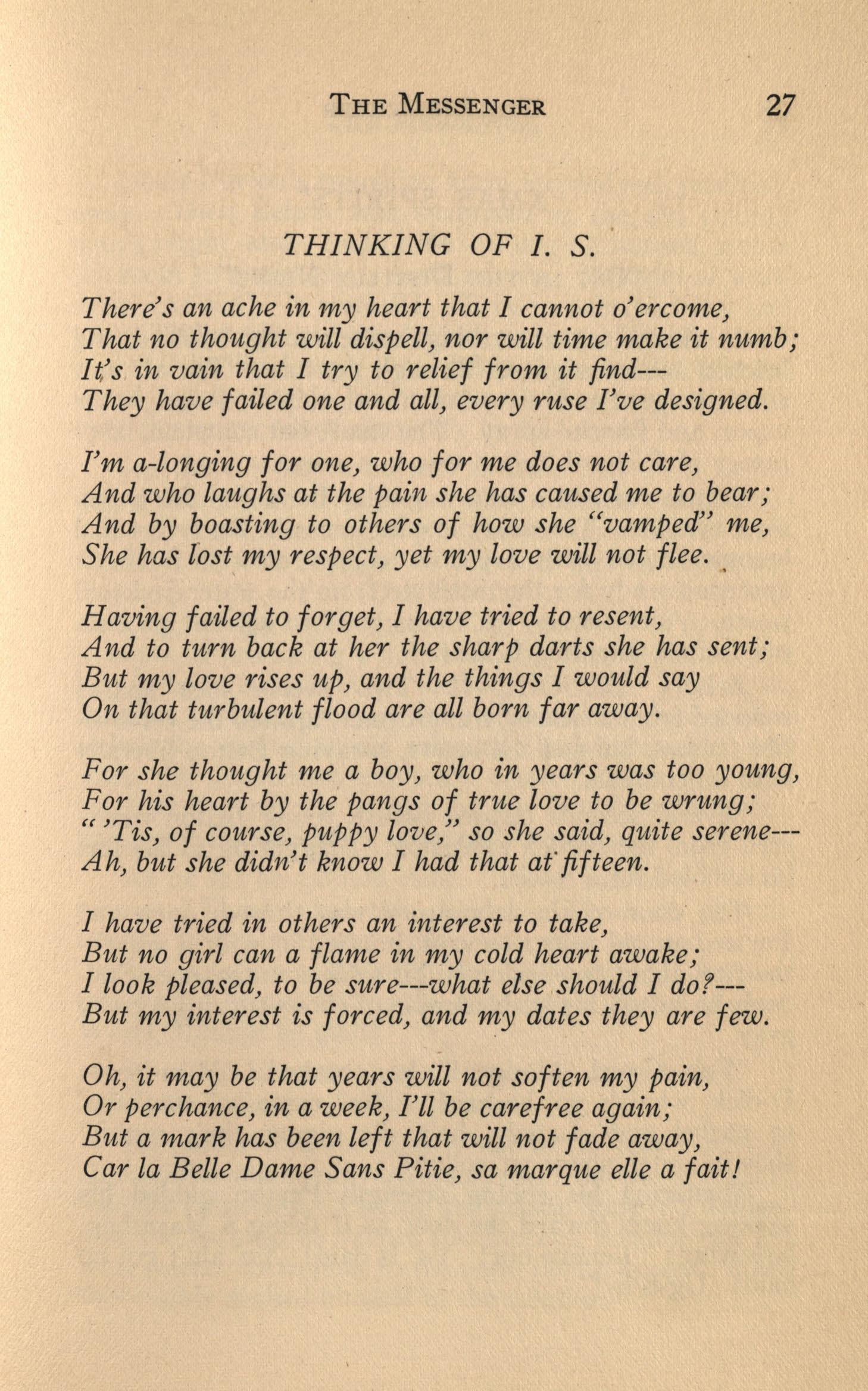
There's an ache in my heart that I cannot o'ercome, That no thought will dispell, nor will time make it numb; It's in vain that I try to relief from it find--They have failed one and all, every ruse I've designed.
I'm a-longing for one, who for me does not care, And who laughs at the pain she has caused me to bear; And by boasting to others of how she "vamped" me, She has lost my respect, yet my love will not flee . .
Having failed to forget, I have tried to resent, And to turn back at her the sharp darts she has sent; But my love rises up, and the things I would say On that turbulent flood are all born far away.
For she thought me a boy, who in years was too young, For his heart by the pangs of true love to be wrung; "'Tis, of course, puppy love," so she said, quite serene--Ah, but she didn't know I had that af ji,fteen.
I have tried in others an interest to take, But no girl can a flame in my cold heart awake; I look pleased, to be sure---what else should I do't--But my interest is forced, and my dates they are few.
Oh, it may be that years will not soften my pain, Or perchance, in a week, I'll be carefree again; But a mark has been left that will not fade away, Car la Belle Dame Sans Pitie, sa marque elle a fait!
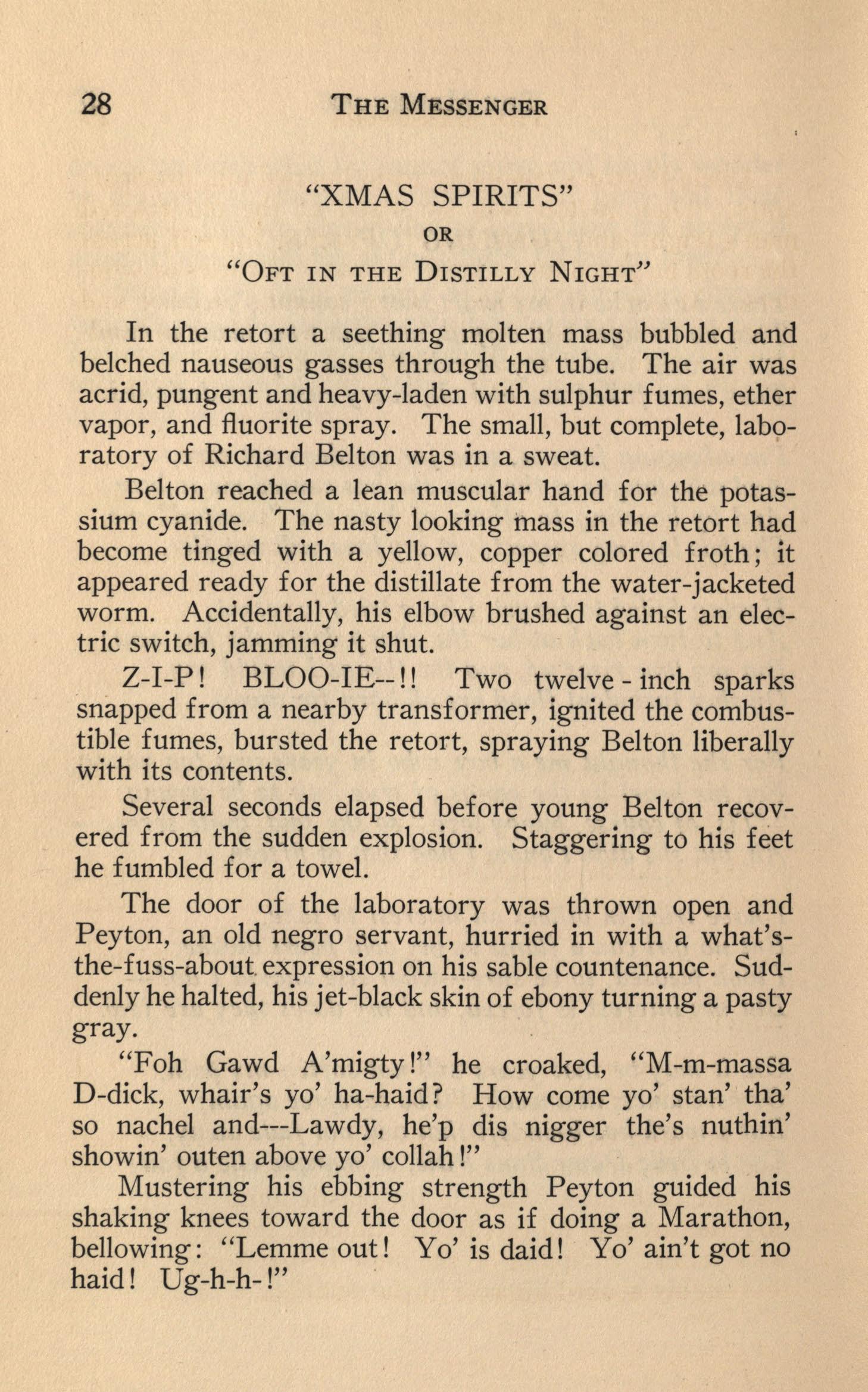
In the retort a seething molten mass bubbled and belched nauseous gasses through the tube. The air was acrid , pungent and heavy-laden with sulphur fumes, ether vapor, and fluorite spray. The small, but complete, laboratory of Richard Belton was in a sweat.
Belton reached a lean muscular hand for the potassium cyanide. The nasty looking mass in the retort had become tinged with a yellow, copper colored froth; it appeared ready for the distillate from the water-jacketed worm. Accidentally, his elbow brushed against an electric switch, jamming it shut.
Z-I-P ! BLOO-IE--! ! Two twelve - inch sparks snapped from a nearby transformer, ignited the combustible fumes, bursted the retort, spraying Belton liberally with its contents.
Several seconds elapsed before young Belton recovered from the sudden explosion. Staggering to his feet he fumbled for a towel.
The door of the laboratory was thrown open and Peyton, an old negro servant, hurried in with a what'sthe-fuss-about. expression on his sable countenance. Suddenly he halted, his jet-black skin of ebony turning a pasty gray.
"Foh Gawd A'migty !" he croaked, "M-m-massa D-dick, whair's yo' ha-haid? How come yo' stan' tha' so nachel and---Lawdy, he'p dis nigger the's nuthin' showin' outen above yo' collah !"
Mustering his ebbing strength Peyton guided his shaking knees toward the door as if doing a Marathon, bellowing: "Lemme out! Yo' is <laid! Yo' ain't got no haid ! Ug-h-h-!"
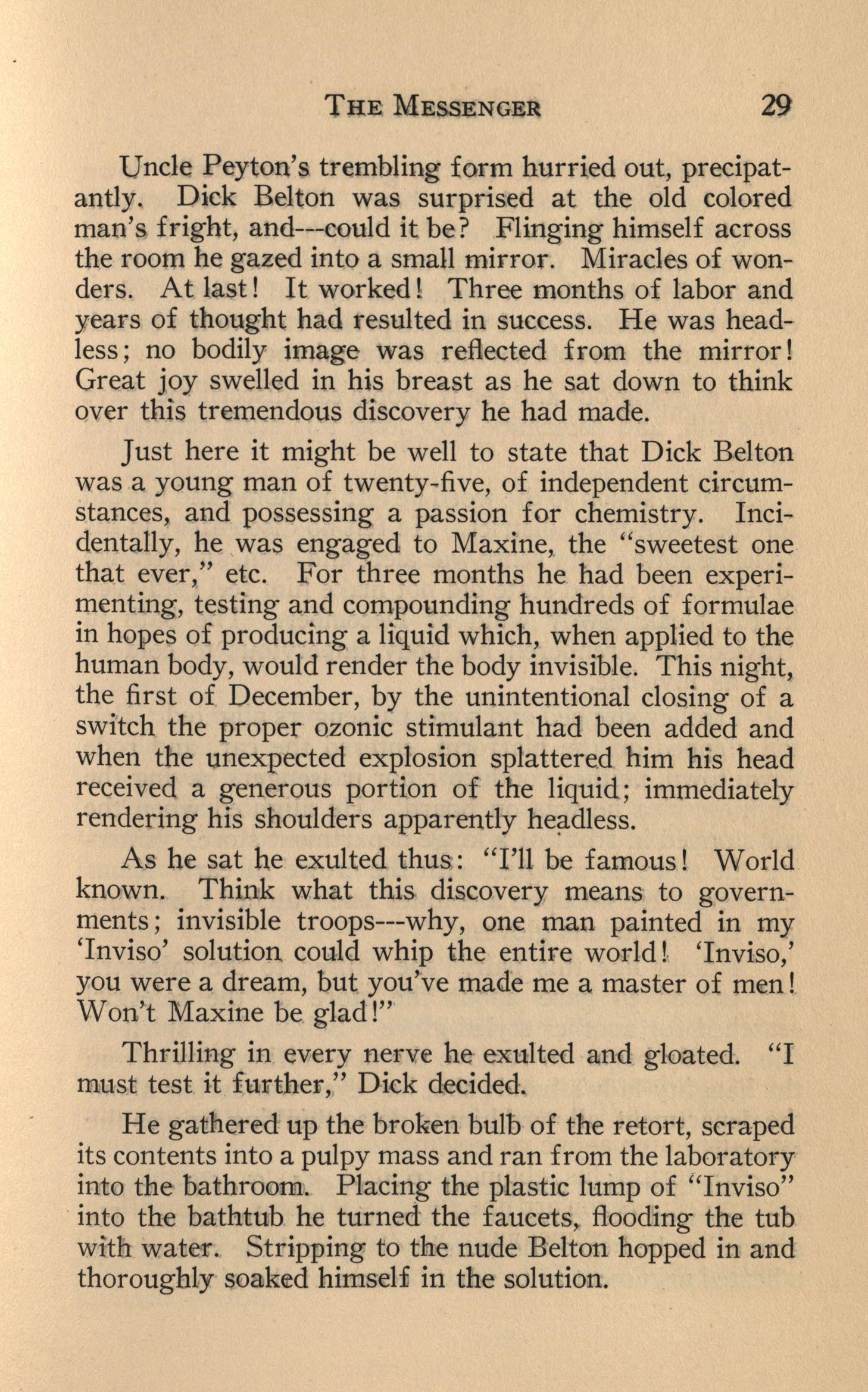
Uncle Peyton's trembling form hurded out, precipatantly. Dick Belton was surprised at the old colored man's fright, and---could it be? Flinging himself across the room he gazed into a small mirror. Miracles of wonders. At last! It worked l Three months of labor and :years of thought had resulted in success. He was headless; no bodily image was reflected from the mirror! Great joy swelled in his breast as he sat down to think over this tremendous discovery he had made.
Just here it might be well to state that Dick Belton was a young man of twenty-five, of independent circumstances, and possessing a passion for chemistry. Incidentally, he was engaged to Maxine, the "sweetest one that ever," etc. For three months he had been experimenting, testing and compounding hundreds of formulae in hopes of producing a liquid which, when applied to the human body, would render the body invisible. This night, the first of December, by the unintentional closing of a switch the proper ozonic stimulant had been added and when the unexpected explosion splattered him his head received a generous portion of the liquid; immediately rendering his shoulders apparently he?-dless.
As he sat he exulted thus: "I'll be famous! World known. Think what this discovery means to governments; invisible troops---why, one man painted in my 'Inviso' solution could whip the entire world! . 'Inviso,' you were a dream, but you've made me a master of men! Won't Maxine be glad!"
Thrilling in every nerve he exulted and gloated. "I must test it fulither," Dick decided.
He gathered up the broken bulb of the retort, scraped its contents into a pulpy mass and ran from the laboratory into the bathroom. Placing the plastic lump of ''Inviso" into the bathtub he turned. the faucets,. flooding the tub with water. Stripping to the nude Belton hopped in and thoroughly soaked himsel:£ in the solution.
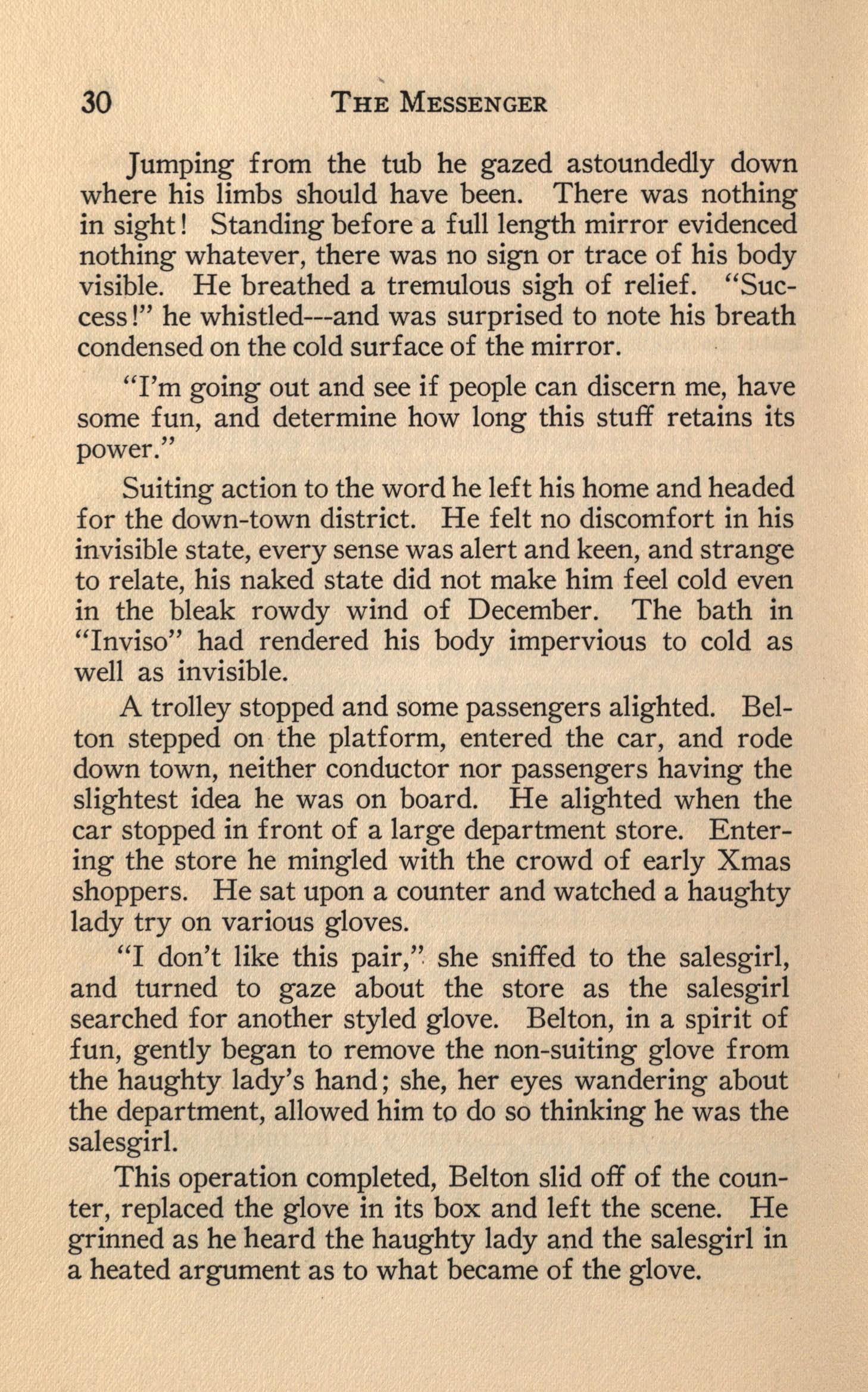
Jumping from the tub he gazed astoundedly down where his limbs should have been. There was nothing in sight! Standing before a full length mirror evidenced nothing whatever, there was no sign or trace of his body visible. He breathed a tremulous sigh of relief. "Success!" he whistled---and was surprised to note his breath condensed on the cold surface of the mirror.
"I'm going out and see if people can discern me, have some fun, and determine how long this stuff retains its power."
Suiting action to the word he le£t his home and headed for the down-town district. He felt no discomfort in his invisible state, every sense was alert and keen, and strange to relate, his naked state did not make him feel cold even in the bleak rowdy wind of December. The bath in "Inviso" had rendered his body impervious to cold as well as invisible.
A trolley stopped and some passengers alighted. Belton stepped on the platform, entered the car, and rode down town, neither conductor nor passengers having the slightest idea he was on board. He alighted when the car stopped in front of a large department store. Entering the store he mingled with the crowd of early Xmas shoppers. He sat upon a counter and watched a haughty lady try on various gloves.
"I don't like this pair,'~ she sniffed to the salesgirl, and turned to gaze about the store as the salesgirl searched for another styled glove. Belton, in a spirit of fun, gently began to remove the non-suiting glove from the haughty lady's hand; she, her eyes wandering about the department, allowed him to do so thinking he was the salesgirl.
This operation completed, Belton slid off of the counter, replaced the glove in its box and left the scene. He grinned as he heard the haughty lady and the salesgirl in a heated argument as to what became of the glove.
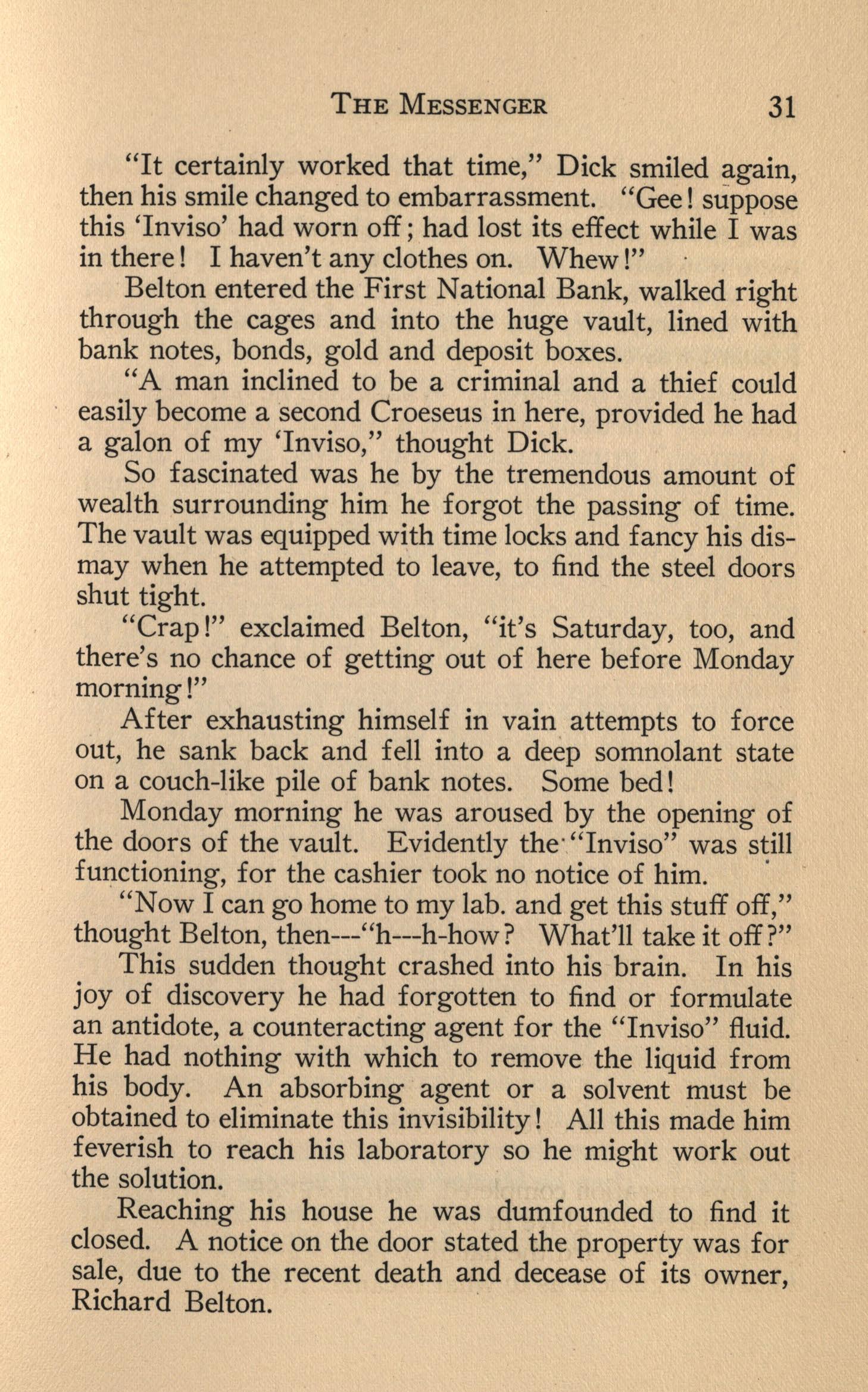
"It certainly worked that time," Dick smiled again, then his smile changed to embarrassment. "Gee! stipp9se this 'Inviso' had worn off; had lost its effect while I was in there! I haven't any clothes on. Whew!"
Belton entered the First National Bank, walked right through the cages and into the huge vault, lined with bank notes, bonds, gold and deposit boxes.
"A man inclined to be a criminal and a thief could easily become a second Croeseus in here, provided he had a galon of my 'Inviso," thought Dick.
So fascinated was he by the tremendous amount of wealth surrounding him he forgot the passing of time. The vault was equipped with time locks and fancy his dismay when he attempted to leave, to find the steel doors shut tight.
"Crap!" exclaimed Belton, "it's Saturday, too, and there's no chance of getting out of here before Monday morning!"
After exhausting himself in vain attempts to force out, he sank back and fell into a deep somnolant state on a couch-like pile of bank notes. Some bed!
Monday morning he was aroused by the opening of the doors of the vault. Evidently the ·"Inviso" was still functioning, for the cashier took no notice of him. ·
"Now I can go home to my lab. and get this stuff off," thought Belton, then---"h---h-how? What'II take it off?"
This sudden thought crashed into his brain. In his joy of discovery he had forgotten to find or formulate an antidote, a counteracting agent for the "Inviso" fluid. He had nothing with which to remove the liquid from his body. An absorbing agent or a solvent must be obtained to eliminate this invisibility! All this made him feverish to reach his laboratory so he might work out the solution.
Reaching his house he was dumfounded to find it closed. A notice on the door stated the property was for sale, due to the recent death and decease of its owner, Richard Belton.
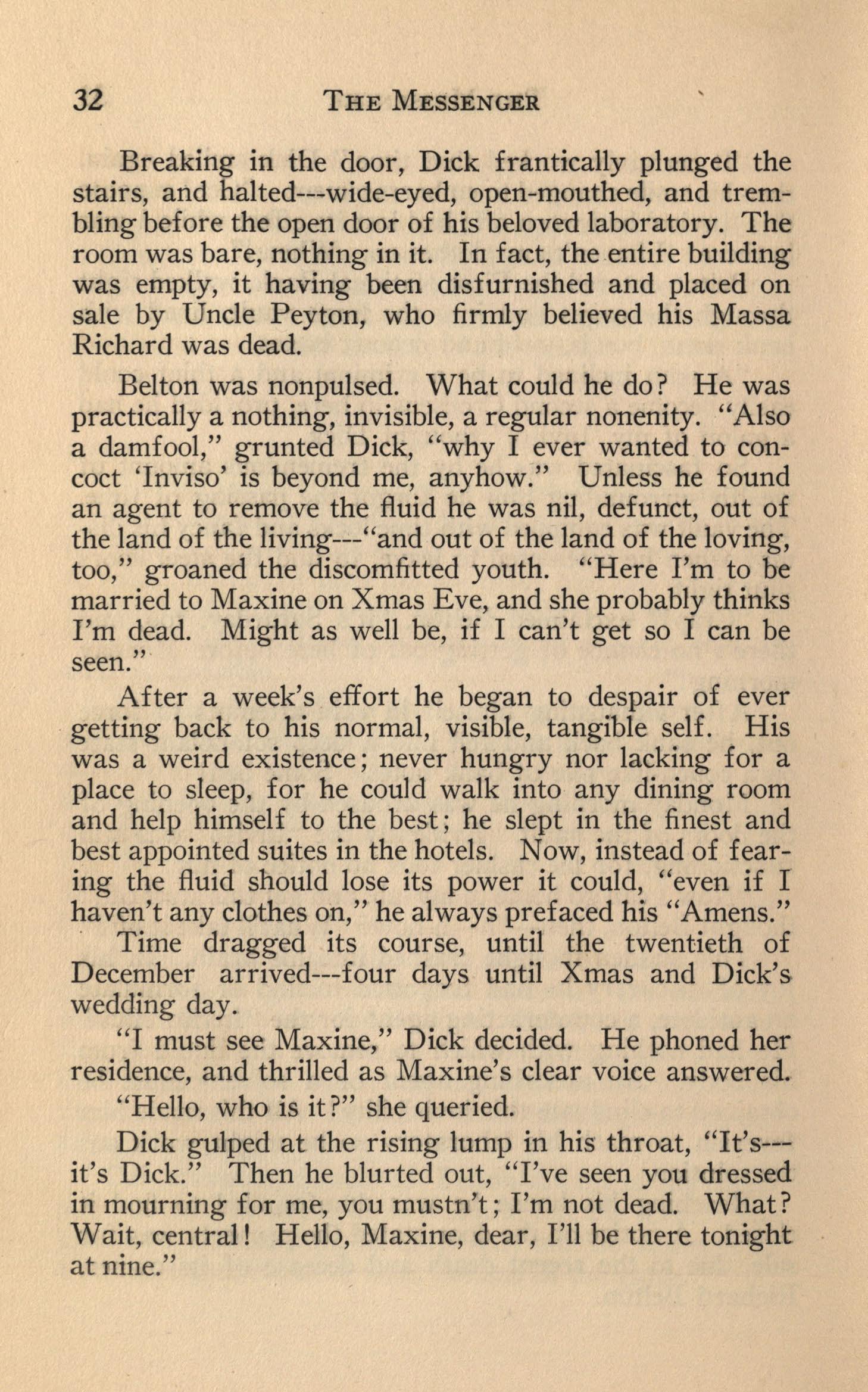
Breaking in the door, Dick frantically plunged the stairs, and halted---wide-eyed, open-mouthed, and trembling before the open door of his beloved laboratory. The room was bare, nothing in it. In fact, the .entire building was empty, it having been disfurnished and placed on sale by Uncle Peyton, who firmly believed his Massa Richard was dead.
Belton was nonpulsed. What could he do? He was practically a nothing, invisible, a regular nonenity. "Also a damfool," grunted Dick, "why I ever wanted to concoct 'Inviso' is beyond me, anyhow." Unless he found an agent to remove the fluid he was nil, defunct, out of the land of the living---"and out of the land of the loving, too," groaned the discomfitted youth. "Here I'm to be married to Maxine on Xmas Eve, and she probably thinks I'm dead. Might as well be, if I can't get so I can be seen."
After a week's effort he began to despair of ever getting back to his normal, visible, tangible self. His was a weird existence; never hungry nor lacking for a place to sleep, for he could walk into any dining room and help himself to the best; he slept in the finest and best appointed suites in the hotels. Now, instead of fearing the fluid should lose its power it could, "even if I haven't any clothes on," he always prefaced his "Amens."
· Time dragged its course, until the twentieth of December arrived---four days until Xmas and Dick's wedding day.
"I must see Maxine," Dick decided. He phoned her residence, and thrilled as Maxine's clear voice answered. "Hello, who is it?" she queried.
Dick gulped at the rising lump in his throat, "It's--it's Dick." Then he blurted out, "I've seen you dressed in mourning for me, you mustn't; I'm not dead. What? Wait, central! Hello, Maxine, dear, I'll be there tonight at nine."
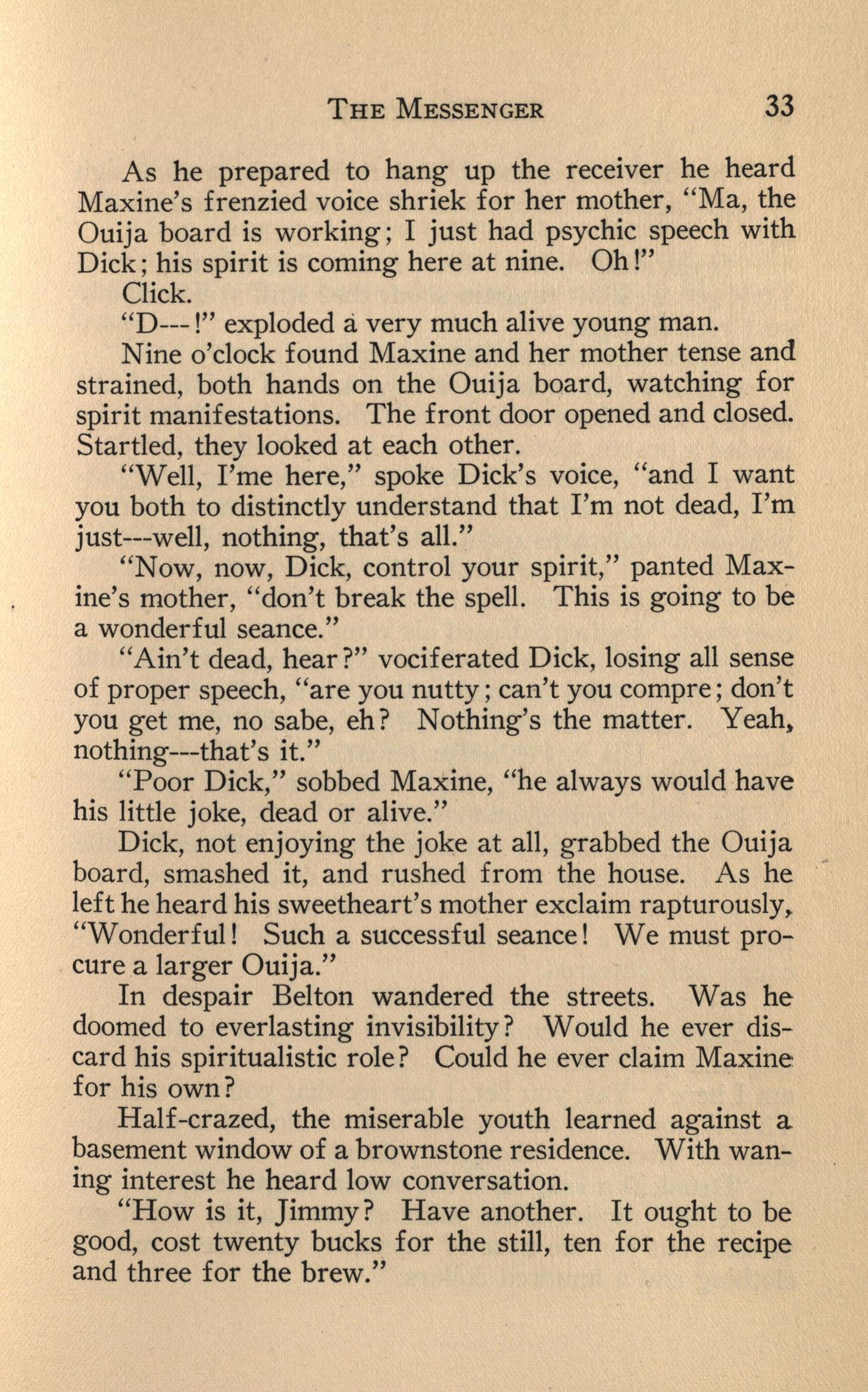
As he prepared to hang up the receiver he heard Maxine's frenzied voice shriek for her mother, "Ma, the Ouija board is working; I just had psychic speech with Dick; his spirit is coming here at nine. Oh!" Click.
"D--- !" exploded a very much alive young man. Nine o'clock found Maxine and her mother tense and strained, both hands on the Ouija board, watching for spirit manifestations. The front door opened and closed. Startled, they looked at each other.
"Well, I'me here," spoke Dick's voice, "and I want you both to distinctly understand that I'm not dead, I'm just---well, nothing, that's all."
"Now, now, Dick, control your spirit," panted Maxine's mother, "don't break the spell. This is going to be a wonderful seance."
"Ain't dead, hear?" vociferated Dick, losing all sense of proper speech, "are you nutty; can't you compre; don't you get me, no sabe, eh? Nothing's the matter. Yeah, nothing---that's it."
"Poor Dick," sobbed Maxine, "he always would have his little joke, dead or alive."
Dick, not enjoying the joke at all, grabbed the Ouija board, smashed it, and rushed from the house. As he left he heard his sweetheart's mother exclaim rapturously~ "Wonderful ! Such a successful seance! We must procure a larger Ouija."
In despair Belton wandered the streets. Was he doomed to everlasting invisibility? Would he ever discard his spiritualistic role? Could he ever claim Maxine for his own?
Half-crazed, the miserable youth learned against a basement window of a brownstone residence. With waning interest he heard low conversation.
"How is it, Jimmy? Have another. It ought to be good, cost twenty bucks for the still, ten for the recipe and three for the brew."

Then followed sounds of. a cork being replaced, a sigh of satisfaction accompanied by gentle smacking of the lips.
"Great stuff, John! You're some 'home brew' artist. Let's go; we'll hit it again soon; that stuff will certainly curl you, all right."
A door slammed and all was still.
Belt on fairly ached for a good stiff drink of the liquor. Blue , despondent, and in the murk of despair, he needed a bracer, a stimulant. Slipping to the front door of the house, he entered, and descended through the butler's pantry to the cellar, finding the customary 'brewyour- own' apparatus and a half-dozen full bottles shining ~emptingly in the darkness. He pulled a cork, and imbibed once, twice, and again. That warm, "hooray-for..: everybody" feeling suffused his veins. The reaction from his despondent mood caused him to continue to drink until he had surrounded two quarts with his invisible self.
He became drunk, sleepily, drowsily drunk, and dozed off. His last coherent remark was, "Devil take--hic---darn Inv---hic---Inviso ! · Gimme m-more rye-eee !"
He rolled , turned, and slumbered.
On the morning of the twentyfourth of December the owner o f. the house went down to the cellar to have a nip of his private stock and was amazed to stumble over the nude form of a young man, who sat up with a hie-hiccough and shivered. '
"What tha---?" exclaimed the owner.
Suddenly the recumbent figure sprang to its feet, yelling and gesticulating, "Say, can you see me? Tell me, am I here? Yes, you bet, I can see that you can see me. That liquor did it, an internal bath of alcohol is the antidote for 'Inviso !' Whoops my dear J.''
"Drunk as a fish," said the owner, disgustedly.
"Well," replied Dick, calming down a bit, "let it go at that, but for the sake of humanity lend me a suit of clothing and a hundred dollars."
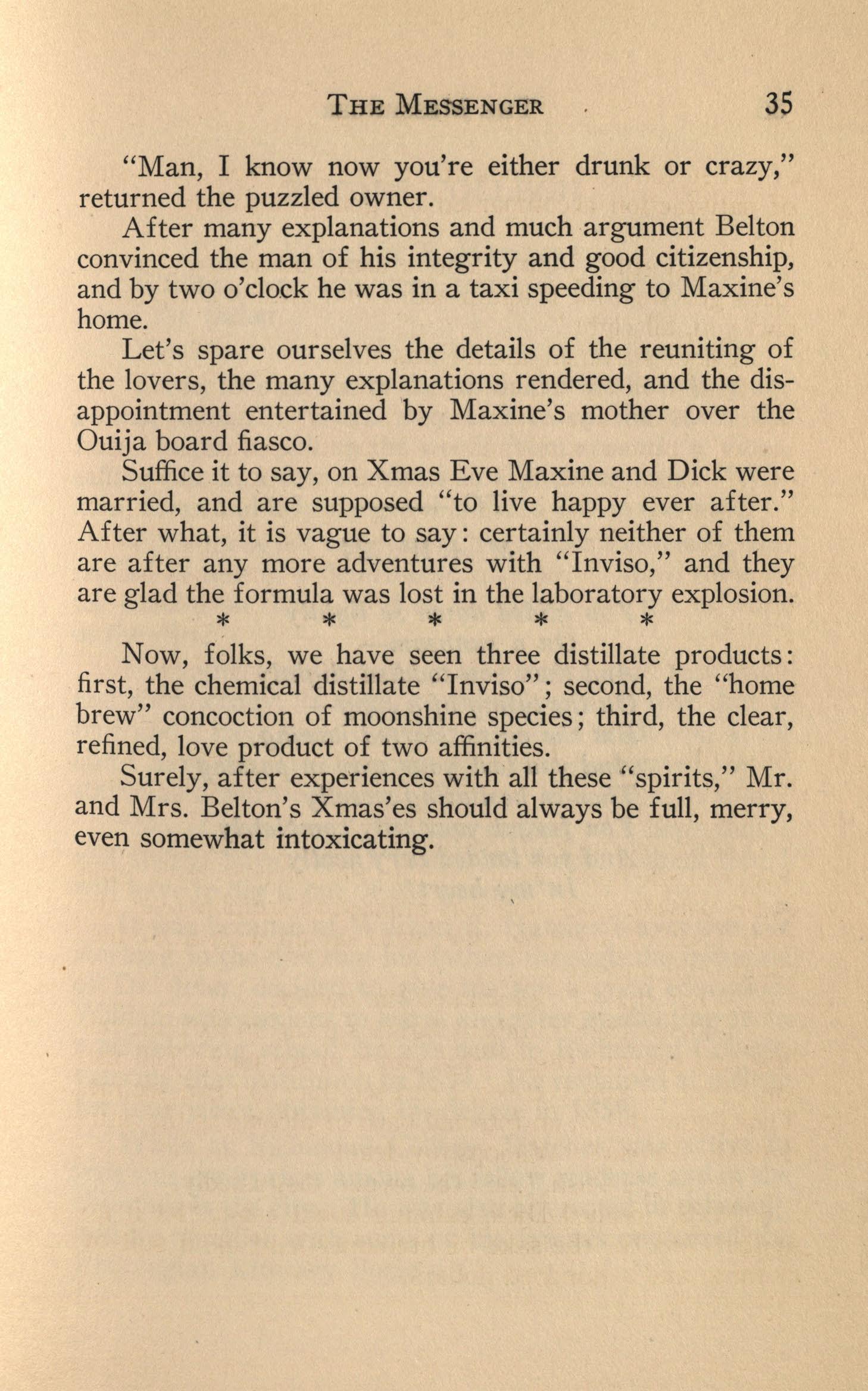
"Man, I know now you're either drunk or crazy," returned the puzzled owner.
After many explanations and much argument Belton convinced the man of his integrity and good citizenship, and by two o'clock he was in a taxi speeding to Maxine's home.
Let's spare ourselves the details of the reuniting of the lovers, the many explanations rendered, and the disappointment entertained by Maxine's mother over the Ouija board fiasco.
Suffice it to say, on Xmas Eve Maxine and Dick were married, and are supposed "to live happy ever after." After what, it is vague to say: certainly neither of them are after any more adventures with "Inviso," and they are glad the formula was lost in the laboratory explosion.
Now, folks, we have seen three distillate products: first, the chemical distillate "Inviso" ; second, the "home brew" concoction of moonshine species; third, the clear, refined, love product of two affinities.
Surely, after experiences with all these ·"spirits," Mr. and Mrs. Belton's Xmas'es should always be full, merry, even somewhat intoxicating.

You glided down so lightly On a sunbeam---
A nd then you toddled slightly On the lilting of a song--But the music started jazzing, And you fost your way in passing, Then in hesitating sweetly You forgot your way completely, And you landed very neatly In my heart!
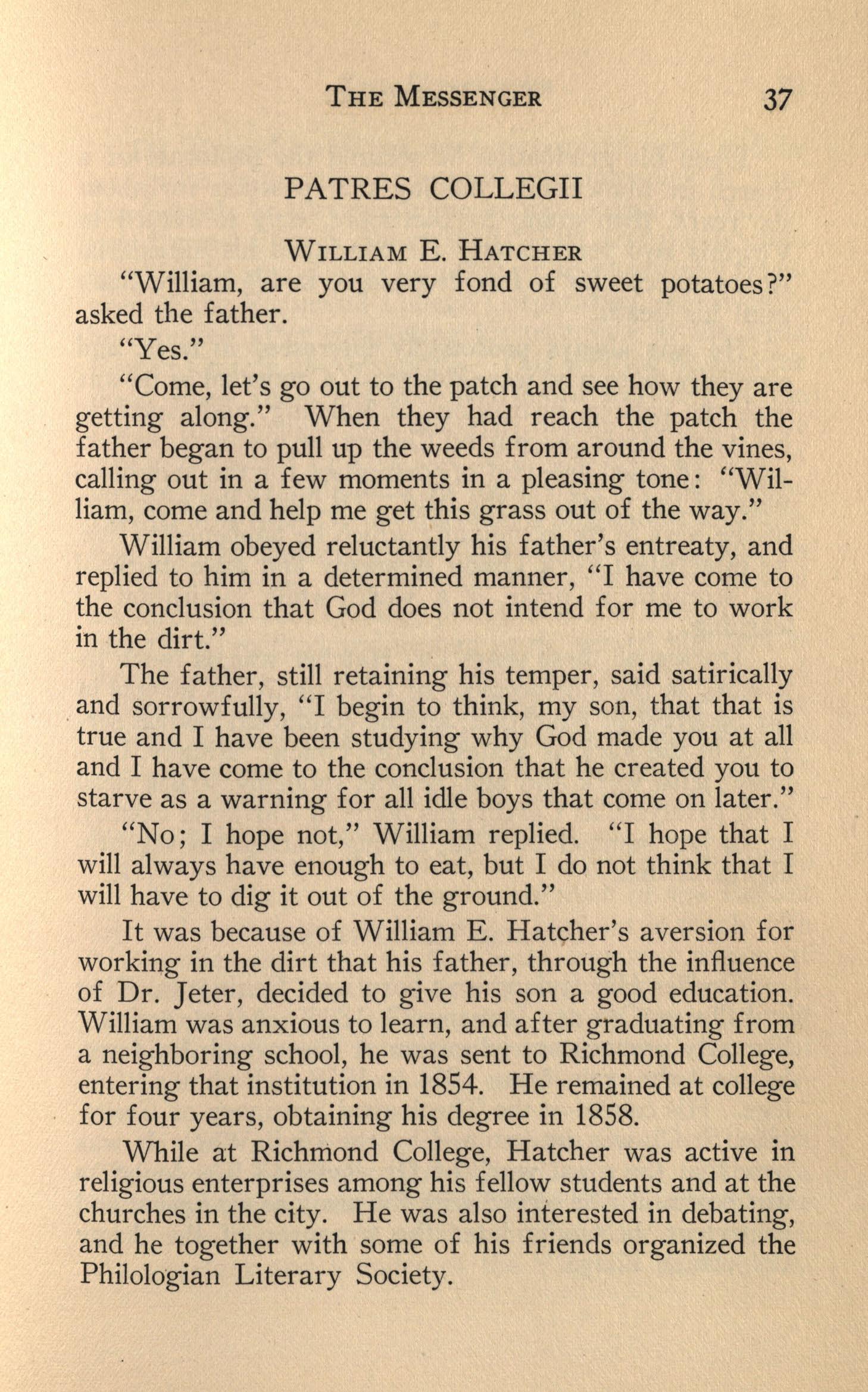
"William, are you very fond of sweet potatoes?" asked the father.
"Yes."
"Come, let's go out to the patch and see how they are getting along." When they had reach the patch the father began to pull up the weeds from around the vines, calling out in a few moments in a pleasing tone: "William, come and help me get this grass out of the way."
William obeyed reluctantly his father's entreaty, and replied to him in a determined manner, "I have come to the conclusion that God does not intend for me to work in the dirt."
The father, still retaining his temper, said satirically . and sorrowfully, "I begin to think, my son , that that is true and I have been studying why God made you at all and I have come to the conclusion that he created you to starve as a warning for all idle boys that come on later."
"No; I hope not," William replied. "I hope that I will always have enough to eat, but I do not think that I will have to dig it out of the ground."
It was because of William E. Hatcher's aversion for working in the dirt that his father, through the influence of Dr. Jeter, decided to give his son a good education. William was anxious to learn, and after graduating from a neighboring school, he was sent to Richmond College, entering that institution in 1854. He remained at college for four years, obtaining his degree in 1858.
While at Richmond College, Hatcher was active in religious enterprises among his fell ow students and at the churches in the city. He was also interested in debating, and he together with some of his friends organized the Philologian Literary Society.
Upon his graduation he secured the pastorate of a church in Manchester, holding that position for about six years, then going to Baltimore, only to return to Virginia two years later. He continued his ministerial labors, except for a few diversions, in his native State until his death.
He was always profoundly interested in boys, and especially those who were students. Connected as he was with the various institutions of learning, and especially his Alma Mater, Richmond College, he was in a position which afforded splendid opportunities for the enlightenment of the youths of the land. To foster the education of the boys in the community which he happened to live, he established Fork Union Academy and gave much of his strength to make it a worth-while institution of learning. ·
During all these years Dr. Hatcher was as much interested in the advancement of Christianity as he was in the progress of education, and he conducted revival services in the various States of the Union. Finally, burdened with work and age, he was suddenly struck dead with paralysis, at Careby, his home in Fluvanna County, i~ the late summer of 1912, having reached his seventyeighth birthday. -R. F. E.
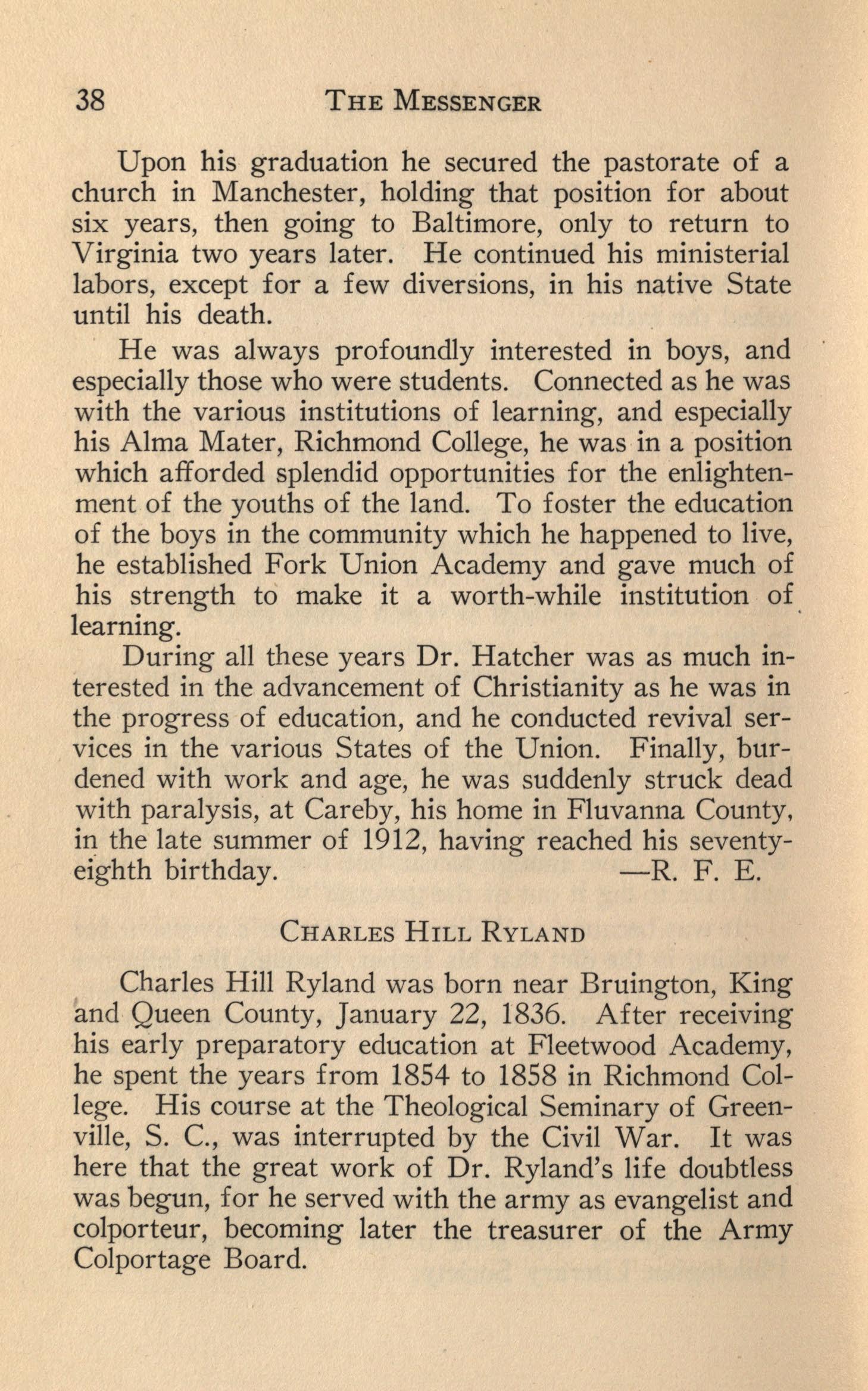
Charles Hill Ryland was born near Bruington, King and Queen County, January 22, 1836. After receiving his early preparatory education at Fleetwood Academy, he spent the years from 1854 to 1858 in Richmond College. His course at the Theological Seminary of Greenville, S. C., was interrupted by the Civil War. It was here that the great work of Dr. Ryland's life doubtless was begun, for he served with the army as evangelist and colporteur, becoming later the treasurer of the Army Colportage Board.
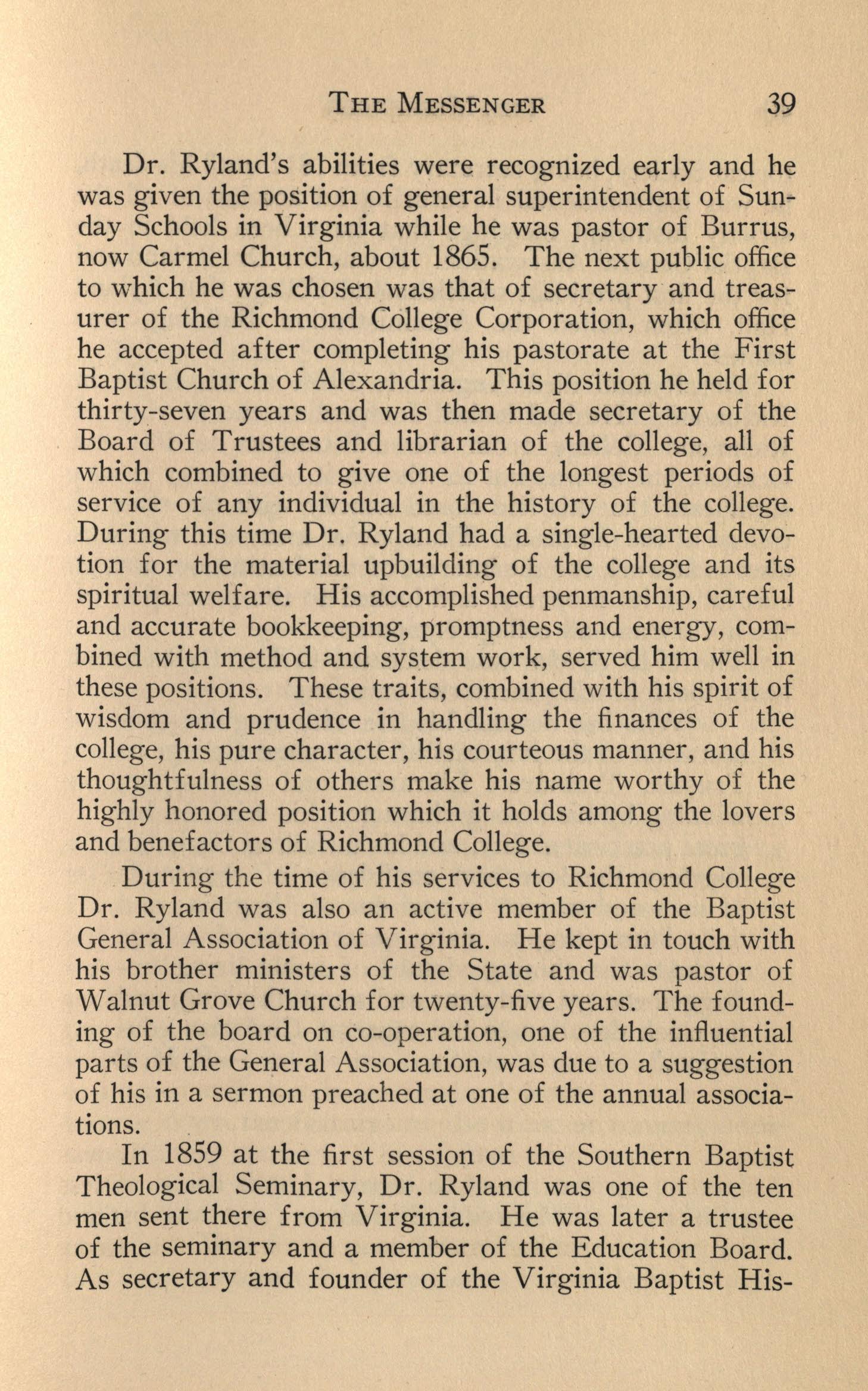
Dr. Ryland's abilities were recognized early and he was given the position of general superintendent of Sunday Schools in Virginia while he was pastor of Burrus, now Carmel Church, about 1865. The next public office to which he was chosen was that of secretary and treasurer of the Richmond College Corporation, which office he accepted after completing his pastorate at the First Baptist Church of Alexandria. This position he held for thirty-seven years and was then made secretary of the Board of Trustees and librarian of the college, all of which combined to give one of the longest periods of service of any individual in the history of the college. During this time Dr. Ryland had a single-hearted devotion for the material upbuilding of the college and its spiritual welfare. His accomplished penmanship, careful and accurate bookkeeping, promptness and energy, combined with method and system work, served him well in these positions. These traits, combined with his spirit of wisdom and prudence in handling the finances of the college, his pure character, his courteous manner, and his thoughtfulness of others make his name worthy of the highly honored position which it holds among the lovers and benefactors of Richmond College.
During the time of his services to Richmond College Dr. Ryland was also an active member of the Baptist General Association of Virginia. He kept in touch with his brother ministers of the State and was pastor of Walnut Grove Church for twenty-five years. The founding of the board on co-operation, one of the influential parts of the General Association, was due to a suggestion of his in a sermon preached at one of the annual associations.
In 1859 at the first session of the Southern Baptist Theological Seminary, Dr. Ryland was one of the ten men sent there from Virginia. He was later a trustee of the seminary and a member of the Education Board. As secretary and founder of the Virginia Baptist His-

torical Society, being secretary from 1811 until his death, he was instrnumental in securing an account of all the strictly historical meetings that have been held in the Baptist General Association. It was for Dr. Ryland and for the first president of Richmond College that Ryland Hall, often called the Administration Building, was named.
Dr. Ryland died August 1, 1914, at his home in Richmond. He had looked forward to the moving of Richmond College from the old campus to its new location, but he was not to witness it. In a way it was significant that ·his life closed exactly with the close of college at the old place. Thus passed away one who was always at work for the interest of this institution, always careful of its property, and looked to the protection of the library and all college equipment. ·
The 1913 Spider was dedicated to Dr. Ryland and bears the following memorial paragraph:
"Who has devoted his life with singular consecration to the interests of Richmond College as Trustee, Treasurer, Librarian and Counsellor; winning by his strong character, his wisdom, his great practical ability, and his unfailing Christian courtesy the love and confidence of thousands of men and women in and out of Virginia; and daily illustrating to many generations of college · students the shining virtues of noble living unflagged energy, and clear and sound thinking, and unselfish devotion to the cause of Christian education."
-P. H. D.
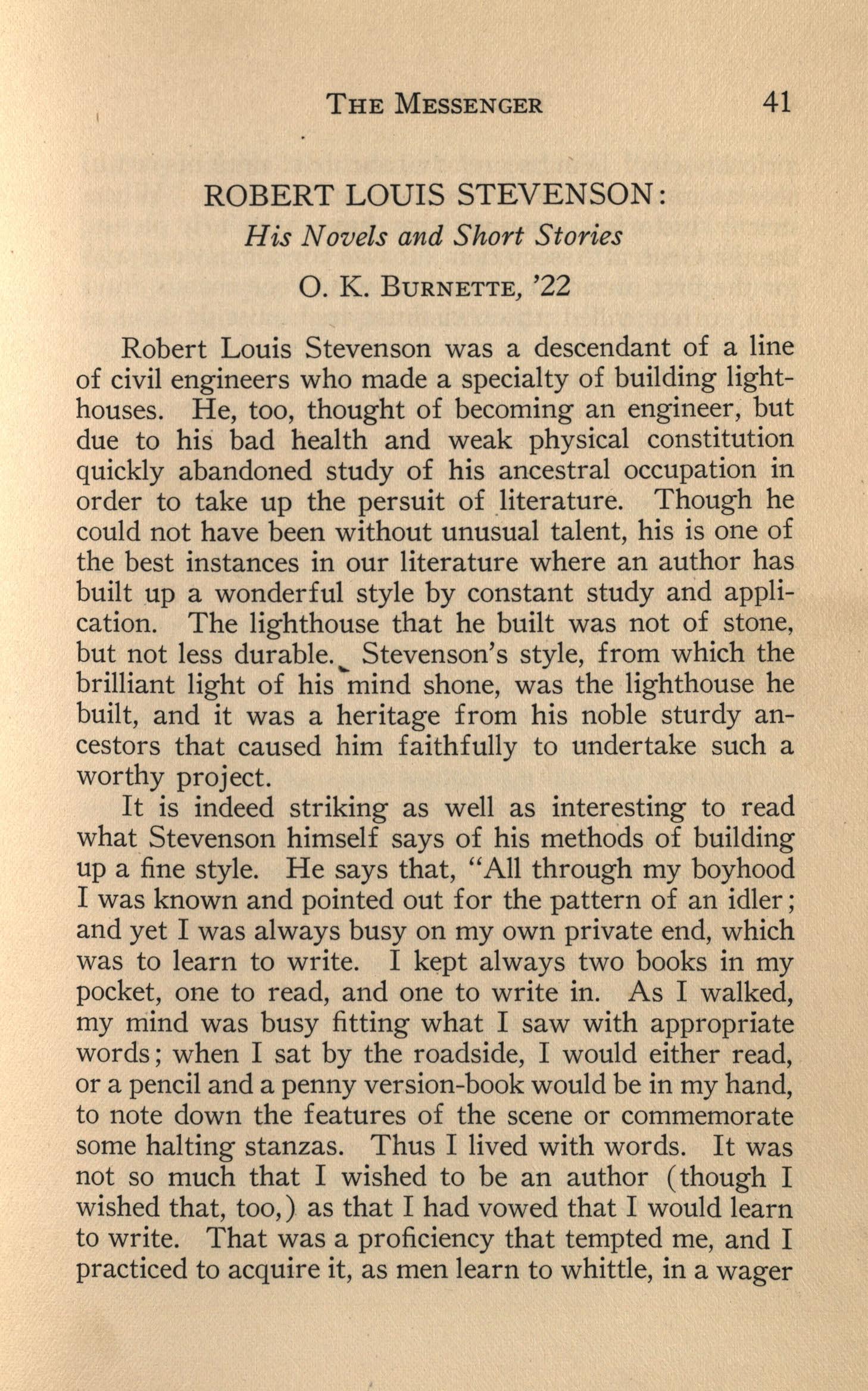
Robert Louis Stevenson was a descendant of a line of civil engineers who made a specialty of building lighthouses. He, too, thought of becoming an engineer, but due to his bad health and weak physical constitution quickly abandoned study of his ancestral occupation in order to take up the persuit of _literature. Though he could not have been without unusual talent, his is one of the best instances in our literature where an author has built up a wonderful style by constant study and application. The lighthouse that he built was not of stone, but not less durable. Stevenson's style, from which the brilliant light of his ...mind shone, was the lighthouse he built, and it was a heritage from his noble sturdy ancestors that caused him faithfully to undertake such a worthy project.
It is indeed striking as well as interesting to read what Stevenson himself says of his methods of building up a fine style. He says that, "All through my boyhood I was known and pointed out for the pattern of an idler ; and yet I was always busy on my own private end, which was to learn to write. I kept always two books in my pocket, one to read, and one to write in. As I walked, my mind was busy fitting what I saw with appropriate words; when I sat by the roadside, I would either read, or a pencil and a penny version-book would be in my hand, to note down the f ea tu res of the scene or commemorate some halting stanzas. Thus I lived with words. It was not so much that I wished to be an author ( though I wished that, too,) as that I had vowed that I would learn to write. That was a proficiency that tempted me, and I practiced to acquire it, as men learn to whittle, in a wager
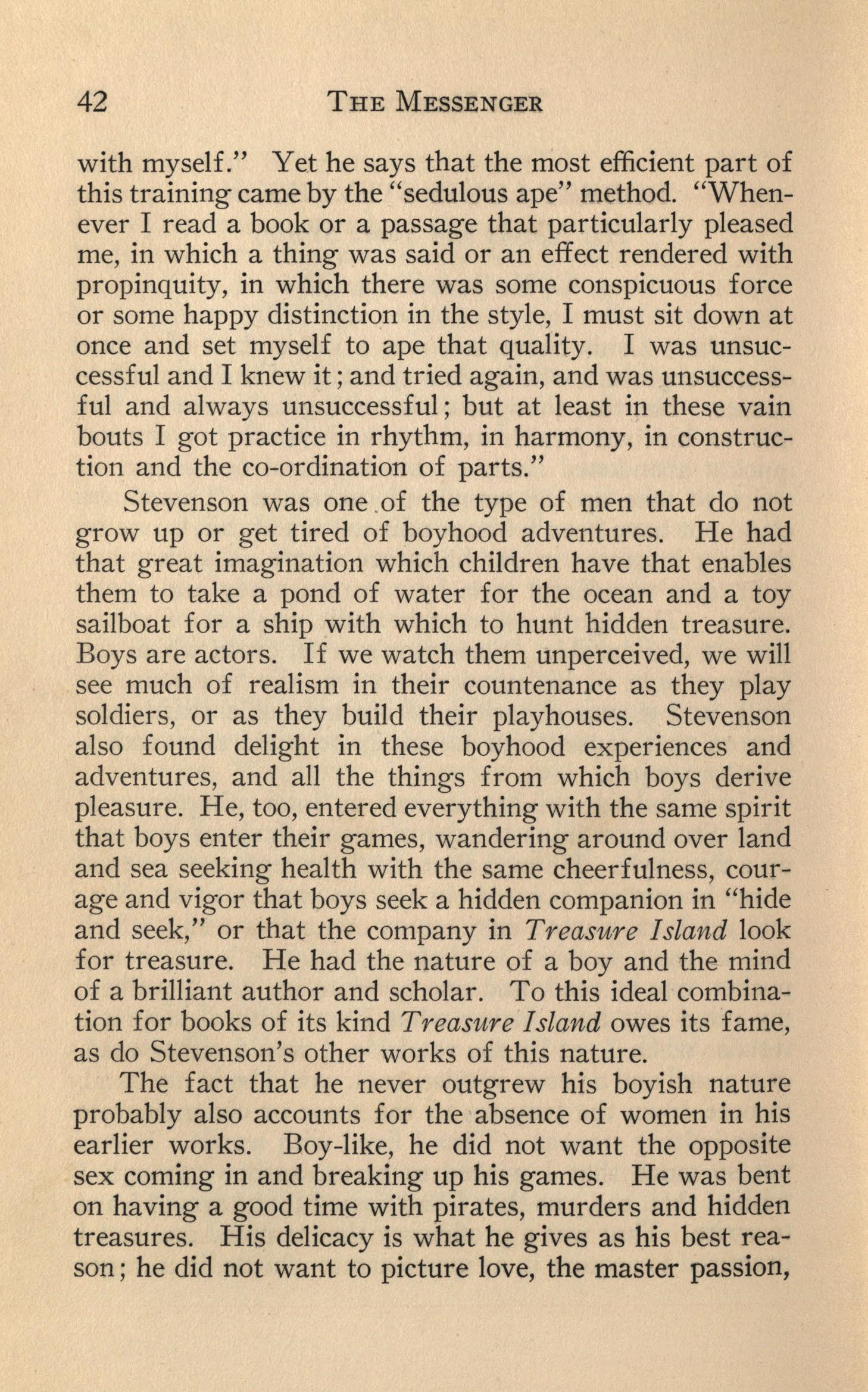
with myself." Yet he says that the most efficient part of this training came by the "sedulous ape" method. "Whenever I read a book or a passage that particularly pleased me, in which a thing was said or an effect rendered with propinquity, in which there was some conspicuous force or some happy distinction in the style, I must sit down at once and set myself to ape that quality. I was unsuccessful and I knew it; and tried again, and was unsuccessful and always unsuccessful; but at least in these vain bouts I got practice in rhythm, in harmony, in construction and the co-ordination of parts."
Stevenson was one .of the type of men that do not grow up or get tired of boyhood adventures. He had that great imagination which children have that enables them to take a pond of water for the ocean and a toy sailboat for a ship with which to hunt hidden treasure. B oys are actors. If we watch them unperceived, we will see much of realism in their countenance as they play soldiers, or as they build their playhouses. Stevenson also found delight in these boyhood experiences and adventures, and all the things from which boys derive pleasure. He, too, entered everything with the same spirit that boys enter their games, wandering around over land and sea seeking health with the same cheerfulness, courage and vigor that boys seek a hidden companion in "hide and seek," or that the company in Treasure Island look for treasure. He had the nature of a boy and the mind of a brilliant author and scholar. To this ideal combination for books of its kind Treasure Island owes its fame, as do Stevenson's other works of this nature.
The fact that he never outgrew his boyish nature probably also accounts for the absence of women in his earlier works. Boy-like, he did not want the opposite sex coming in and breaking up his games. He was bent on having a good time with pirates, murders and hidden treasures. His delicacy is what he gives as his best reason; he did not want to picture love, the master passion,
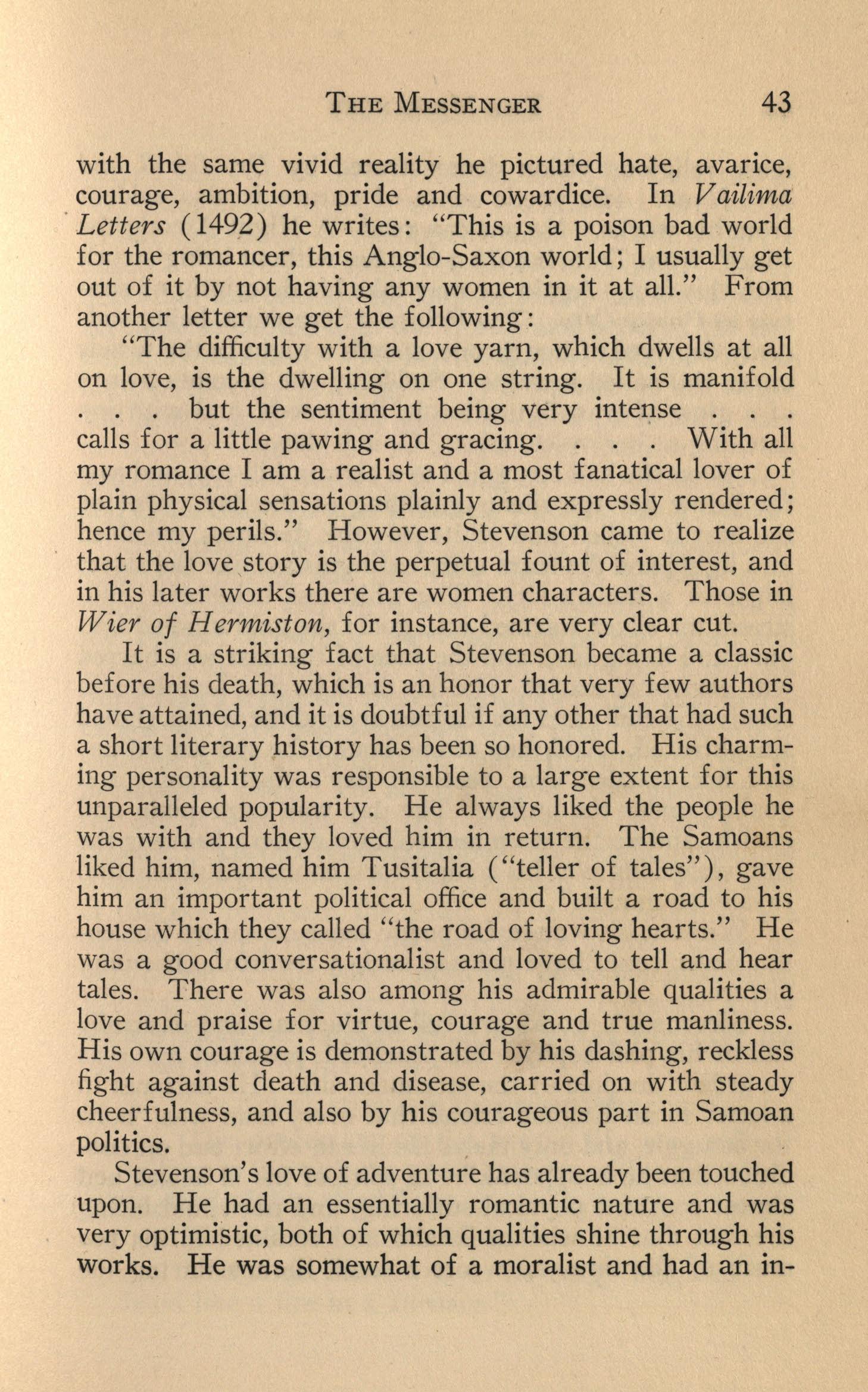
with the same vivid reality he pictured hate, avarice, courage, ambition, pride and cowardice. In Vailima · Letters ( 1492) he writes: "This is a poison bad world for the romancer, this Anglo-Saxon world; I usually get out of it by not having any women in it at all." From another letter we get the following:
"The difficulty with a love yarn, which dwells at all on love, is the dwelling on one string. It is manifold but the sentiment being very inter:ise calls for a little pawing and gracing. With all my romance I am a realist and a most fanatical lover of plain physical sensations plainly and expressly rendered; hence my perils." However, Stevenson came to realize that the love story is the perpetual fount of interest, and in his later works there are women characters. Those in Wier of Hermiston, for instance, are very clear cut. It is a striking fact that Stevenson became a classic before his death, which is an honor that very few authors have attained, and it is doubtful if any other that had such a short literary history has been so honored. His charming personality was responsible to a large extent for this unparalleled popularity. He always liked the people he was with and they loved him in return. The Samoans liked him, named him Tusitalia ( "teller of tales"), gave him an important political office and built a road to his house which they called "the road of loving hearts." He was a good conversationalist and loved to tell and hear tales. There was also among his admirable qualities a love and praise for virtue, courage and true manliness. His own courage is demonstrated by his dashing, reckless fight against death and disease, carried on with steady cheerfulness, and also by his courageous part in Samoan politics.
Stevenson's love of adventure has already been touched upon. He had an essentially romantic nature and was very optimistic, both of which qualities shine through his works. He was somewhat of a moralist and had an in-
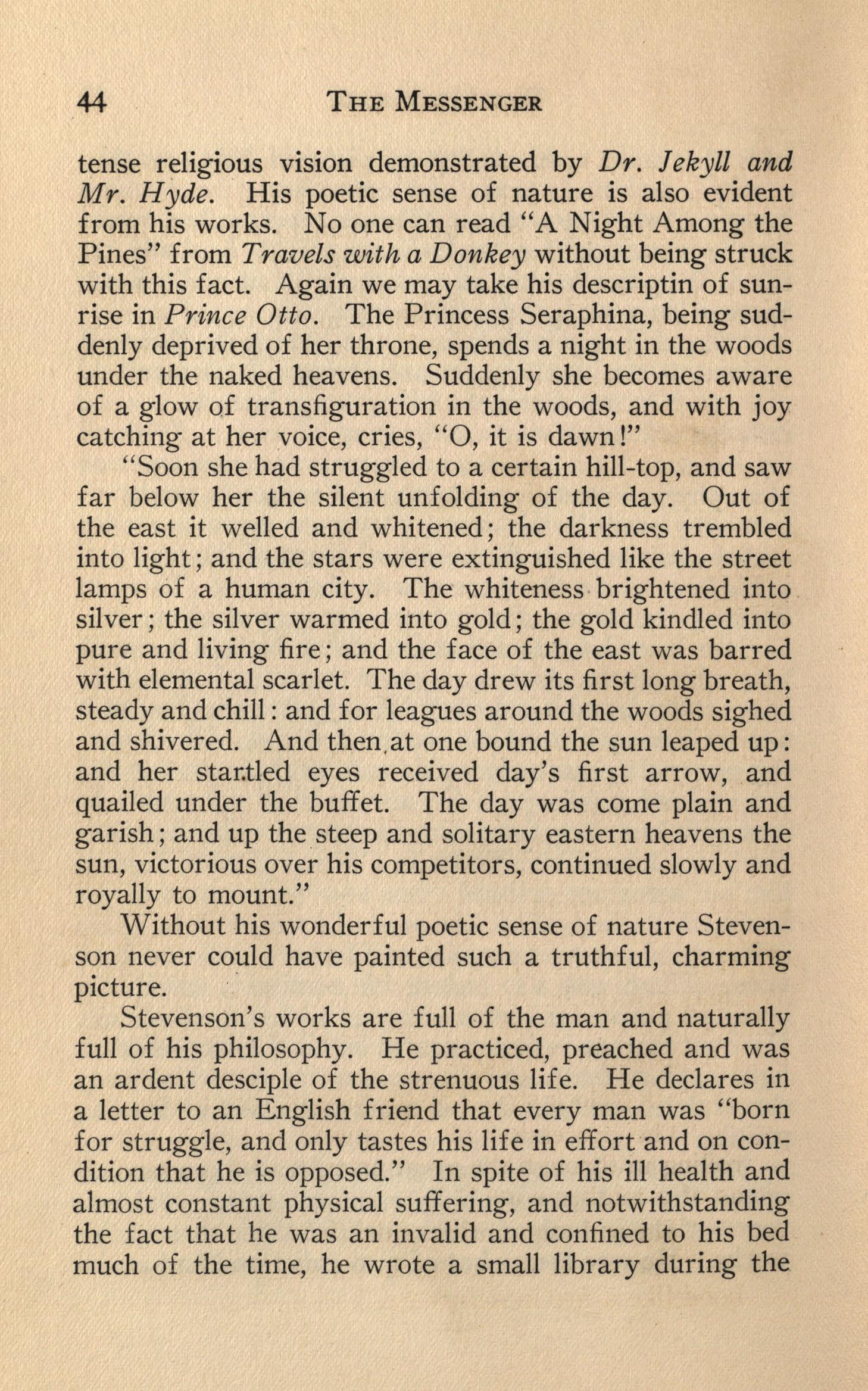
tense religious vision demonstrated by Dr. Jekyll and Mr. Hyde. His poetic sense of nature is also evident from his works. No one can read "A Night Among the Pines" from Travels with a Donkey without being struck with this fact. Again we may take his descriptin of sunrise in Prince Otto. The Princess Seraphina, being suddenly deprived of her throne, spends a night in the woods under the naked heavens. Suddenly she becomes aware of a glow of transfiguration in the woods, and with joy catching at her voice, cries, "O, it is dawn!"
" Soon she had struggled to a certain hill-top, and saw far below her the silent unfolding of the day. Out of the east it welled and whitened; the darkness trembled into light; and the stars were extinguished like the street lamps of a human city. The whiteness -brightened into silver; the silver warmed into gold; the gold kindled into pure and living fire; and the face of the east was barred with elemental scarlet. The day drew its first long breath, steady and chill : and for leagues around the woods sighed and shivered. And then .at one bound the sun leaped up: and her star.tled eyes received day's first arrow, and quailed under the buffet. The day was come plain and garish; and up the steep and solitary eastern heavens the sun, victorious over his competitors, continued slowly and royally to mount."
Without his wonderful poetic sense of nature Stevenson never could have painted such a truthful, charming picture. ·
Stevenson's works are full of the man and naturally full of his philosophy. He practiced, preached and was an ardent desciple of the strenuous life. He declares in a letter to an English friend that every man was "born for struggle, and only tastes his life in effort ·and on condition that he is opposed." In spite of his ill health and almost constant physical suffering, and notwithstanding the fact that he was an invalid and confined to his bed much of the time, he wrote a small library during the
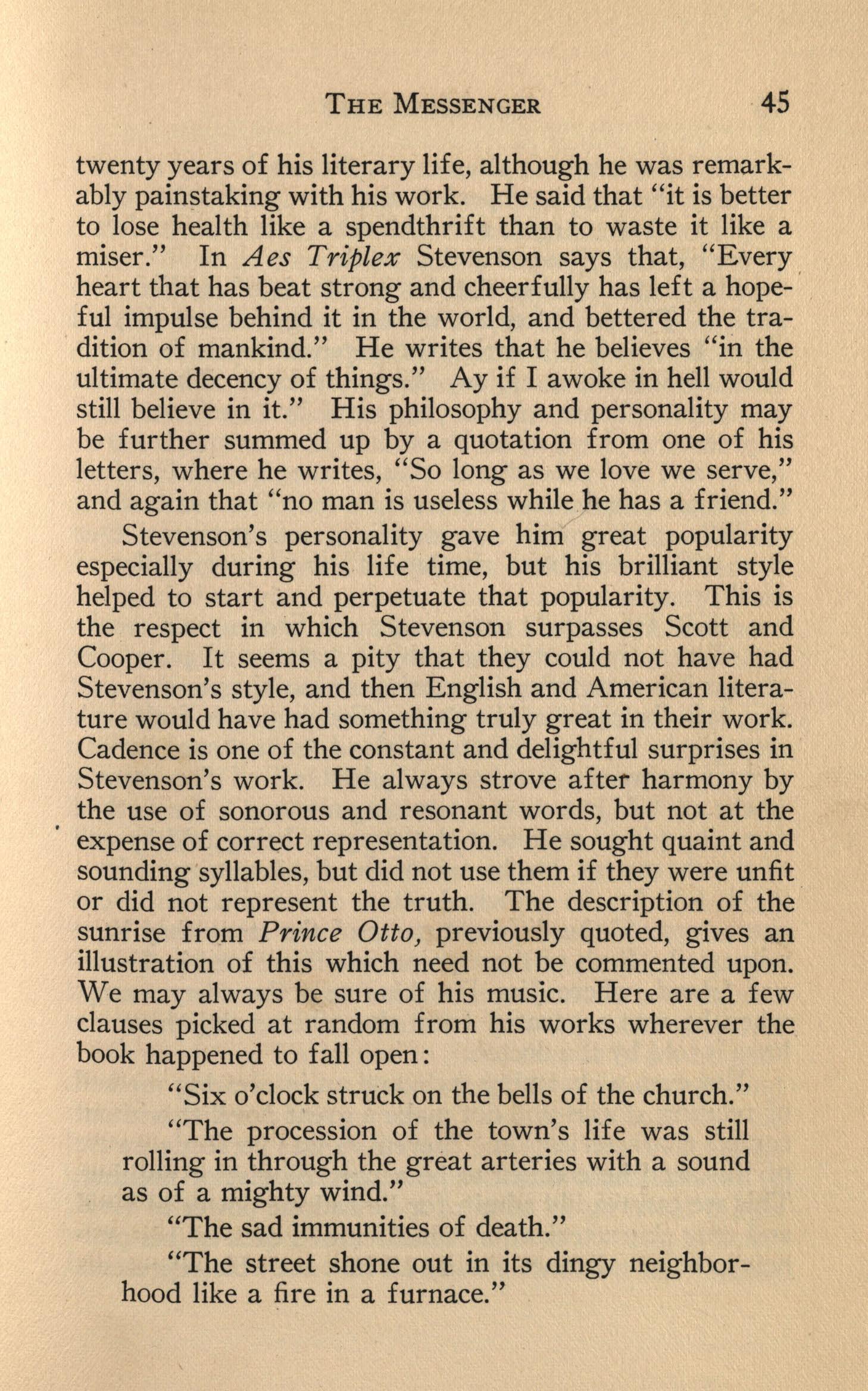
twenty years of his literary life, although he was remarkably painstaking with his work. He said that "it is better to lose health like a spendthrift than to waste it like a miser." In Aes Triplex Stevenson says that, "Every heart that has beat strong and cheerfully has left a hope- · ful impulse behind it in the world, and bettered the tradition of mankind." He writes that he believes "in the ultimate decency of things." Ay if I awoke in hell would still believe in it." His philosophy and personality may be further summed up by a quotation from one of his letters, where he writes, "So long as we love we serve," and again that "no man is useless while he has a friend."
Stevenson's personality gave him great popularity especially during his life time, but his brilliant style helped to start and perpetuate that popularity. This is the respect in which Stevenson surpasses Scott and Cooper. It seems a pity that they could not have had Stevenson's style, and then English and American literature would have had something truly great in their work. Cadence is one of the constant and delightful surprises in Stevenson's work. He always strove after harmony by the use of sonorous and resonant words, but not at the expense of correct representation. He sought quaint and sounding syllables, but did not use them if they were unfit or did not represent the truth. The description of the sunrise from Prince Otto, previously quoted, gives an illustration of this which need not be commented upon. We may always be sure of his music. Here are a few clauses picked at random from his works wherever the book happened to fall open:
"Six o'clock struck on the bells of the church."
"The procession of the town's life was still rolling in through the great arteries with a sound as of a mighty wind."
"The sad immunities of death."
"The street shone out in its dingy neighborhood like a fire in a furnace."
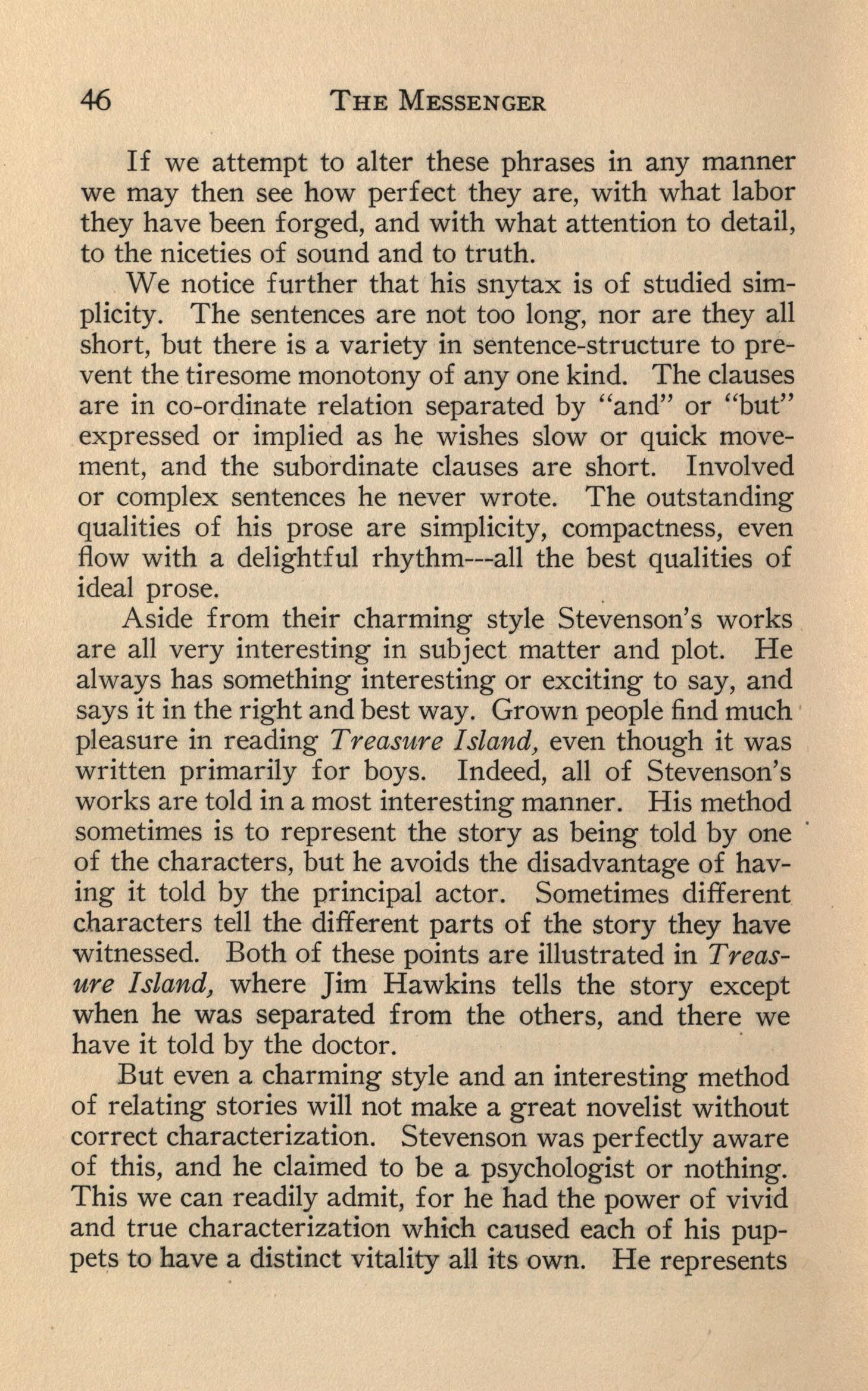
If we attempt to alter these phrases in any manner we may then see how per£ ect they are, with what labor they have been forged, and with what attention to detail, to the niceties of sound and to truth.
We notice further that his snytax is of studied simplicity. The sentences are not too long, nor are they all short, but there is a variety in sentence-structure to prevent the tiresome monotony of any one kind. The clauses are in co-ordinate relation separated by "and" or "but" expressed or implied as he wishes slow or quick movement , and the subordinate clauses are short. Involved or complex sentences he never wrote. The outstanding qualities of his prose are simplicity, compactness, even flow with a delightful rhythm---all the best qualities of ideal prose. .
Aside from their charming style Stevenson's works are all very interesting in subject matter and plot. He always has something interesting or exciting to say, and says it in the right and best way. Grown people find much pleasure in reading Treasure Island, even though it was written primarily for boys. Indeed, all of Stevenson's works are told in a most interesting manner. His method sometimes is to represent the story as being told by one · of the characters, but he avoids the disadvantage of having it told by the principal actor. Sometimes different characters tell the different parts of the story they have witnessed. Both of these points are illustrated in Treasure Island, where Jim Hawkins tells the story except when he was separated from the others, and there we have it told by the doctor. ·
But even a charming style and an interesting method of relating stories will not make a great novelist without correct characterization. Stevenson was perfectly aware of this, and he claimed to be a psychologist or nothing. This we can readily admit, for he had the power of vivid and true characterization which caused each of his puppet s to have a distinct vitality all its own. He represents
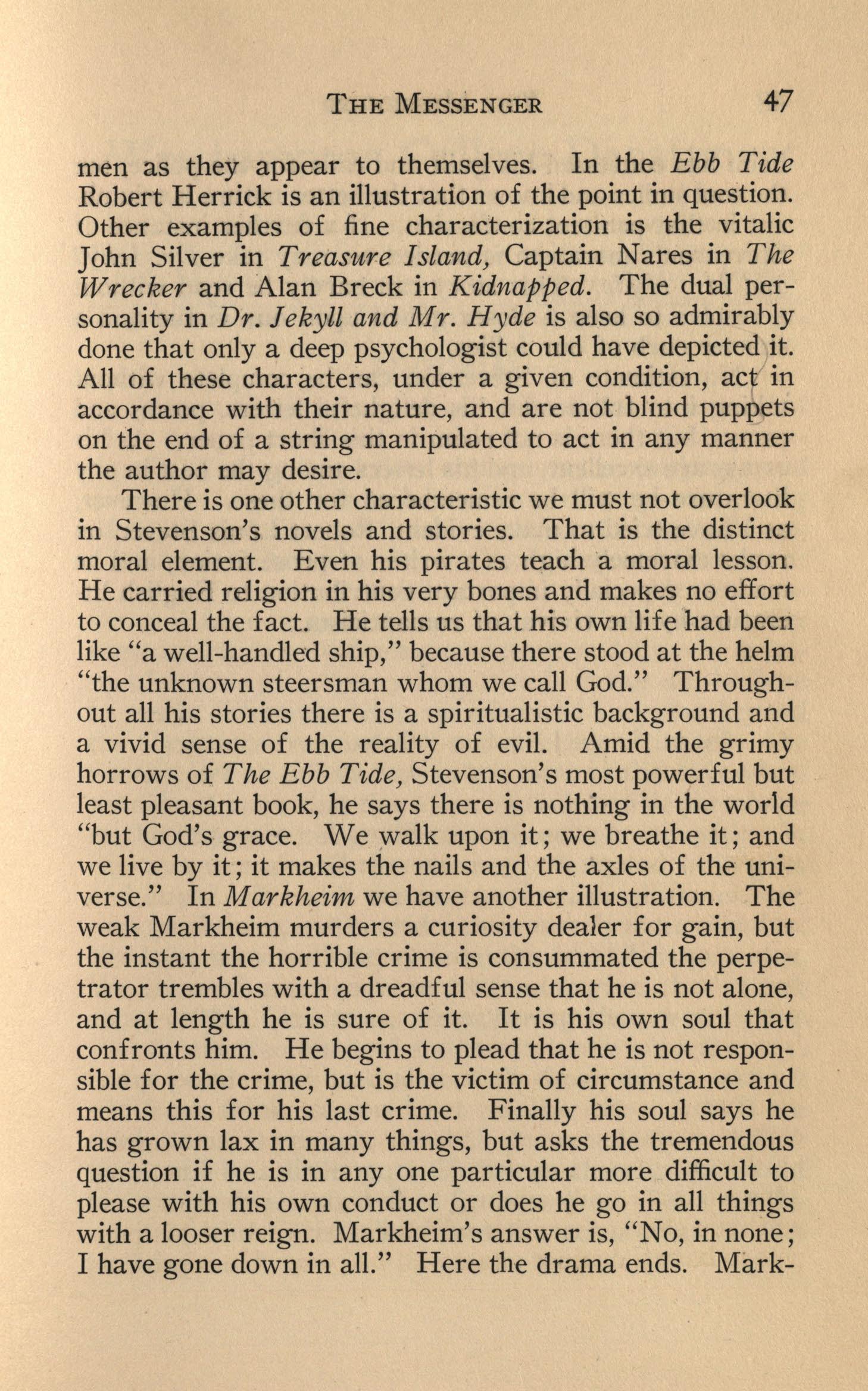
men as they appear to themselves. In the Ebb Tide Robert Herrick is an illustration of the point in question. Other examples of fine characterization is the vitalic John Silver in Treasure Island, Captain Nares in The Wrecker and Alan Breck in Kidnapped. The dual personality in Dr. Jekyll and Mr. Hyde is also so admirably done that only a deep psychologist could have depicted it. All of these characters, under a given condition, act in accordance with their nature, and are not blind puppets on the end of a string manipulated to act in any manner the author may desire.
There is one other characteristic we must not overlook in Stevenson's novels and stories. That is the distinct moral element. Even his pirates teach a moral lesson. He carried religion in his very bones and makes no effort to conceal the fact. He tells us that his own life had been like "a well-handled ship," because there stood at the helm "the unknown steersman whom we call God." Throughout all his stories there is a spiritualistic background and a vivid sense of the reality of evil. Amid the grimy horrows of The Ebb Tide , Stevenson's most powerful but least pleasant book, he says there is nothing in the world "but God's grace. We walk upon it; we breathe it; and we live by it; it makes the nails and the axles of the universe." In Markheim we have another illustration. The weak Markheim murders a curiosity dealer for gain, but the instant the horrible crime is consummated the perpetrator trembles with a dreadful sense that he is not alone , and at length he is sure of it. It is his own soul that confronts him. He begins to plead that he is not responsible for the crime, but is the victim of circumstance and means this for his last crime. Finally his soul says he has grown lax in many things, but asks the tremendous question if he is in any one particular more difficult to please with his own conduct or does he go in all things with a looser reign. Markheim's answer is, "No, in none; I have gone down in all." Here the drama ends. Mark-
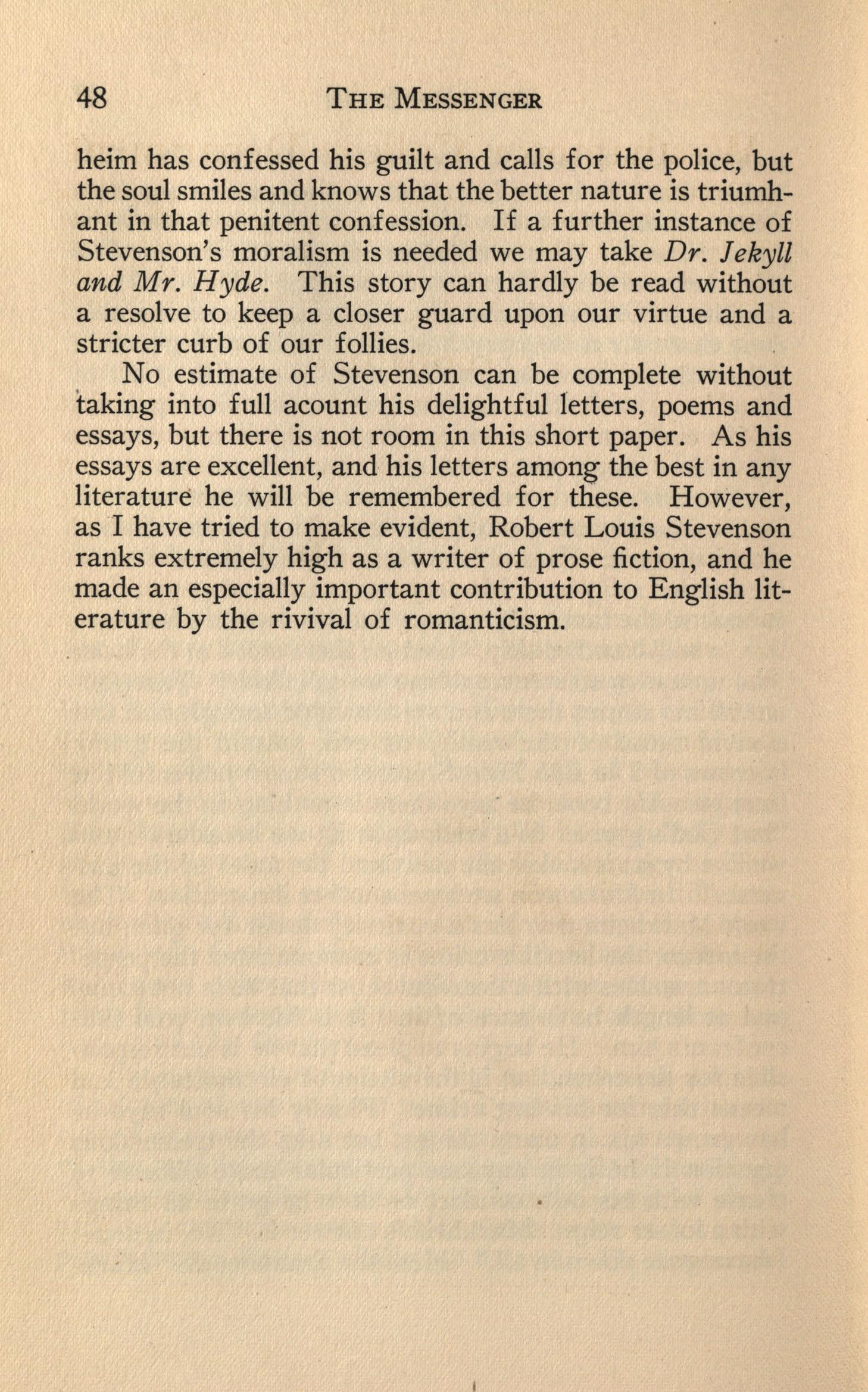
heim has confessed his guilt and calls for the police, but the soul smiles and knows that the better nature is triumhant in that penitent confession. If a further instance of Stevenson's moralism is needed we may take Dr. Jekyll and Mr. Hyde. This story can hardly be read without a resolve to keep a closer guard upon our virtue and a stricter curb of our follies.
No estimate of Stevenson can be complete without taking into full acount his delightful letters, poems and essays, but there is not room in this short paper. As his essays are excellent, and his letters among the best in any literature he will be remembered for these. However, as I have tried to make evident, Robert Louis Stevenson ranks extremely high as a writer of prose fiction, and he made an especially important contribution to English literature by the rivival of romanticism.
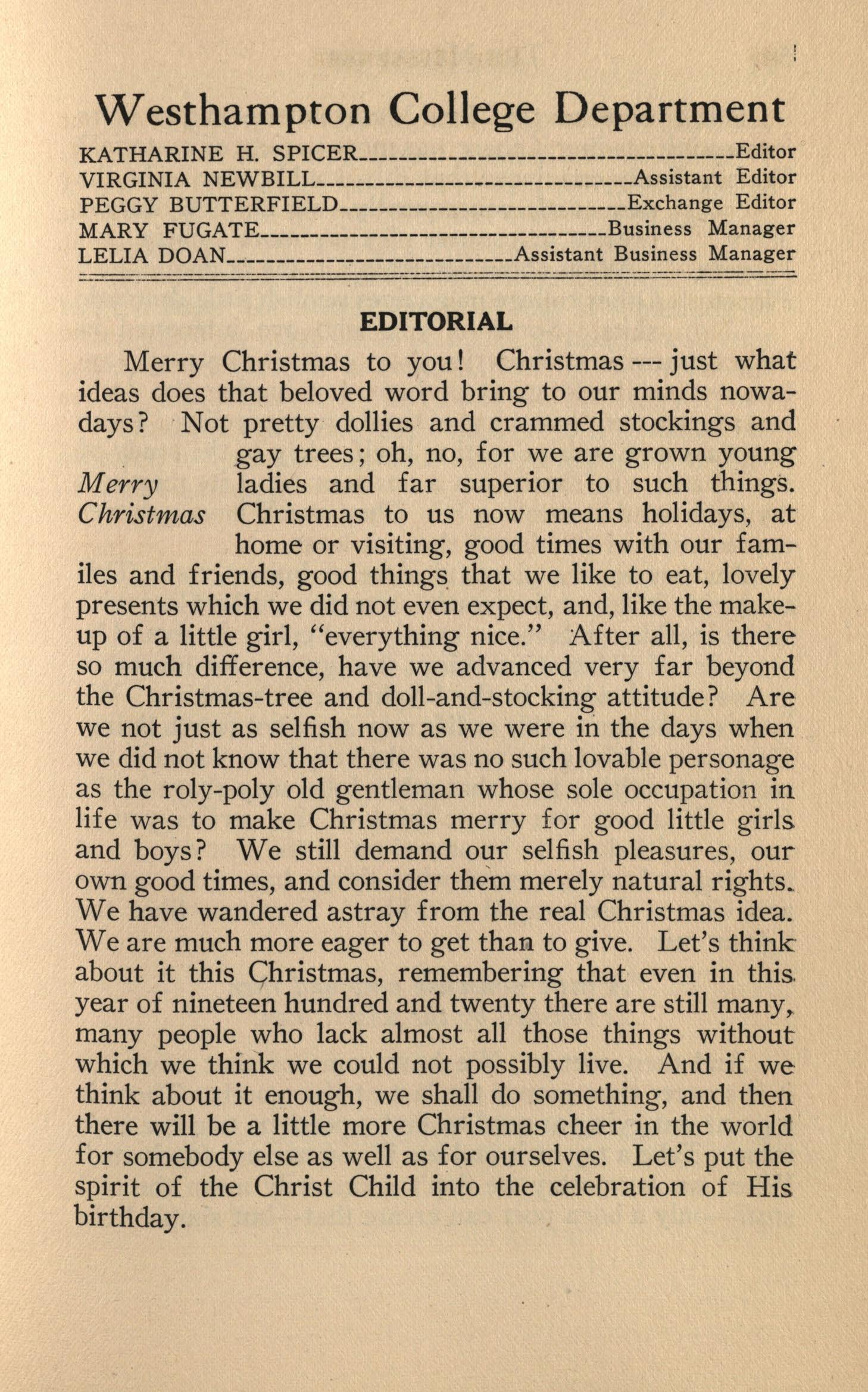
KATHARINE H. SPICER ______________________________________ Editor
VIRGINIA NEWBILL _______________________________ Assistant Editor
PEGGY BUTTERFIELD _____________________________Exchange Editor
MARY FUGATE ___________________________________Business Manager
LELIA DOAN _____________________________Assistant Business Manager
Merry Christmas to you ! Christmas ---just what ideas does that beloved word bring to our minds nowadays? Not pretty dollies and crammed stockings and gay trees; oh, no, for we are grown young Merry ladies and far superior to such things. Christmas Christmas to us now means holidays, at home or visiting, good times with our familes and friends, good things _ that we like to eat, lovely presents which we did not even expect, and, like the makeup of a little girl, "everything nice." After all, is there so much difference, have we advanced very far beyond the Christmas-tree and doll-and-stocking attitude? Are we not just as selfish now as we were iri the days when we did not know that there was no such lovable personage as the roly-poly old gentleman whose sole occupation in life was to make Christmas merry for good little girls and boys? We still demand our selfish pleasures, our own good times, and consider them merely natural rights. We have wandered astray from the real Christmas idea. We are much more eager to get than to give. Let's think about it this c;hristmas, remembering that even in this . year of nineteen hundred and twenty there are still many,. many people who lack almost all those things without which we think we could not possibly live. And if we think about it enough, we shall do something, and then there will be a little more Christmas cheer in the world for somebody else as well as for ourselves. Let's put the spirit of the Christ Child into the celebration of His birthday.
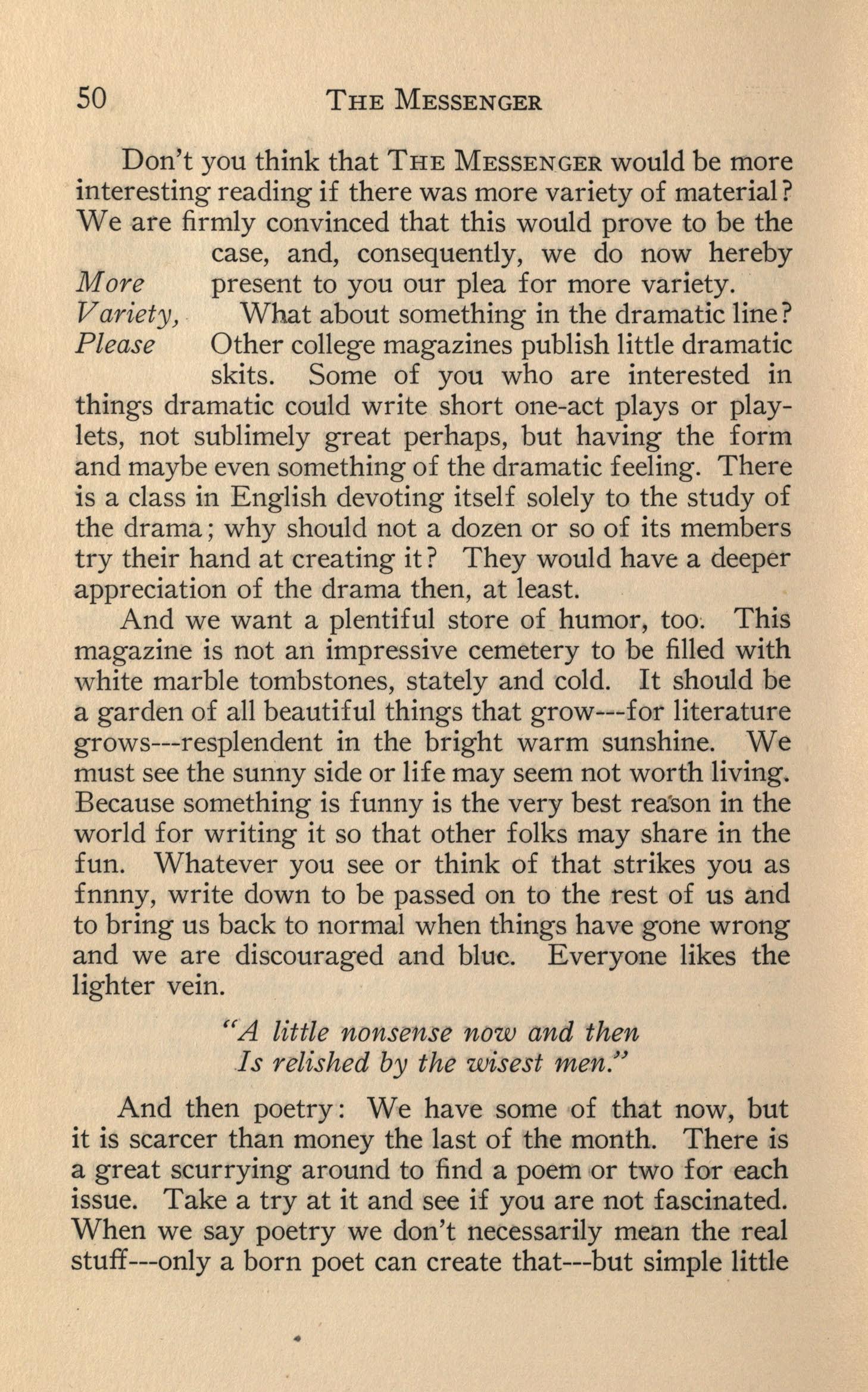
Don't you think that THE MESSENGERwould be more interesting reading if there was more variety of material? We are firmly convinced that this would prove to be the case, and, consequently, we do now hereby present to you our plea for more variety. What about something in the dramatic line?
More Variety, Please Other college magazines publish little dramatic skits. Some of you who are interested in things dramatic could write short one-act plays or playlets, not sublimely great perhaps, but having the form and maybe even something of the dramatic feeling. There is a class in English devoting itself solely to the study of the drama; why should not a dozen or so of its members try their hand at creating it? They would have a deeper appreciation of the drama then, at least. And we want a plentiful store of humor, too; This magazine is not an impressive cemetery to be filled with white marble tombstones, stately and cold. It should be a garden of all beautiful things that grow---for literature grows---resplendent in the bright warm sunshine. We must see the sunny side or life may seem not worth living. Because something is funny is the very best reason in the world for writing it so that other folks may share in the fun. Whatever you see or think of that strikes you as fnnny, write down to be passed on to the rest of us and to bring us back to normal when things have gone wrong and we are discouraged and blue. Everyone likes the lighter vein.
"A little nonsense now and then Is relished by the wisest men.,,
And then poetry: We have some of that now, but it is scarcer than money the last of the month. There is a great scurrying around to find a poem or two for each issue. Take a try at it and see if you are not fascinated. When we say poetry we don't necessarily mean the real stuff---only a born poet can create that---but simple little
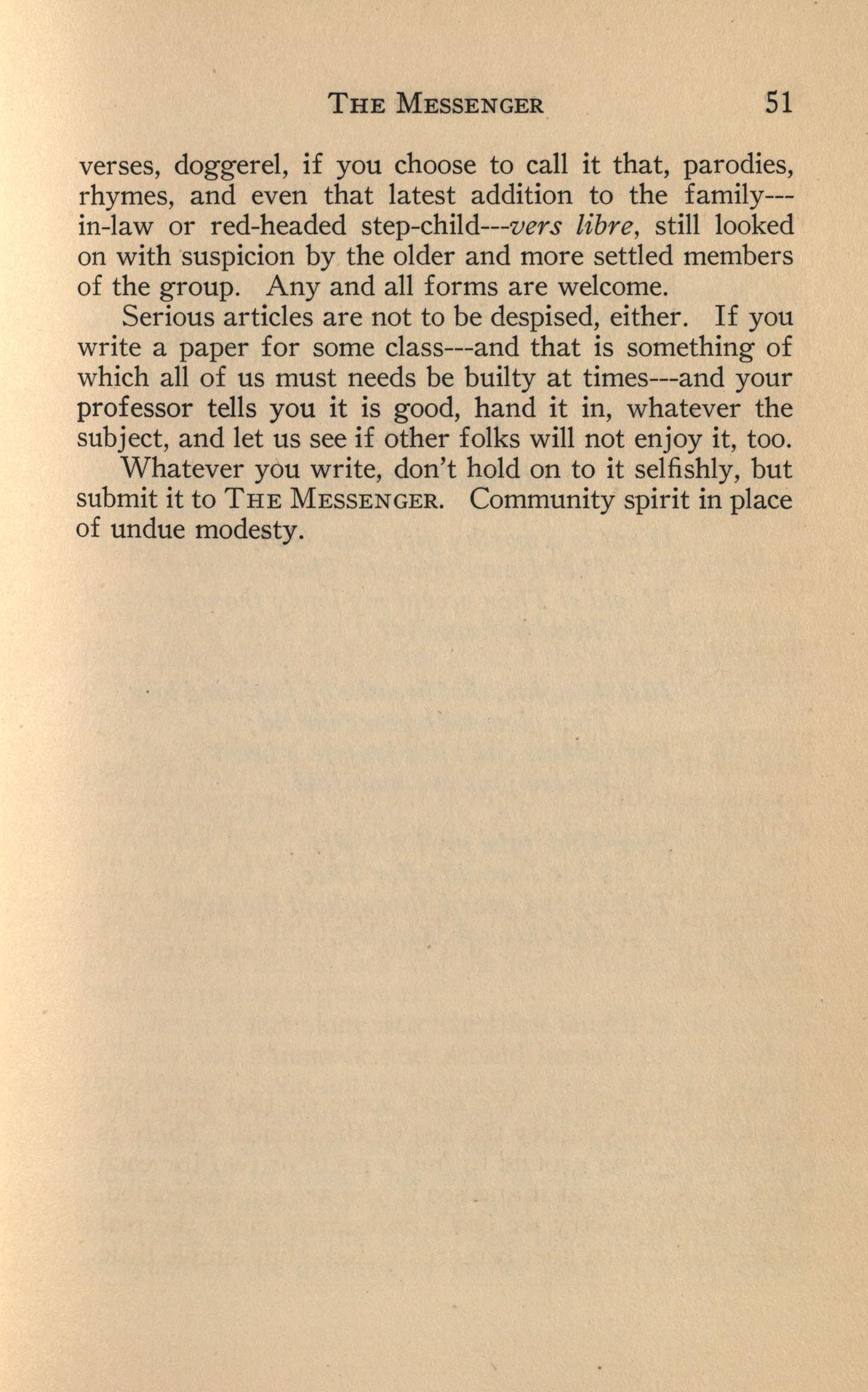
verses, doggerel, if you choose to call it that, parodies, rhymes, and even that latest addition to the family--in-law or red-headed step-child---vers libre, still looked on with suspicion by the older and more settled members of the group. Any and all forms are welcome. Serious articles are not to be despised, either. If you write a paper for some class---and that is something of which all of us must needs be builty at times---and your professor tells you it is good, hand it in, whatever the subject, and let us see if other folks will not enjoy it, too. Whatever you write, don't hold on to it selfishly, but submit it to THE MESSENGER. Community spirit in place of undue modesty.

What is a worthy gift, dear God, That I may bring to Thee? Would'st Thou accept my lowly thoughts Given in sincerity?
Just thoughts, that breathe of faith and love, That glow with peace untold; For sadness can't live long in a heart Where joys are manifold.
Dear God, take my little gift That I would offer Thee, To keep and guard, throughout the days, And through eternity.
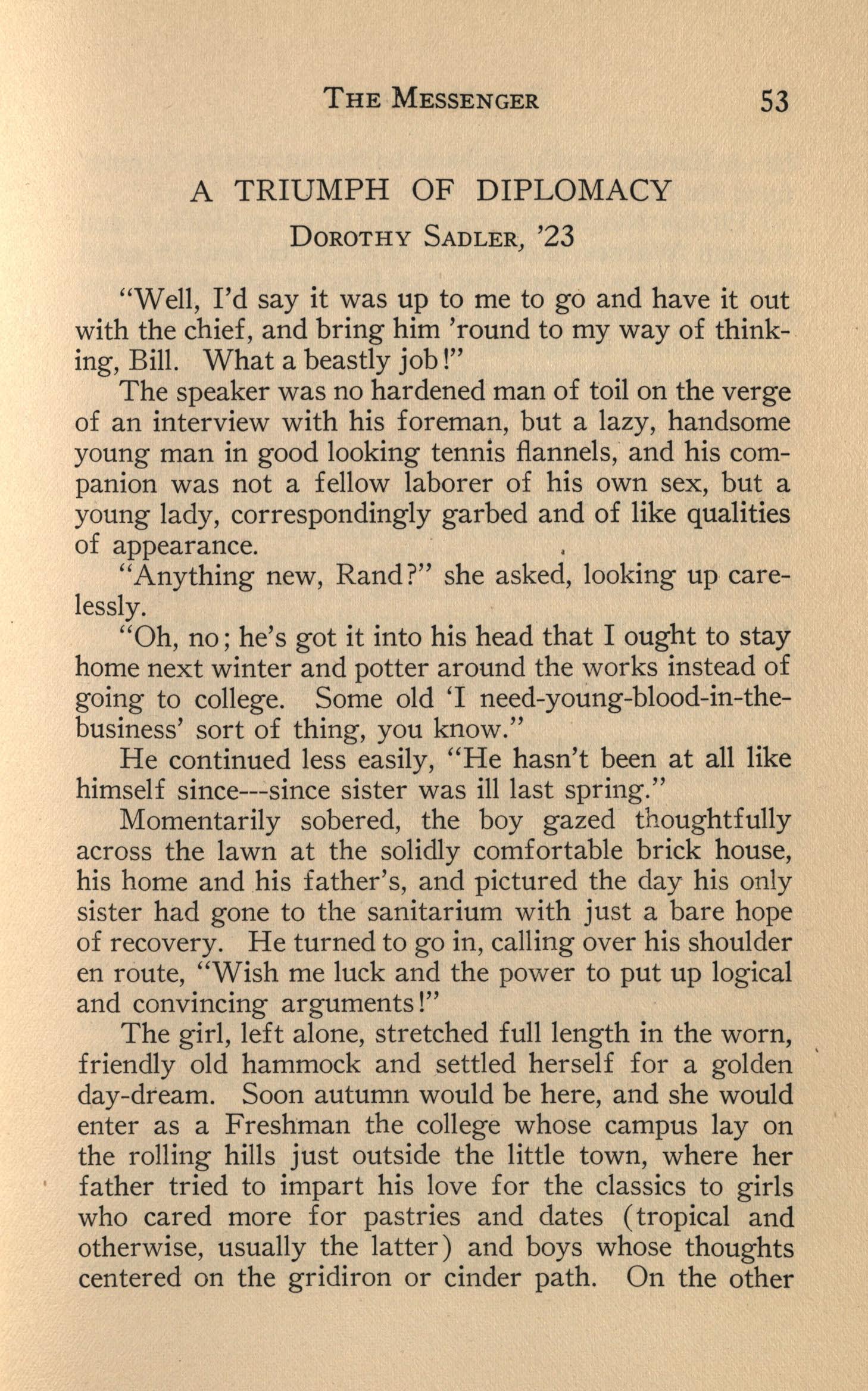
DOROTHY SADLER, '23
"Well, I'd say it was up to me to go and have it out with the chief, and bring him 'round to my way of thinking, Bill. What a beastly job!"
The speaker was no hardened man of toil on the verge of an interview with his foreman, but a lazy, handsome young man in good looking tennis flannels, and his companion was not a fellow laborer of his own sex, but a young lady, correspondingly garbed and of like qualities of appearance. .
"Anything new, Rand?" she asked, looking up carelessly.
"Oh, no; he's got it into his head that I ought to stay home next winter and potter around the works instead of going to college. Some old 'I need-young-blood-in-thebusiness' sort of thing, you know."
He continued less easily, "He hasn't been at all like himself since---since sister was ill last spring."
Momentarily sobered, the boy gazed t h oughtfully across the lawn at the solidly comfortable brick house, his home and his father's, and pictured the day his only sister had gone to the sanitarium with just a bare hope of recovery. He turned to go in, calling over his shoulder en route, "Wish me luck and the power to put up logical and convincing arguments!"
The girl, left alone, stretched full length in the worn, friendly old hammock and settled herself for a golden day-dream. Soon autumn would be here, and she would enter as a Freshman the college whose campus lay on the rolling hills just outside the little town, where her · father tried to impart his love for the classics to girls who cared more for pastries and dates ( tropical and otherwise, usually the latter) and boys whose thoughts centered on the gridiron or cinder path. On the other

hand, Randall would go back to the university to enter upon his Junior year.
Phyllis Newberry, otherwise "Bill" or "Billie," and Randall Warner had grown up together, and in small town parlance, "were just like brother and sister, you know, so absolutely unselfconscious." · Indeed, they could scarcely help being that way since Phyllis, through a natural tomboyish inclination, had always shared in every exploit with Randall and her own brother, and since her mother had been one to him ever since the death of his own, when he was two years old. The boys never classed "Bill" as "one of those girls who are afraid to bait their own fishin' hooks an' can't skin the cat."
So Phyllis grew up as "Billie" until her first year at high school, when she underwent a sudden change and became more quiet and much more pleasing to her maiden aunt, while the unconscious cause of the change blithely courted all the other causes, conscious or not, and was still a brother to Phyllis. Once it had worried her exceedingly, but now he was superior to such things, or thought she was, which is all the same.
A step on the grass roused her, and one glance at Randall's face made her sit up and prepare to hear what she already knew was coming.
"What do you think? That old---that father of mine has positively and finally decided not to send me back to college this fall and no arguments will budge him an inch! He says I may go after two years at the Works, but of course he know's he safe in that. I told him I told him I'd leave home and see it through on my own initiative, and he turned 'round and said, just like asking the time of day, 'Very well, go ahead.'"
Randall paused for breath and gave Phyllis a chance to inquire in a matter-of-fact tone, "Well, aren't you going ahead just to show him?"
"Of course, after he took it like that, but he didn't give me a fair show, telling me here just about three
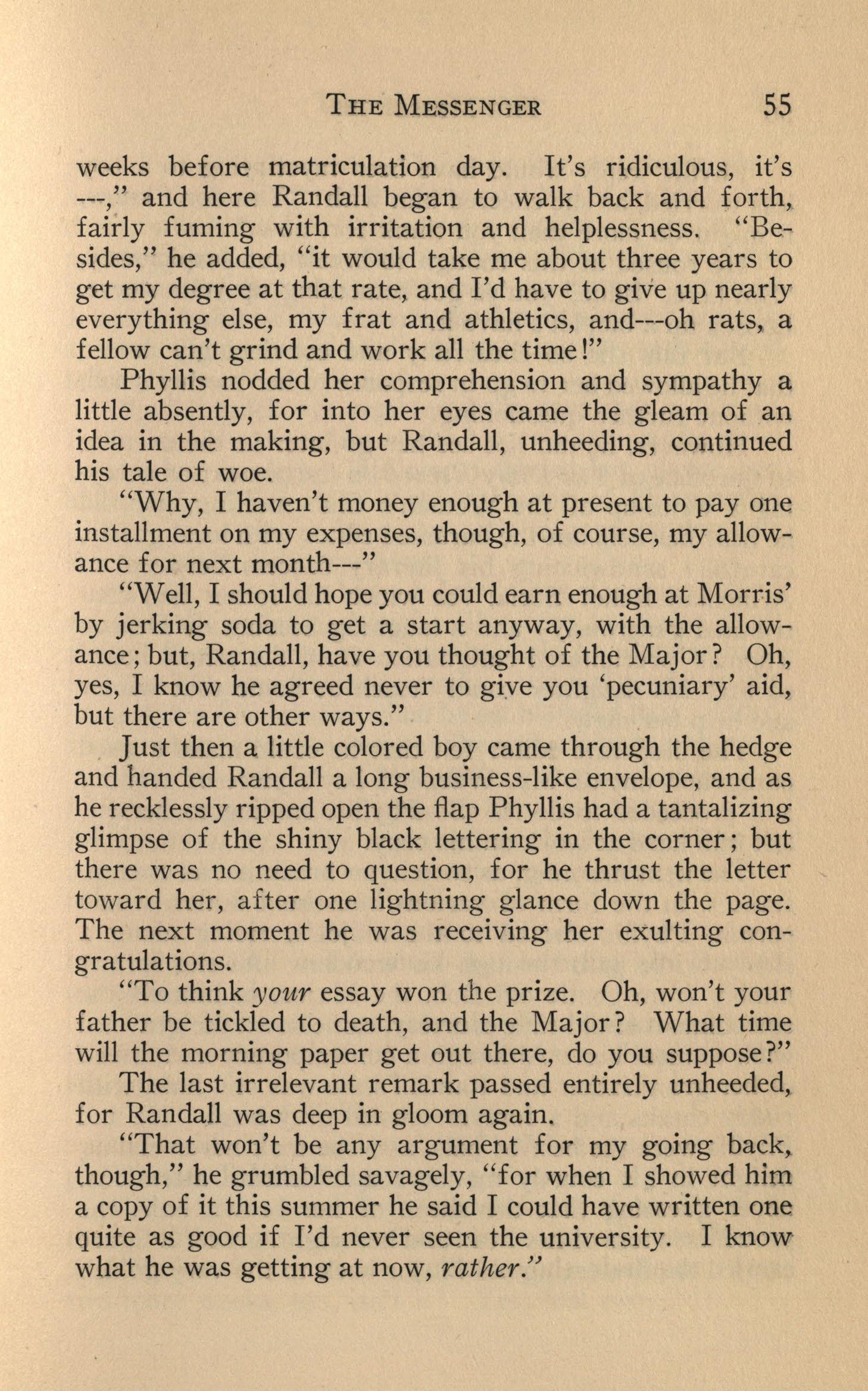
weeks before matriculation day. It's ridiculous, it's ---," and here Randall began to walk back and forth, fairly fuming with irritation and helplessness. "Besides," he added, "it would take me about three years to get my degree at that rate, and I'd have to give up nearly everything else, my frat and athletics, and---oh rats. a fellow can't grind and work all the time!"
Phyllis nodded her comprehension and sympathy a little absently, for into her eyes came the gleam of an idea in the making, but Randall, unheeding, continued his tale of woe.
"Why, I haven't money enough at present to pay one installment on my expenses, though, of course, my allowance for next month---"
"Well, I should hope you could earn enough at Morris' by jerking soda to get a start anyway, with the allowance; but, Randall, have you thought of the Major? Oh, yes, I know he agreed never to give you 'pecuniary' aid, but there are other ways."
Just then a little colored boy came through the hedge and handed Randall a long business-like envelope, and as he recklessly ripped open the flap Phyllis had a tantalizing glimpse of the shiny black lettering in the corner; but there was no need to question, for he thrust the letter toward her, after one lightning glance down the page. The next moment he was receiving her exulting congratulations.
"To think your essay won the prize. Oh, won't your father be tickled to death, and the Major? What time will the morning paper get out there, do you suppose?"
The last irrelevant remark passed entirely unheeded, for Randall was deep in gloom again.
"That won't be any argument for my going back, though," he grumbled savagely, "for when I showed him a copy of it this summer he said I could have written one quite as good if I'd never seen the university. I know what he was getting at now, rather."
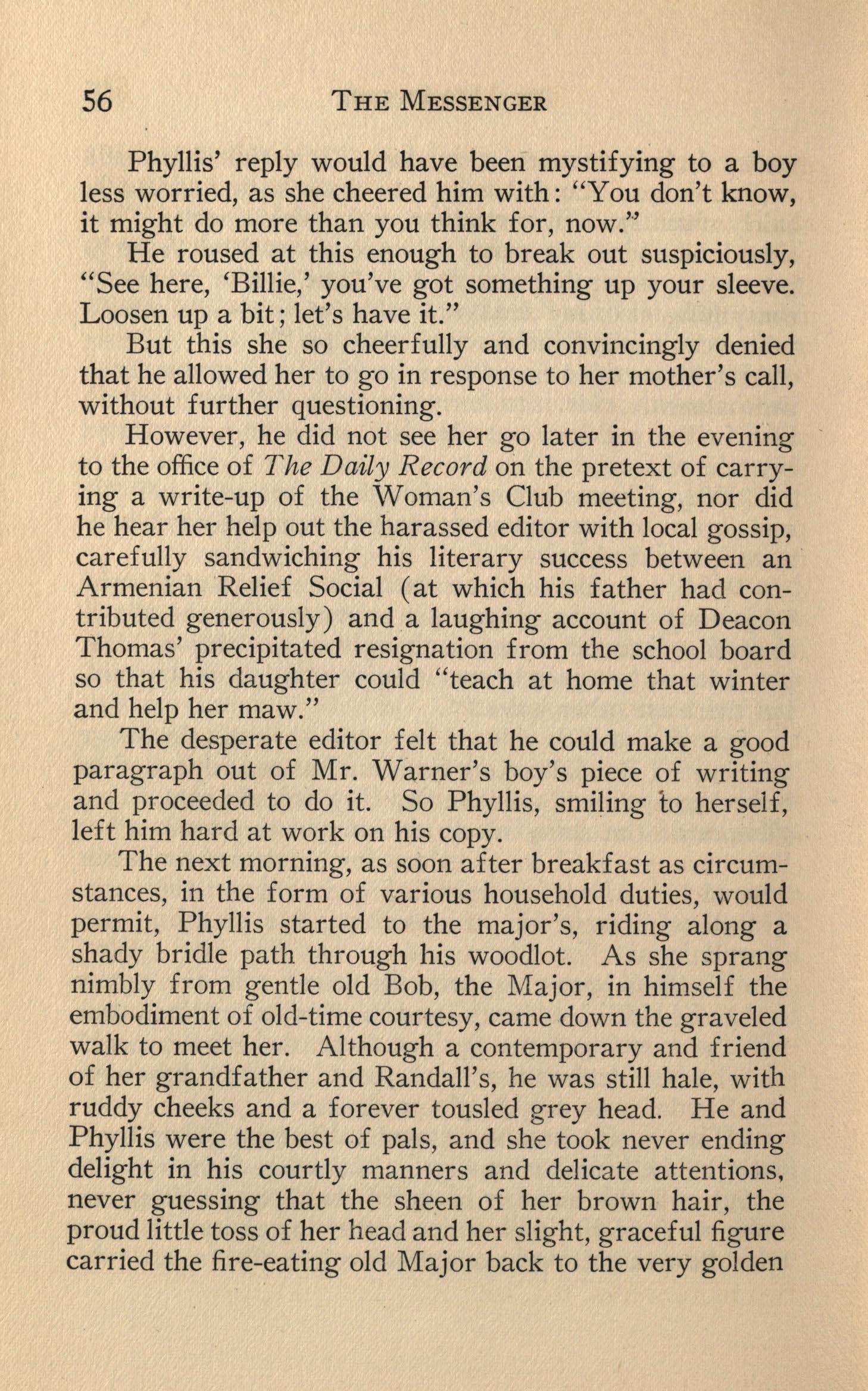
Phyllis' reply would have been mystifying to a boy less worried, as she cheered him with: "You don't know, it might do more than you think for, now.' · '
He roused at this enough to break out suspiciously, "See here, 'Billie,' you've got something up your sleeve. Loosen up a bit; let's have it."
But this she so cheerfully and convincingly denied that he allowed her to go in response to her mother's call, without further questioning.
However, he did not see her go later in the evening to the office of The Daily Record on the pretext of carrying a write-up of the Vvoman's Club meeting, nor did he hear her help out the harassed editor with local gossip, carefully sandwiching his literary success between an Armenian Relief Social ( at which his father had contributed generously) and a laughing account of Deacon Thomas' precipitated resignation from the school board so that his da ughter could "teach at home that winter and help her maw."
The desperate editor felt that he could make a good paragraph out of Mr. Warner's boy's piece of writing and proceeded to do it. So Phyllis, smiling to herself, left him hard at work on his copy.
The next morning, as soon after breakfast as circumstances, in the form of various household duties, would permit, Phyllis started to the major's, riding along a shady bridle path through his woodlot. As she sprang nimbly from gentle old Bob, the Major, in him self the embodiment of old-time courtesy, came down the graveled walk to meet her. Although a contemporary and friend of her grandfather and Randall's, he was still hale, with ruddy cheeks and a forever tousled grey head. He and Phyllis were the best of pals , and she took never ending delight in his courtly manners and delicate attentions, never guessing that the sheen of her brown hair, the proud little toss of her head and her slight, graceful figure carried the fire-eating old Major back to the very golden
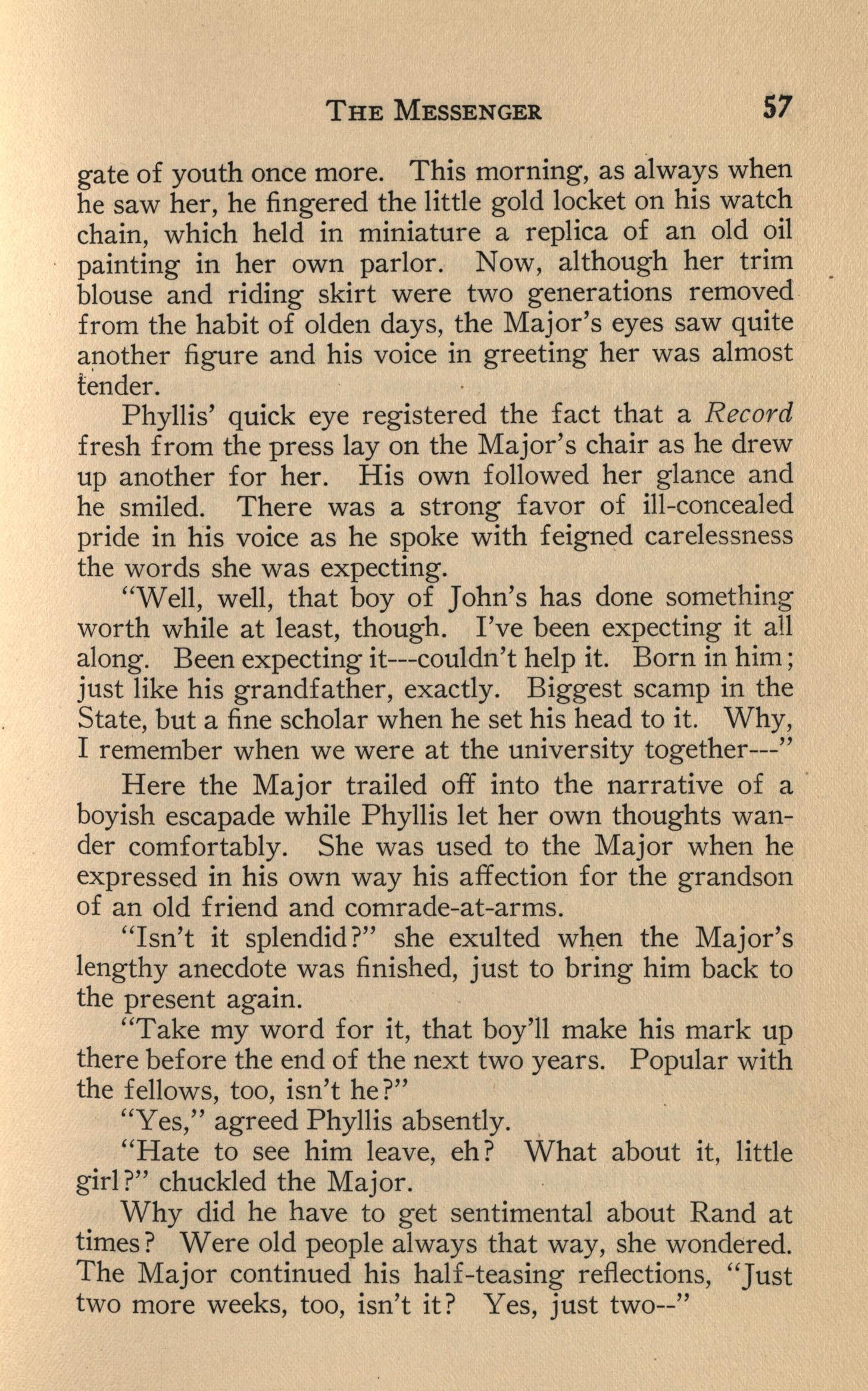
gate of youth once more. This morning, as always when he saw her, he fingered the little gold locket on his watch chain, which held in miniature a replica of an old oil painting in her own parlor. Now, although her trim blouse and riding skirt were two generations removed from the habit of olden days, the Major's eyes saw quite ap.other figure and his voice in greeting her was almost tender.
Phyllis' quick eye registered the fact that a Record fresh from the press lay on the Major's chair as he drew up another for her. His own followed her glance and he smiled. There was a strong favor of ill-concealed pride in his voice as he spoke with feigned carelessness the words she was expecting.
"Well, well, that boy of John's has done something worth while at least, though. I've been expecting it all along . Been expecting it---couldn't help it. Born in him; just like his grandfather, exactly. Biggest scamp in the State, but a fine scholar when he set his head to it. Why, I remember when we were at the university together---"
Here the Major trailed off into the narrative of a boyish escapade while Phyllis let her own thoughts wander comfortably. She was used to the Major when he expressed in his own way his affection for the grandson of an old friend and comrade-at-arms.
"Isn't it splendid?" she exulted when the Major's lengthy anecdote was finished, just to bring him back to the present again.
"Take my word for it, that boy'll make his mark up there before the end of the next two years. Popular with the fellows, too, isn't he?"
"Yes," agreed Phyllis absently. .
"Hate to see him leave, eh? What about it, little girl?" chuckled the Major.
Why did he have to get sentimental about Rand at times? Were old people always that way, she wondered. The Major continued his half-teasing reflections, "Just two more weeks, too, isn't it? Yes, just two--"
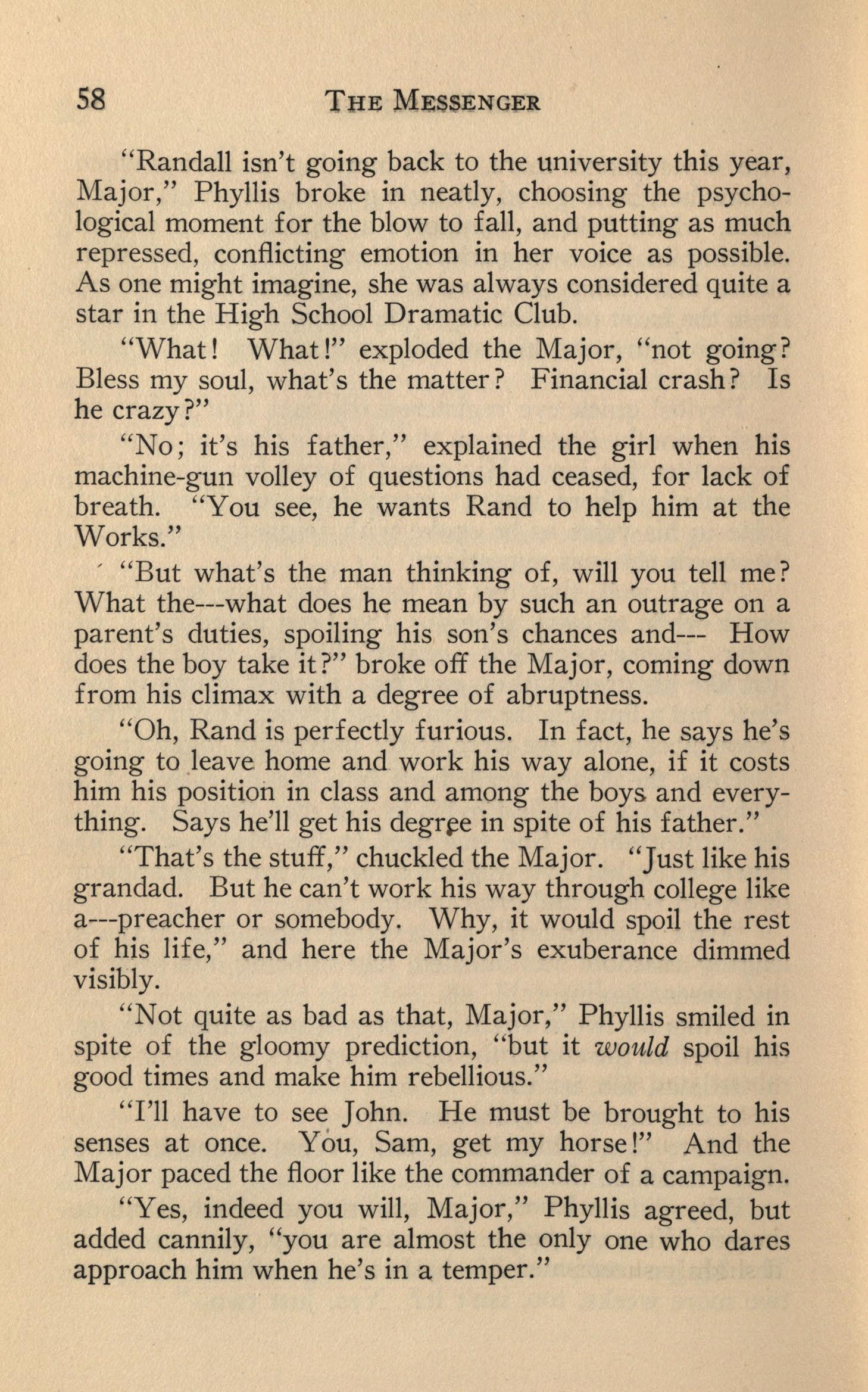
"Randall isn't going back to the university this year, Major," Phyllis broke in neatly, choosing the psychological moment for the blow to fall, and putting as much repressed , conflicting emotion in her voice as possible. As one might imagine, she was always considered quite a star in the High School Dramatic Club.
"What! What!" exploded the Major, "not going? Bless my soul, what's the matter? Financial crash? Is he crazy?"
" No; it's his father," explained the girl when his machine-gun volley of questions had ceased, for lack of breath. "You see, he wants Rand to help him at the Works."
,
" But what's the man thinking of, will you tell me? What the---what does he mean by such an outrage on a parent's duties, spoiling his son's chances and---How does the boy take it?" broke off the Major, corning down from his climax with a degree of abruptness.
"Oh, Rand is perfectly furious. In fact, he says he's going to leave home and work his way alone, if it costs him his position in class and among the boys. and everything. Says he'll get his degrte in spite of his father."
"That's the stuff," chuckled the Major. "Just like his grandad. But he can't work his way through college like a---preacher or somebody. Why, it would spoil the rest of his life," and here the Major's exuberance dimmed visibly.
"Not quite as bad as that, Major," Phyllis smiled in spite of the gloomy prediction, "but it would spoil his good times and make him rebellious."
"I'll have to see John. He must be brought to his senses at once. You, Sam, get my horse!" And the Major paced the floor like the commander of a campaign.
"Yes, indeed you will, Major," Phyllis agreed, but added cannily, "you are almost the only one who dares approach him when he's in a temper."

"Now don't bother your pretty head about that, child, don't bother at all. I'll use diplomacy; never fear. I know John all right, my dear," the Major reassured her a trifle pompously and continued, "Now, I don't wish to hurry your departure, but don't you think John will be at leisure when we get there?" * . * * * * *
Randall and Phyllis sat under the elm tree, waiting. The former was at the mercy of a very bad attack of fidgets, quite natural under the circumstances, while the latter quietly fanned with her hat, trying all the while not to smile at the exaggerated tragic expression on her companion's face, whenever he risked a glance at the library window, whence issued the smell of good cigars and occasional murmurs of conversation. From the garden came little Jim's tuneless, if cheerful, whistle as he pulled weeds, and the many homely sounds had never seemed so distant or numerous before. Randall remembered later that he counted the same note in Jim's whistle fifteen times before he was conscious of even hearing it. And so the endless minutes passed and at last the two men emerged from the house.
The Major's face wore an impenetrable mask and the father's a carefully unconcerned smile. He extended his hand to his son and smiled, politely cordial.
"Congratulations, my boy, for the early success in literature, if I may so express it. It seemed rather--well unusual that I should learn of it from the paper, but you youngsters are mighty reticent these days, especially about yourselves. By the way, I have a letter here from sister. She is much better, and wants you to come by and see her as you---er---go on to the university next month. Isn't that great?"
"Y-yes, thank you, yes, sir," stammered Randall, as he gripped his father's hand hard and glanced up to find a slightly sheepish smile on his face.
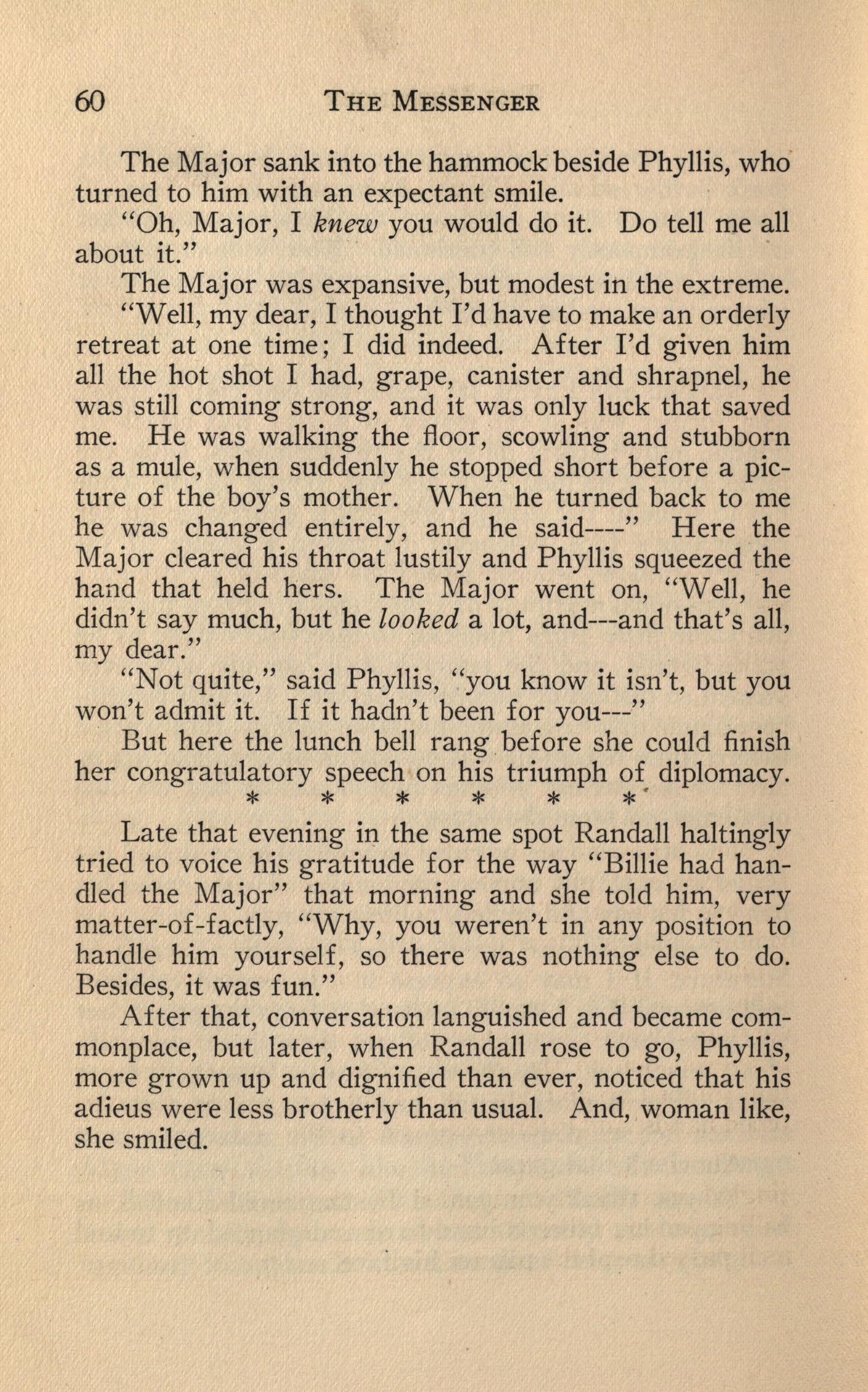
The Major sank into the hammock beside Phyllis, who turned to him with an expectant smile. "Oh, Major, I knew you would do it. Do tell me all about it."
The Major was expansive, but modest in the extreme. "Well, my dear, I thought I'd have to make an orderly retreat at one time; I did indeed. After I'd given him all the hot shot I had, grape, canister and shrapnel, he was still coming strong, and it was only luck that saved me. He was walking the floor, scowling and stubborn as a mule, when suddenly he stopped short before a picture of the boy's mother. When he turned back to me he was changed entirely, and he said----" Here the Major cleared his throat lustily and Phyllis squeezed the hand that held hers. The Major went on, "Well, he didn't say much, but he looked a lot, and---and that's all, my dear."
"Not quite," said Phyllis, "you know it isn't, but you won't admit it. If it hadn't been for you---"
But here the lunch bell rang .before she could finish her congratulatory speech on his triumph of diplomacy. * * * * * * '
Late that evening in the same spot Randall haltingly tried to voice his gratitude for the way "Billie had handled the Major" that morning and she told him, very matter-of-factly, "Why, you weren't in any position to handle him yourself, so there was nothing else to do. Besides, it was fun."
After that, conversation languished and became commonplace, but later, when Randall rose to go, Phyllis, more grown up and dignified than ever, noticed that his adieus were less brotherly than usual. And, woman like, she smiled.
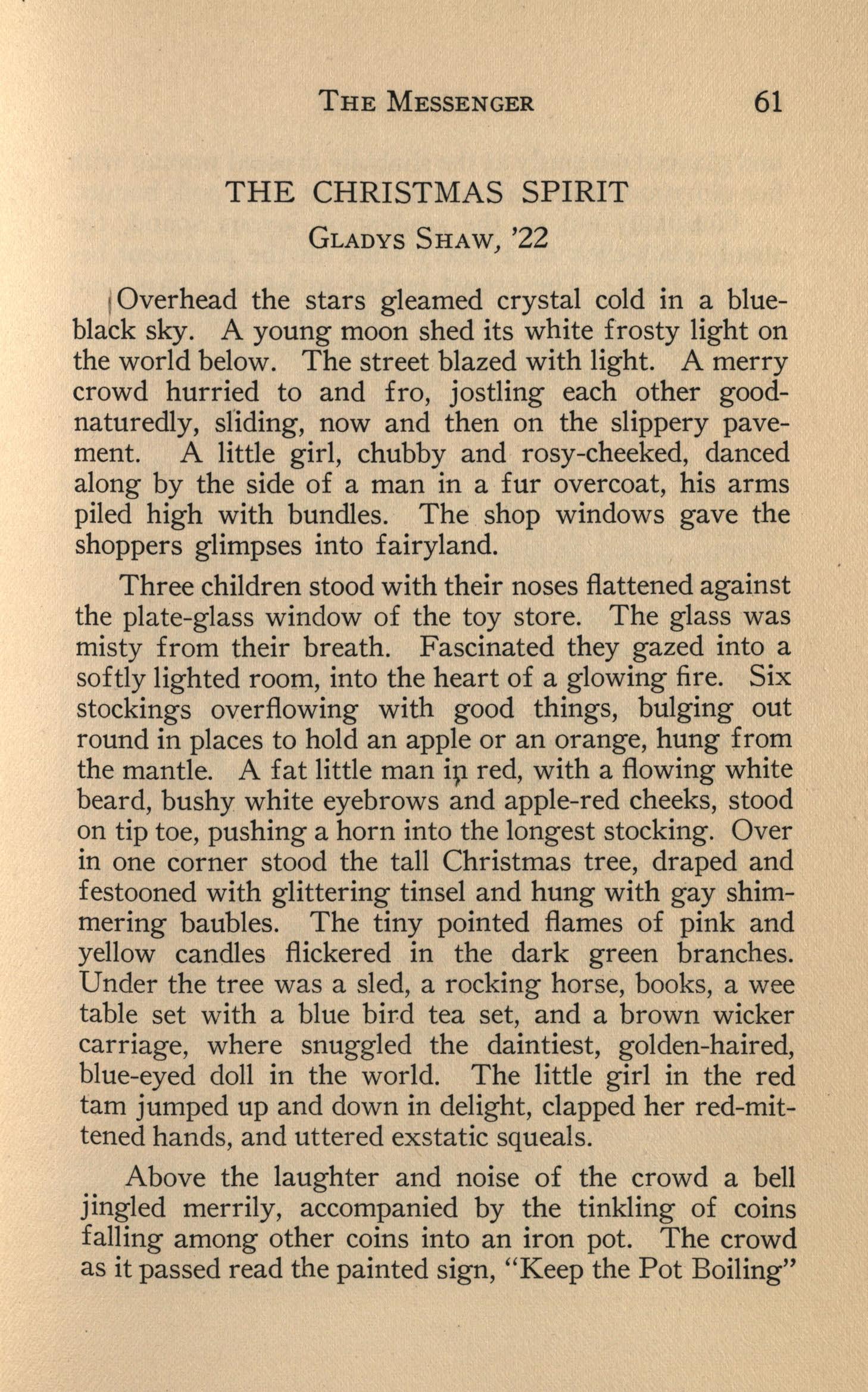
j Overhead the stars gleamed crystal cold in a blueblack sky. A young moon shed its white frosty light on the world below. The street blazed with light. A merry crowd hurried to and fro, jostling each other goodnaturedly, sliding, now and then on the slippery pavement. A little girl, chubby and rosy-cheeked, danced along by the side of a man in a fur overcoat, his arms piled high with bundles. The shop windows gave the shoppers glimpses into fairyland.
Three children stood with their noses flattened against the plate-glass window of the toy store. The glass was misty from their breath. Fascinated they gazed into a softly lighted room, into the heart of a glowing fire. Six stockings overflowing with good things, bulging out round in places to hold an apple or an orange, hung from the mantle. A fat little man ip. red, with a flowing white beard , bushy white eyebrows and apple-red cheeks, stood on tip toe, pushing a horn into the longest stocking. Over in one corner stood the tall Christmas tree, draped and festooned with glittering tinsel and hung with gay shimmering baubles. The tiny pointed flames of pink and yellow candles flickered in the dark green branches. Under the tree was a sled, a rocking horse, books, a wee table set with a blue bird tea set, and a brown wicker carriage, where snuggled the daintiest, golden-haired, blue-eyed doll in the world. The little girl in the red tam jumped up and down in delight, clapped her red-mittened hands, and uttered exstatic squeals.
Above the laughter and noise of the crowd a bell jingled merrily, accompanied by the tinkling of coins falling among other coins into an iron pot. The crowd as it passed read the painted sign, "Keep the Pot Boiling"
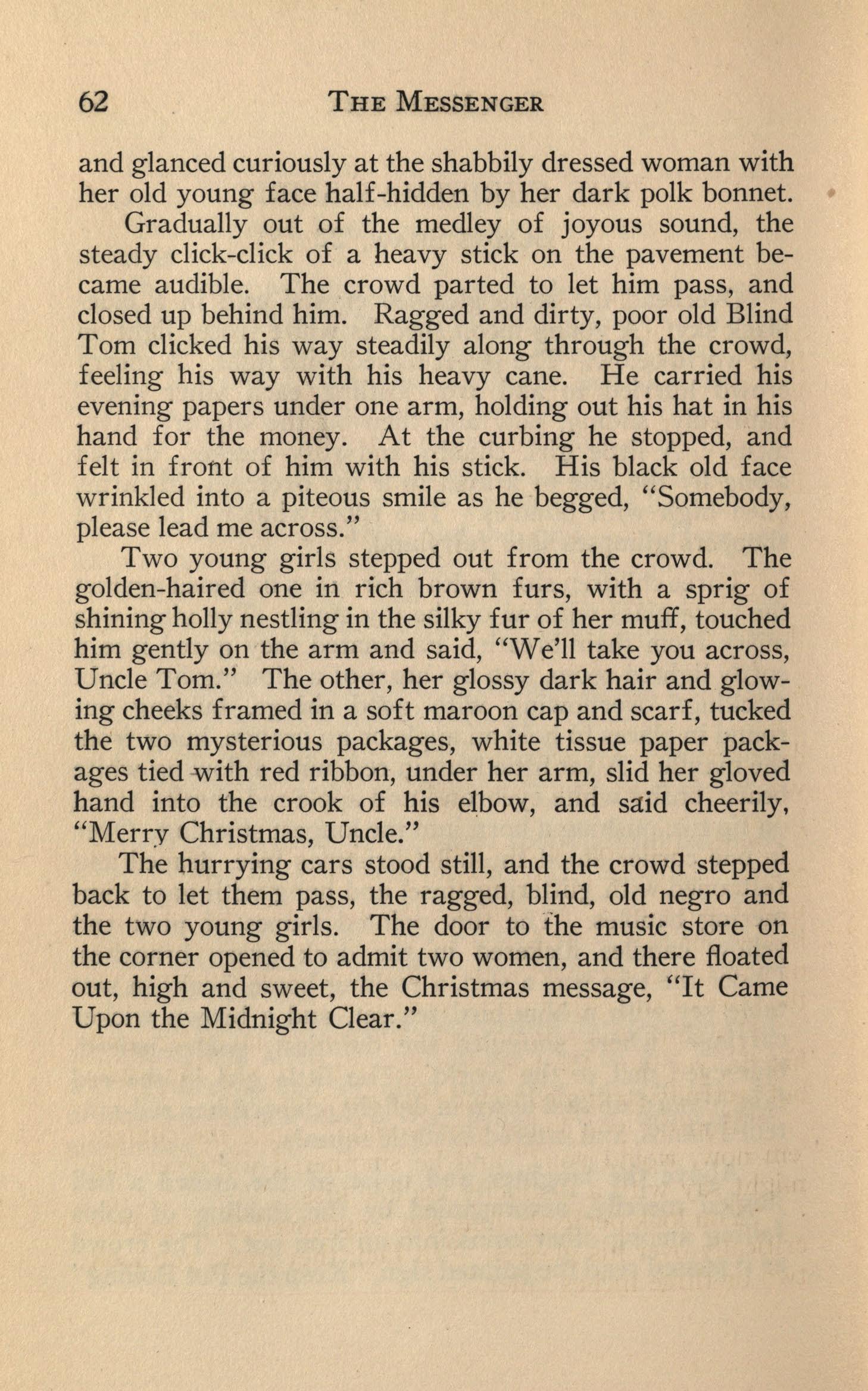
and glanced curiously at the shabbily dressed woman with her old young face half-hidden by her dark polk bonnet. Gradually out of the medley of joyous sound, the steady click-click of a heavy stick on the pavement became audible. The crowd parted to let him pass, and closed up behind him. Ragged and dirty, poor old Blind Tom clicked his way steadily along through the crowd, feeling his way with his heavy cane. He carried his evening papers under one arm, holding out his hat in his hand for the money. At the curbing he stopped, and felt in front of him with his stick His black old face wrinkled into a piteous smile as he begged, "Somebody, please lead me across."
Two young girls stepped out from the crowd. The golden-haired one in rich brown furs, with a sprig of shining holly nestling in the silky fur of her muff, touched him gently on the arm and said, "We'll take you across, Uncle Tom." The other, her glossy dark hair and glowing cheeks framed in a soft maroon cap and scarf, tucked the two mysterious packages, white tissue paper packages tied -with red ribbon, under her arm, slid her gloved hand into the crook of his elbow, and sa:id cheerily, "Merry Christmas, Uncle."
The hurrying cars stood still, and the crowd stepped back to let them pass, the ragged, blind, old negro and the two young girls. The door to the music store on the corner opened to admit two women, and there floated out, high and sweet, the Christmas message, "It Came Upon the Midnight Clear."
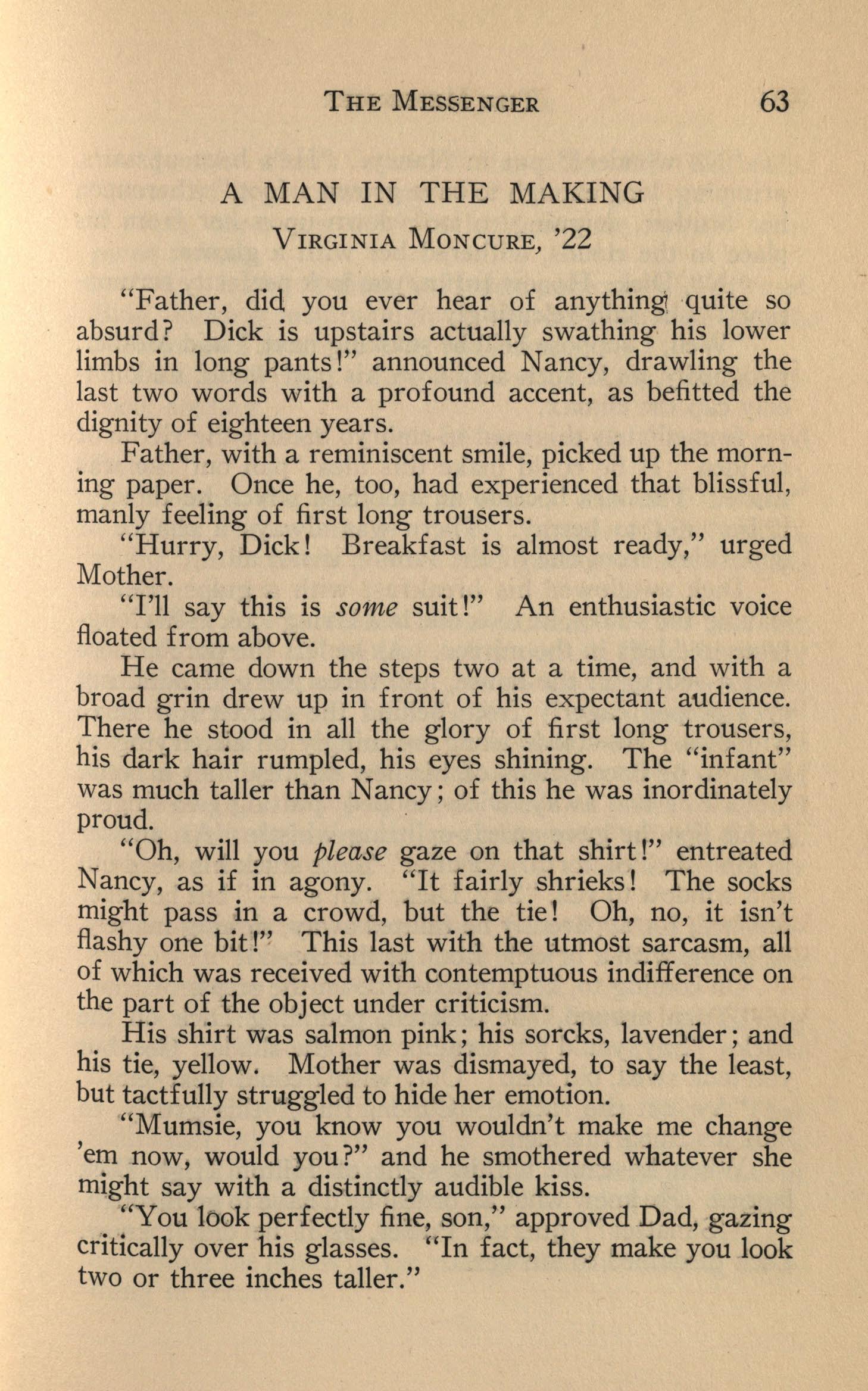
"Father, did you ever hear of anything\ quite so absurd? Dick is upstairs actually swathing his lower limbs in long pants!" announced Nancy, drawling the last two words with a profound accent, as befitted the dignity of eighteen years.
Father, with a reminiscent smile, picked up the morning paper. Once he, too, had experienced that blissful, manly feeling of first long trousers.
"Hurry, Dick! Breakfast is almost ready," urged Mother.
"I'll say this is some suit!" An enthusiastic voice floated from above.
He came down the steps two at a time, and with a broad grin drew up in front of his expectant audience. There he stood in all the glory of first long trousers, his dark hair rumpled, his eyes shining. The "infant" was much taller than Nancy; of this he was inordinately proud.
"Oh, will you please gaze on that shirt!" entreated Nancy, as if in agony. "It fairly shrieks! The socks might pass in a crowd, but the tie! Oh, no, it isn't flashy one bit!"
This last with the utmost sarcasm, all of which was received with contemptuous indifference on the part of the object under criticism.
His shirt was salmon pink; his sorcks, lavender; and his tie, yellow. Mother was dismayed, to say the least, but tactfully struggled to hide her emotion.
"Mumsie, you know you wouldn't make me change 'em now, would you?" and he smothered whatever she might say with a distinctly audible kiss.
"You look perfectly fine, son," approved Dad, gazing critically over his glasses. "In fact, they make you look two or three inches taller."

"No wonder!" put in Nancy. "He's been upstairs, primping, long enough to have grown a foot," whereupon her brother, deigning to look down upon her from his place in the clouds, withered her with a glance.
"No, Dick. Honest Injun, you look perfectly scrumptious!" she said relentingly.
"Well, I suppose he'll be smoking next," said Mother, resignedly, as if such action on his part would undoubtedly cap the climax.
Immediately this man-in-embryo became the victim of an idea. If he could make this idea "pan out" he was made. The idea became an ambition which he thought it best not to betray. There was always a chance of opposition from one of the family, if not all.
Dick swallowed his breakfast with a gulp. Before leaving for school, he took one last loving look at his longtrousered legs in the mirror. As he left the porch, there was a scurry in the house, and three pairs of admiring eyes peeped eagerly from behind the shutters of three windows. He strode along, seemingly on air, trying so hard to be unconscious of his new dignity. At a house a block or two away, Dick stopped; putting two fingers to his lips, he gave an ear-splitting whistle. An answer in kind shrilled forth. "Puff er" Scott stuck his head out of a window to yell, "Say, Dick, wait a ----," but he never finished, for apparently he fainted away, sighing inanely, "Fan me with a brick! Look at the che-ild !"
On coming to, he catapulted down the steps.
"Turn around," he ordered, pounding Dick on the back. "Say, you'd put a rainbow . in the shade. Gee, but you look swell, old man! Only wish I could wear 'em."
"Aw cut the racket. C'mon, Puff," this gruffy, to hide his embarrassment.
When he came within sight of Hilton High Dick lagged. He knew what an ordeal he'd have to go through.
" 'S'matter ?" queried Puffer, as if he didn't know. Dick disdained to answer.
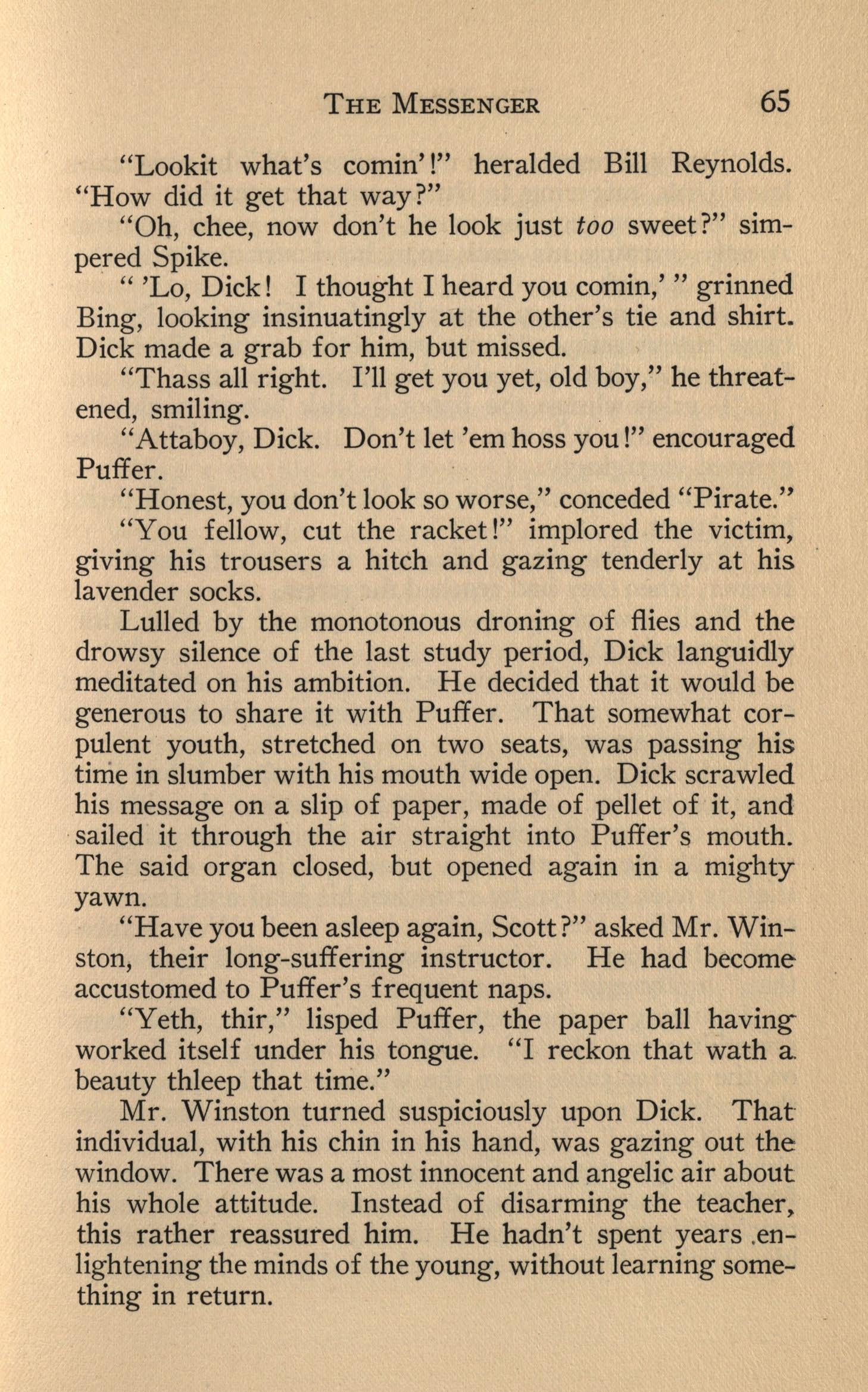
"Lookit what's comin' !" heralded Bill Reynolds. "How did it get that way?"
"Oh, chee, now don't he look just too sweet?" simpered Spike.
" 'Lo, Dick! I thought I heard you comin,' " grinned Bing, looking insinuatingly at the other's tie and shirt. Dick made a grab for him, but missed.
"Thass all right. I'll get you yet, old boy,'' he threatened, smiling.
"Attaboy, Dick. Don't let 'em hoss you!" encouraged Puffer.
"Honest, you don't look so worse," conceded "Pirate."
"You fellow, cut the racket!" implored the victim, giving his trousers a hitch and gazing tenderly at his lavender socks.
Lulled by the monotonous droning of flies and the drowsy silence of the last study period, Dick languidly meditated on his ambition. He decided that it would be generous to share it with Puffer. That somewhat corpulent youth, stretched on two seats, was passing his tirrie in slumber with his mouth wide open. Dick scrawled his message on a slip of paper, made of pellet of it, and sailed it through the air straight into Puffer's mouth. The said organ closed, but opened again in a mighty yawn.
"Have you been asleep again, Scott?" asked Mr. Winston, their long-suffering instructor. He had become accustomed to Puffer's frequent naps.
"Yeth, thir," lisped Puffer, the paper ball having worked itself under his tongue. "I reckon that wath a beauty thleep that time."
Mr. Winston turned suspiciously upon Dick. That individual, with his chin in his hand, was gazing out the window. There was a most innocent and angelic air about his whole attitude. Instead of disarming the teacher, this rather reassured him. He hadn't spent years .enlightening the minds of the young, without learning something in return.

"Really, Prescott, you do it quite well," he congratulated Dick, referring to the innocent expression.
"Were you speaking to me, sir?" that youth inquired sweetly, turning his eyes upon his instructor with the air of a cherub.
"Now, that's even better!" Mr. Winston really became enthusiastic. "Come out of the clouds, Prescott. I know you shot that pellet into Scott's mouth."
"I acknowledge the honor," Dick bowed modestly. "But, say, Mr. Winston, wasn't it a good shot?" and he grinned engagingly.
The bell rang and Dick and Puff er escaped with their hides intact.
"Puffer, I've got an idea and it's a beaut," said the former, when they had reached the street.
"Well, I wouldn't have accused you of it. Out with it, old bonehead."
"Jus' wait. Meet me behind your wood shed later on. "S'long," and he was off, swinging his hips as he thought, like a man.
Suddenly he halted. He was dead broke! It had just occurred to him. Now, how was he to get the cigars? (None of your little cigarettes for him; he was going to start with the real article, a cigar.) With his cap tilted slightly over one eye, he scratched his head and frowned meditatively. He just had to have 'em! Well, maybe Puffer had part of his allowance left. "Fat chance o' that," he thought and continued.
Lounging in the back yard after dinner, Dick saw something that filled him with surprise and joy. It was on the parlor table near the window. His eyes glued themselves upon a box on which was printed the magic word "Cigars." He proceeded to bear down upon this object of his desire. Suddenly the sound of paternal footsteps hastily making their way toward the parlor reached his ears. He feared that his father might forget bis (Dick's) l~ng trousers and the dignity imparted by

these garments to the wearer. He even visualized his father mentioning, rather insinuatingly, a certain painful operation concerning himself, the wood shed and a strap, to the tune of "it-hurts-me-more-than-it-does-you."
Snatching up two cigars and stuffing them into his pocket Dick departed precipitately for more comfortable regions. His cap at a rakish angle and his hands thrust deep into his pockets, he sauntered down the street, whistling. He found Puff er stretched luxuriously on the ground behind his wood shed.
"What's the big idea, Dick?" he asked, scrambling to a sitting position.
With a truly dramatic air, Dick produced the cigars.
"What d'yuh say t a smoke, old man?" he queried in the tone of a man-of-the-world.
"I'm game," said Puffer, with a grin.
"Game? Good crap, man! I'm more'n game," and he gave the fat boy one big, black cigar. He placed the other in his own mouth.
They made a considerable ceremony of lighting them. Each took a puff and tried in vain to suppress a cough.
"This is the life" said Dick, thinking how "swell" it was to be able to say he had smoked a cigar.
"I'll say so!" quoth the fat one, trying to see the cigar in his mouth and unconsciously looking cross-eyed in the attempt.
They puffed on, every now and then clicking off the ashes with the little finger of the hand which held the cigar. This, they considered quite a manly art. After a time Dick began to feel rather queer about the head. Smoking certainly hadn't made a man of him yet. He would never have acknowledged it, but he almost resembled a little boy who wants to get home to his mother. Puffer didn't appear as cheerful as usual. His mouth twisted in a peculiar manner.
"Say, Dick, how d'yuh feel?" asked the latter in an anxious tone.
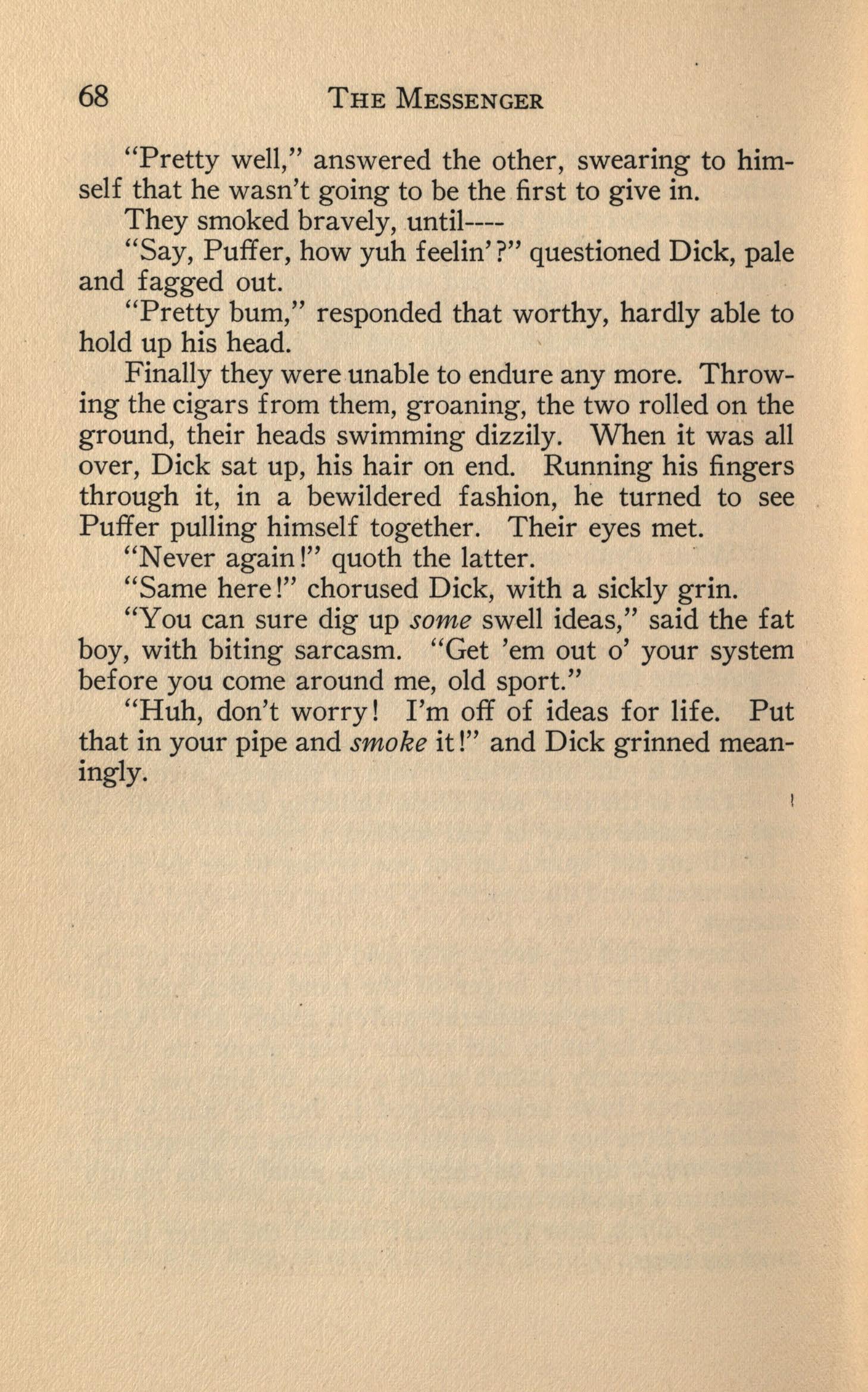
"Pretty well," answered the other, swearing to himself that he wasn't going to be the first to give in.
They smoked bravely, until---"Say, Puffer, how yuh feelin' ?" questioned Dick, pale and fagged out.
"Pretty bum," responded that worthy, hardly able to hold up his head.
Finally they were unable to endure any more. Throwing the cigars from them, groaning, the two rolled on the ground, their heads swimming dizzily. When it was all over, Dick sat up, his hair on end. Running his fingers through it, in a bewildered fashion, he turned to see Puffer pulling himself together. Their eyes met.
"Never again!" quoth the latter.
"Same here!" chorused Dick, with a sickly grin.
"You can sure dig up some swell ideas," said the fat boy, with biting sarcasm. "Get 'em out o' your system before you come around me, old sport."
"Huh, don't worry! I'm off of ideas for life. Put that in your pipe and smoke it!" and Dick grinned meaningly.
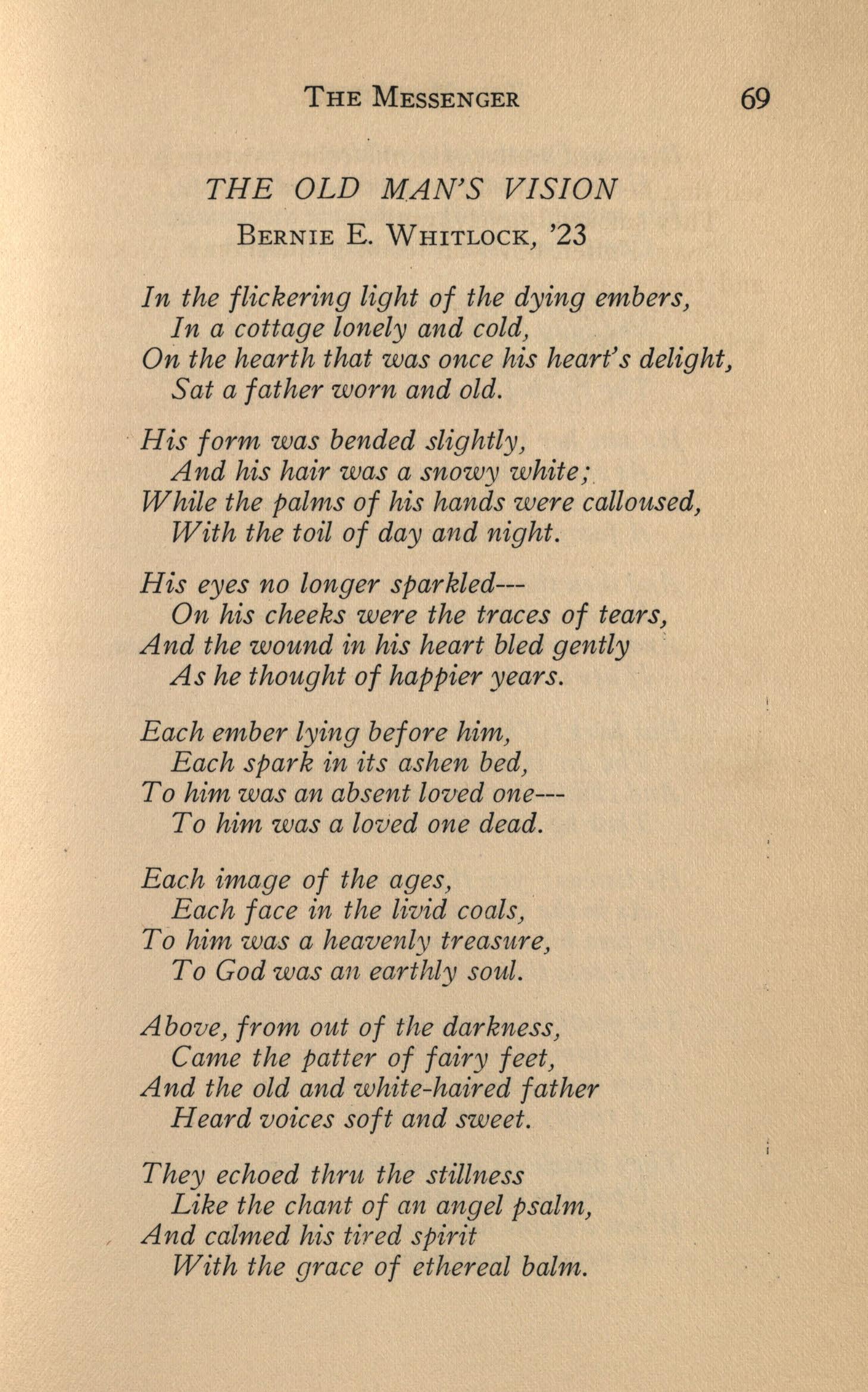
BERNIE E. WHITLOCK, '23
In the flickering light of the dying embers, In a cottage lonely and cold, On the hearth that was once his heart's delight, Sat a father worn and old.
· His form was bended slightly , And his hair was a snow y white; . While the palms of his hands were calloused, With the toil of day and night.
His eyes no longer sparkled--On his cheeks were the traces of tears, And the wound in his heart bled gently · As he thought of happier years.
Each ember lying before him , Each spark in its ashen bed, To him was an absent loved one--T o him was a lov ed one dead.
Each image of the ages, Each face in the livid coals, · To him was a heavenly treasure, To God was an earthly soul.
Abo v e, from out of the darkness , Came the patter of fairy feet, And the old and white-haired father Heard voices soft and sweet.
They echoed thru the stillness Like the chant of an angel psalm, And calmed his ti r ed spirit With the grace of ethereal balm.

It seemed as tho of a sudden
He had flown from the bounds of life, For to him, with the same old sweetness, Came the voice of an angel wife.
A simple old-time melody
She sang to the babe at her breast; But her lips re-echoed mother love--The symbol of peace and rest.
He saw her there, a madonna in white, As she nestled close beside; He relived the day she came to their home, A fairy and blushing bride;
And then the night he kissed her first By the side of the old mill stream, And he wondered now, as he'd wondered then, If life is only a dream.
But hark! The angel host draws near, The air is filled with song; And childish voices to him drift, That he has missed so long.
He listens: yes, they are the same As in the fleeting past. He sees his loved ones enter in--~ He sees them all at last.
The youthful forms around him draw In shimmering robes of white; Upon each golden head there rests A ringly crown of light.
They dazzle as the morning dew Upan the lily chaste, When o'er the hilltops peeps the sun In never seeming haste.
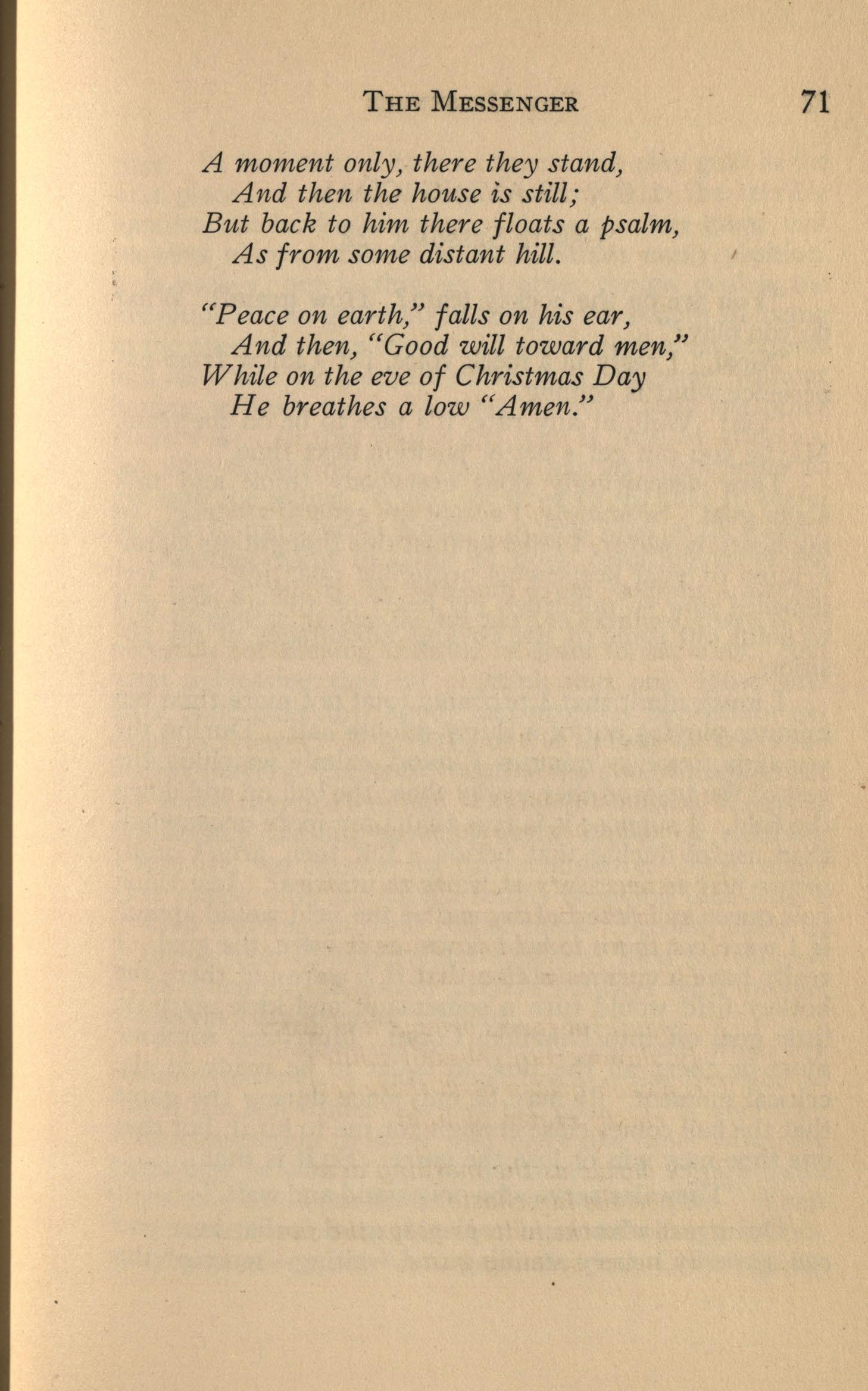
A moment only, there they stand, And then the house is still; But back to him there floats a psalm, As from some distant hill.
"Peace on earth," falls on his ear, And then, "Good will toward men," While on the eve of Christmas Day He breathes a low "Amen."
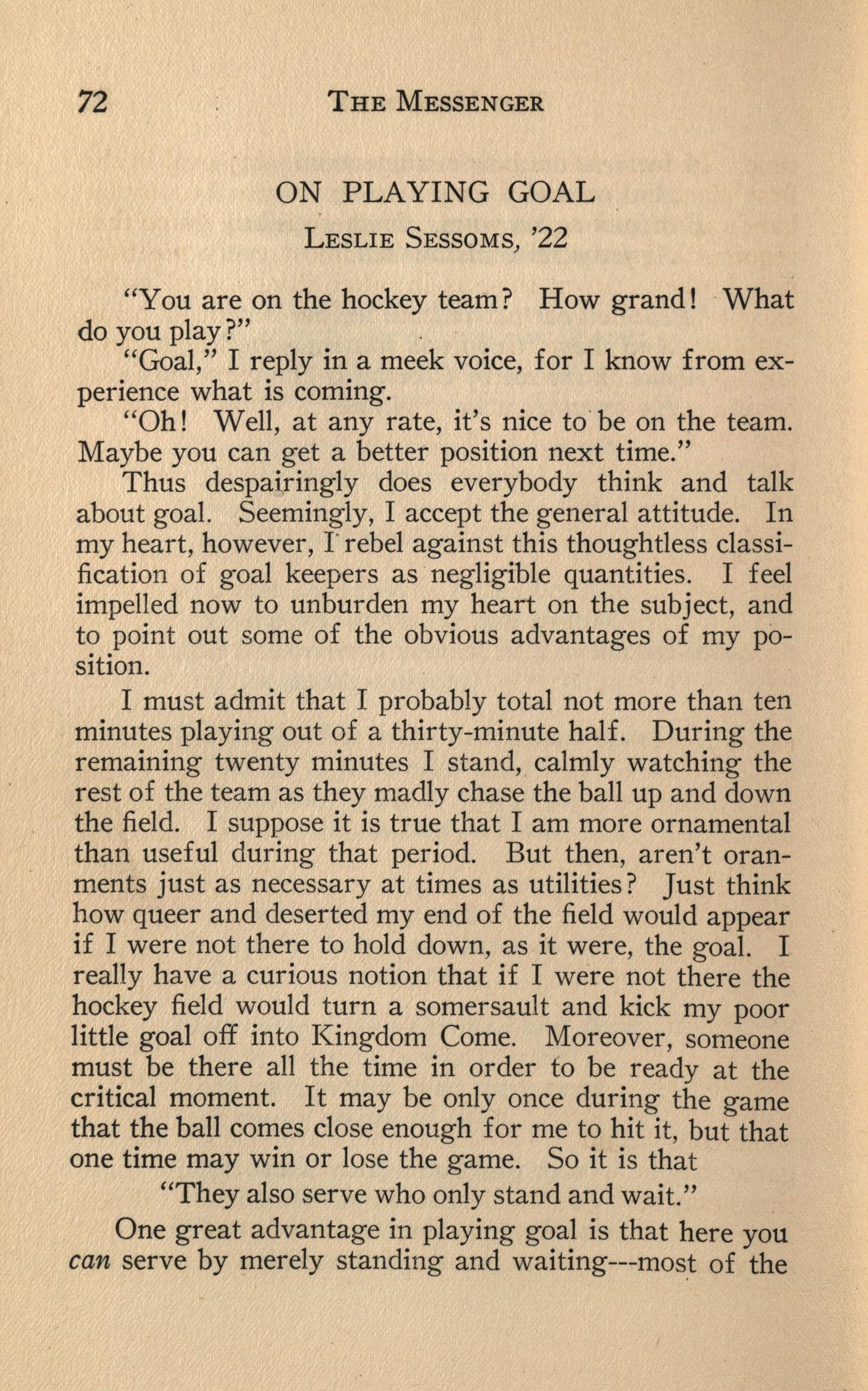
' 1Y ou ar~ on the hockey team? How grand! ·What do you play?"
"Goal," I reply in a meek voice, for I know from experience what is coming.
"Oh! Well, at any rate, it's nice to be on the team. Maybe you can get a better position next time."
Thus despa~ringly does everybody think and talk about goal. Seemingly, I accept the general attitude. In my heart, however, T rebel against this thoughtless classification of goal keepers as negligible quantities. I feel impelled now to unburden my heart on the subject, and to point out some of the obvious advantages of my position.
I must admit that I probably total not more than ten minutes playing out of a thirty-minute half. During the remaining twenty minutes I stand, calmly watching the rest of the team as they madly chase the ball up and down the field. I suppose it is true that I am more ornamental than useful during that period. But then, aren't oranments just as necessary at times as utilities? Just think how queer and deserted my end of the field would appear if I were not there to 401d down, as it were, the goal. I really have a curious notion that if I were not there the hockey field would turn a somersault and kick my poor little goal off into Kingdom Come. Moreover, someone must be there all the time in order fo be ready at the critical moment. It may be only once during the game that the ball comes close enough for me to hit it, but that one time may win or lose the game. So it is that "They also serve who only stand and wait."
One great advantage in playing goal is that here you can serve by merely standing and waiting---mos .t of the

time. In fact, thatis how I happened to play goal in the first place. You see, I began hockey with the terrible handicap of having no wind. If there is any game that requires a great deal of wind in almost every position, it is hockey; but in this, as in other things, goal is the exception. The goal player can get the benefit of being in the open air, have the fun of ·watching the whole game and also have the pleasure of being in the game, without having to take the exhausting exercise that the other players do. In this way a girl who is fond of athletics, but who cannot do hard playing, has an opportunity to get into the game. It has occurred to me that it would be well to introduce a position of this kind to all games.
Another point in favor of goal, resulting from the one just given, is the freedom from keeping training. For, of course, if you do not have to exercise, there is no necessity for keeping training in order to get wind. And what a blessing that is! I think that only those who have undergone this agony can properly appreciate exemption from it. It is really pitiful to hear all the other hockey players "manfully" decline the good things to eat for which they are longing. On the other hand, I, during the hockey season, have an extra supply of eatables. There are two reasons for this abundance. First, many girls rashly offer me things fondly believing that I have to keep training and will refuse them. Second, there is, in the college, a much greater supply of food for the rest of us when all the hockey players ( always with the one exception) are keeping training.
As I mentioned above, there is one time when my position assumes a vast importance ---the moment at which the ball comes down to my goal. It is assuredly some consolation to know that there are times when the game may be won or lost by me alone, few though those times may be. I am the last resource of my team. When I see a member of the opposing team dribbling triumphantly past all opposition toward the goal, I, feeling my

importance greatly, swing my hockey stick and hit---alas, too often, the empty air. But when I do hit the ball away from the goal, the glory of it! The side lines cheer wildly, for everyone has been anxiously watching at this critical moment; my team breathes a sigh of relief, and, feeling new hope, carries the ball down to the other goal ; and, by no means least, I have such a warm glow of self-satisfaction, such a feeling of having done nobly, that I am perfectly happy for the rest of the day.
One of my greatest delights in goal-keeping lies in my unexcelled adornment. I alone have the privilege of wearing giant shin-guards; others have to be content with the little stunted ones which, when put by the side of mine, seem to have been dwarfed in early infancy. Mine come up to my waist, and extend a good way on both sides; the others come only a little above the ankle and have no side extension. I can assure you that I am very impressive looking when arrayed for playing; in fact, I greatly resemble a big brown post with head and arms sticking out at the top. Besides the ornamental values of these shin-guards, there are exceedingly useful. If I merely stand in front of the goal I take up so much room that, without exerting myself at all, it is very hard for the ball to get by me. During the last two or three cold days I have discovered that the guards are really necessary to keep me from freezing. They are made of a hard foundation heavily padded, inside and out, so that they are wonderfully warm. I know all the other players envied me this afternoon when I stood in the cold wind as comfortable as you please, while they shivered in their scantly playing garb.
The greatest pleasure of all in playing goal is, to my mind, the opportunity afforded for profitable and entertaining occupation while the ball is at the other end of the field. For instance, yesterday afternoon as I was idly gazing at my nose, it suddenly occurred to me that its shade of pinkish-lavender would be beautiful in a
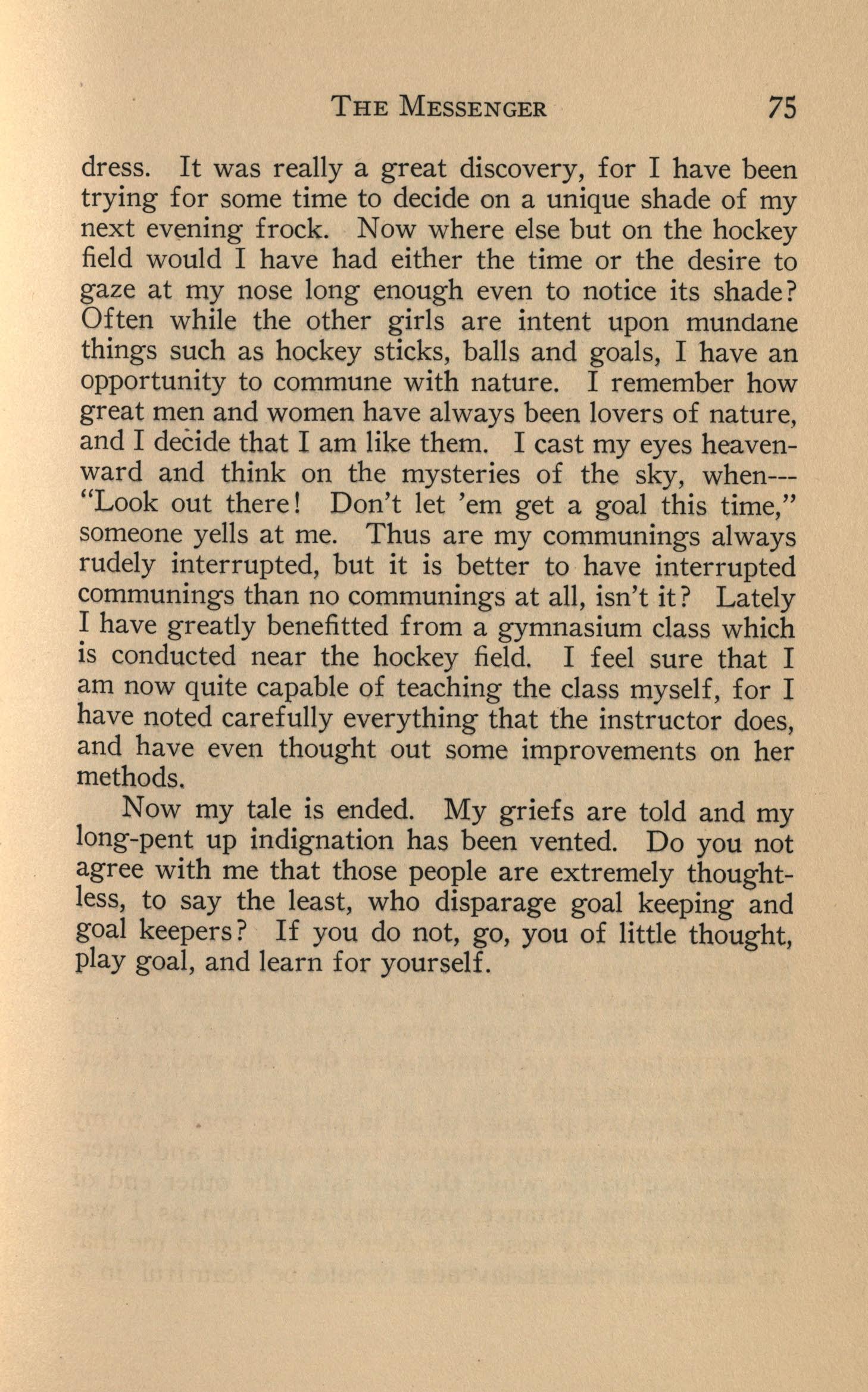
dress. It was really a great discovery, for I have been trying for some time to decide on a unique shade of my next evening frock. Now where else but on the hockey field would I have had either the time or the desire to gaze a.t my nose long enough even to notice its shade? Often while the other girls are intent upon mundane things such as hockey sticks, balls and goals, I have an opportunity to commune with nature. I remember how great men and women have always been lovers of nature, and I decide that I am like them. I cast my eyes heavenward and think on the mysteries of the sky, when--"Look out there! Don't let 'em get a goal this time," someone yells at me. Thus are my cornmunings always rudely interrupted, but it is better to have interrupted communings than no communings at all, isn't it? Lately I have greatly benefitted from a gymnasium class which is conducted near the hockey field. I feel sure that I am now quite capable of teaching the class myself, for I have noted carefully everything that the instructor does, and have even thought out some improvements on her methods.
Now my tale is ended. My griefs are told and my long-pent up indignation has been vented. Do you not agree with me that those people are extremely thoughtless, to say the least, who disparage goal keeping and goal keepers? If you do not, go, you of little thought, play goal, and learn for yourself.

ELSIE MORGAN, '23
Mayland Hadden was not very strong in the memory line, but she remembered perfectly that Grandma Payne had told her to bring her good spectacles home from the oculist's. Why couldn't she have been like other girls, and gone on home? Instead of that, from the oculist's she had gone for a walk with one of her chums. Oh! but they had had a wonderful time wandering along the bank of a stream. They had stopped somewhere and played tag, and to keep the spectacles safe, she had laid them in the hollow of a stump. In this dense stretch of wood she knew she'd never be able to find that stump again.
Oh, goodness! She had felt she was doing a good deed to take that walk, and hunt flowers for Esther's mother. Her mother had been sick for many years, and she had all the grouchy qualities of an invalid. Poor Esther worked night and day, and was a perfect child, yet her mother was never pleased. She had not even liked the flowers. That was the worst of having lost the spectacles.
Mayland got a book, and tried again and again to become interested, but threw it down in despair. She was becoming more and more indignant with herself. She strode out into the spring air and walked thrice around the house. She saw none of the newness and freshness of the spring, but kept thinking hard. She should have kept those spectacles right in her hand because she knew how Grandma was about those things. This morning had gone ·on very well, but Granny might need those spectacles any minute. Suppose she should need them, what would there be for her to do?
* Modeled on "The Failure" by C. C. Dobie.
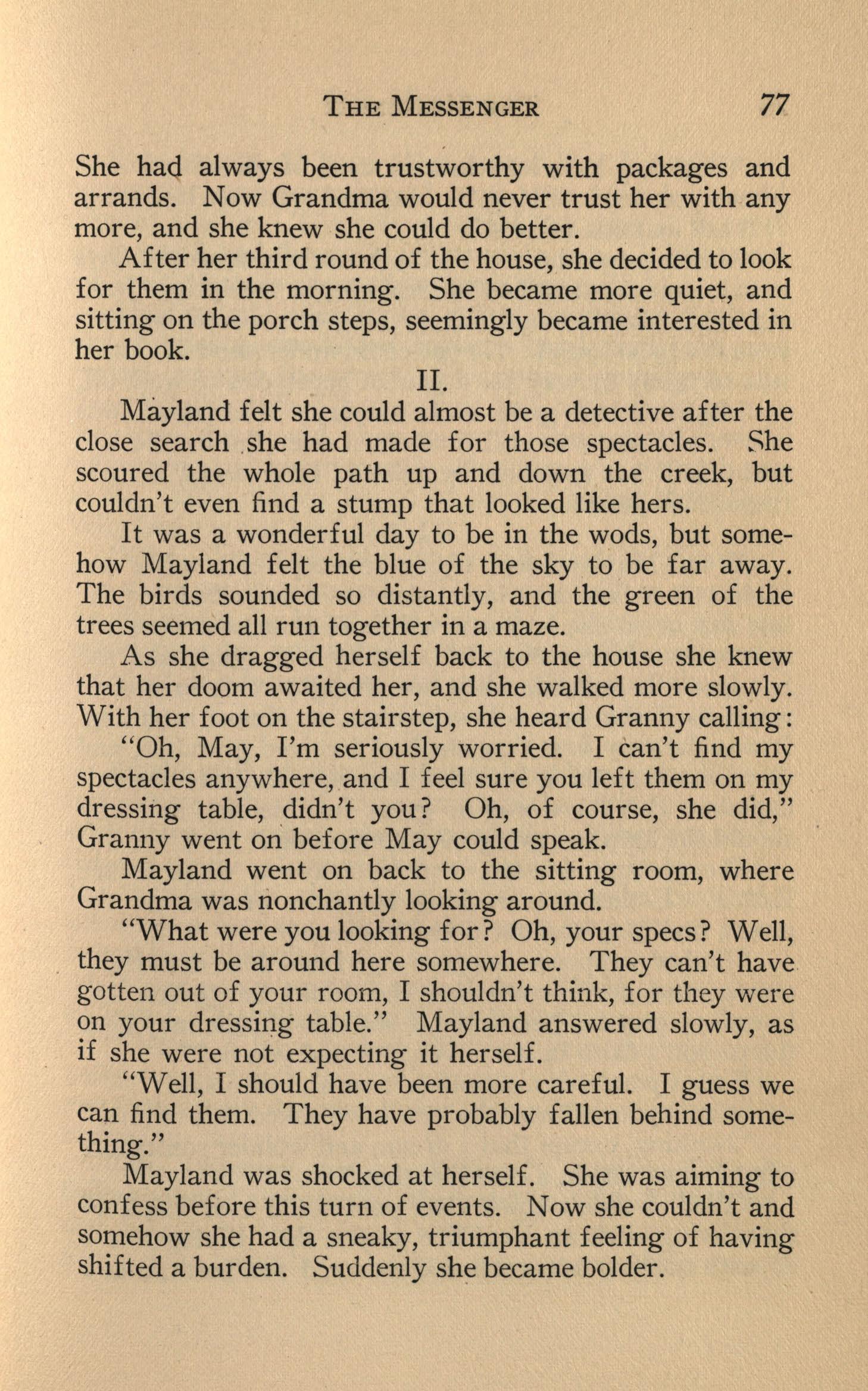
She haq always been trustworthy with packages and arrands. Now Grandma would never trust her with any more, and she knew she could do better.
After her third round of the house, she decided to look for them in the morning. She became more quiet, and sitting on the porch steps, seemingly became interested in her book.
Mayland felt she could almost be a detective after the close search .she had made for those spectacles. She scoured the whole path up and down the creek, but couldn't even find a stump that looked like hers.
It was a wonderful day to be in the wods, but somehow Mayland felt the blue of the sky to be far away. The birds sounded so distantly, and the green of the trees seemed all run together in a maze.
As she dragged herself back to the house she knew that her doom awaited her, and she walked more slowly. With her foot on the stairstep, she heard Granny calling:
"Oh, May, I'm seriously worried. I can't find my spectacles anywhere, and I feel sure you left them on my dressing table, didn't you? Oh, of course, she did," Granny went ori before May could speak.
Mayland went on back to the sitting room, where Grandma was nonchantly looking around.
"What were you looking for? Oh, your specs? Well, they must be around here somewhere. They can't have gotten out of your room, I shouldn't think, for they were on your dressing table." Mayland answered slowly, as if she were not expecting it herself.
"Well, I should have been more careful. I guess we can find them. They have probably fallen behind something."
Mayland was shocked at herself. She was aiming to confess before this turn of events. Now she couldn't and somehow she had a sneaky, triumphant feeling of having shifted a burden. Suddenly sh~ became bolder.

"You may have left them in some of the other rooms where you were sewing." Mayland went on hurriedly. "I'll ask mamma to look."
Mamma and the rest of the household searched days in vain, and mamma had the maid begin the spring cleaning in grandma's room. Everything was moved, but they were not to be found. No one could understand it. There was certainly no way for a pair of spectacles to walk off. Mayland had gone back to play. Her mind was easier, but she was still tormented over the lie she had told. Still her grandmother should have asked a more responsible person.
When Mayland was trying to sleep for a while one afternoon a few days later, she was aware that for the last day or so she had worried more than ever over the spectacles. Her feeling of security was gone, and she felt lost. It seemed, when she thought of it in certain ways, as if she were a law-breaker, or almost anything. It was the very first time she had deceived grandma, and there was something between them now that she couldn't explain. But there was no great fortune lost, and why should she keep worrying over confessing?
She got up, dressed, and went for a while to see Esther. Esther was rocking her little brother on the porch, and Mayland sat down beside her.
"Esther, suppose---suppose a girl had done dreadfully wrong, and if she confesses, she thinks the person will lose all respect for her, while if she doesn't, she may keep the person's faith in her. What would you do?"
Esther pondered a second or two, and then said; ''Can't you tell me why you have asked this of me?"
"Nothing, except that I dream and wonder sometimes what I would do in a case like that."
"Well, I didn't think that you would ever think of that, living such an ideal life as you do. Living like I do with nothing but work and worry, I feel sometimes I

shall go insane. I have often feared that I would steal or murder, and sometimes I have even feared I would commit suicide. The only advice I can give is to trust in yourself, and the world will trust in you. It has saved me from all my worries about such things."
Mayland sat silently for a few seconds at Esther's feet . Arising, she kissed Esther's hands and face, and rushed out into the street. She noticed nothing as she thoughtfully walked homeward, and once or twice she felt sure she would have to cry. She trusted herself fully now, and knew exactly what she was going home to do. Why did she let go of herself to tell those lies? Why had she not kept faith?
"Oh! I'm so afraid Granny will never forgive me." She spoke softly to herself. "Do I have faith in myself?" As she spoke she knew that she did. "Even so, "':ill the world trust me anymore?" But what difference would it make? To believe God and one's self is enough.
As she stepped over the threshold at home, she did not feel so sure of herself. She went into the sitting room and sank down in a chair absent-mindedly. What would be the end of this struggle that was going on in her soul? She watched the clock hands glide around. Suddenly she made a resolve. "When the hands have got to four, I shall have done it."
It was now a quarter past three. Three quarters of an hour! "I shall go mad!" she thought.
"Dearie, I have looked all over again for my spectacles. I certainly think it's funny. Are you sure you put them on my dressing table?" Grandma's silvery voice broke into the silence.
"No. Granny, not at all sure." And as Granny looked around surprisedly, she went on, "I lost them the day I brought them from town. You seemed so sure about their being here, I didn't tell you any difference."
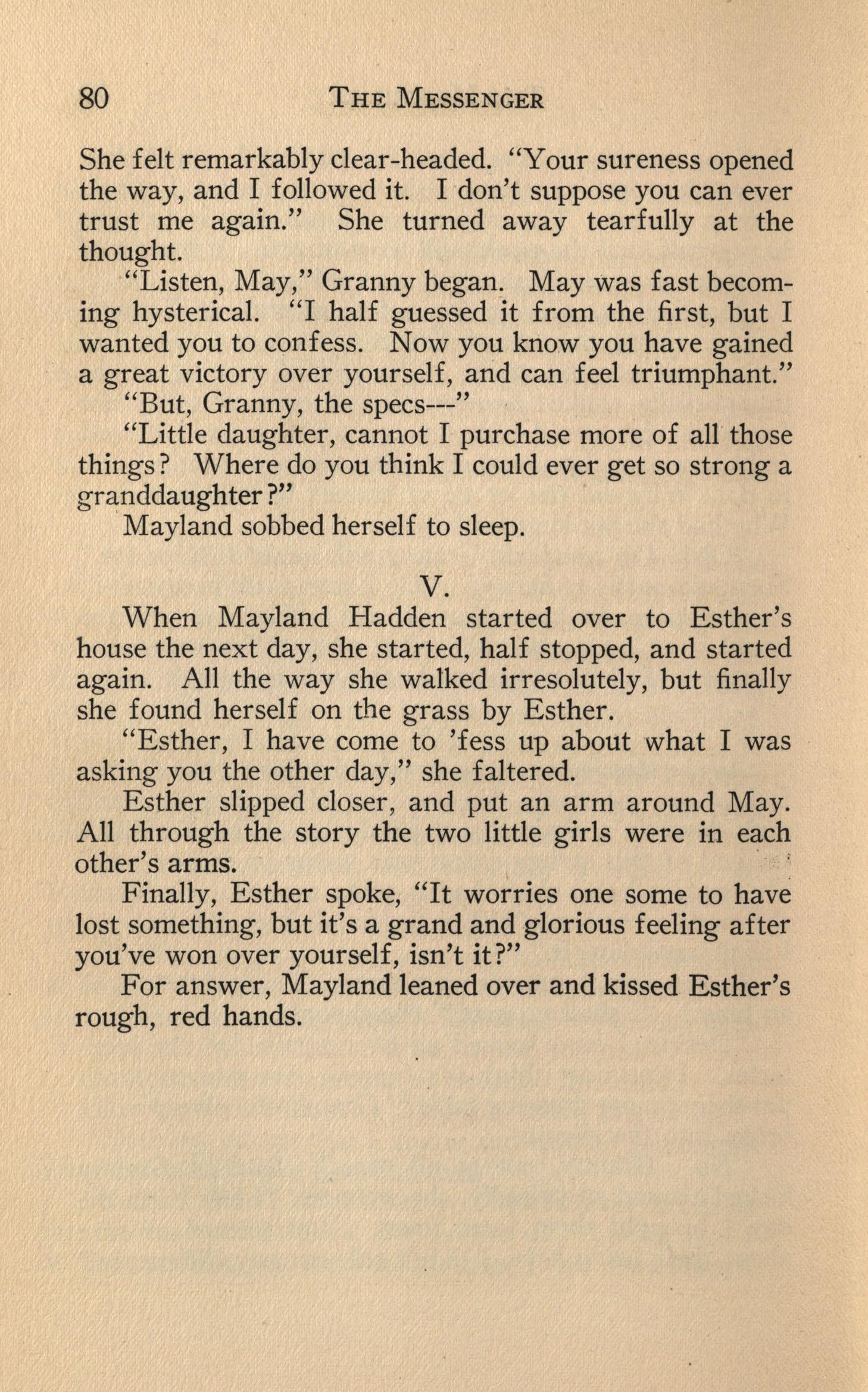
She felt remarkably clear-headed. "Your sureness opened the way, and I followed it. I don't suppose you can ever trust me again." She turned away tearfully at the thought.
"Listen, May," Granny began. May was fast becoming hysterical. "I half guessed it from the first, but I wanted you to confess. Now you know you have gained a great victory over yourself, and can feel triumphant."
"But, Granny, the specs---"
"Little daughter, cannot I purchase more of all those things? Where do you think I could ever get so strong a granddaughter?"
·Mayland sobbed herself to sleep.
When Mayland Hadden started over to Esther's house the next day, she started, half stopped, and started again. All the way she walked irresolutely, but finally she found herself on the grass by Esther.
"Esther, I have come to 'fess up about what I was asking you the other day," she faltered.
Esther slipped closer, and put an arm around May. All through the story the two little girls were in each other's arms. · '
Finally, Esther spoke, "It worries one some to have lost something, but it's a grand and glorious feeling after you've won over yourself, isn't it?"
For answer, Mayland leaned over and kissed Esther's rough, red hands.
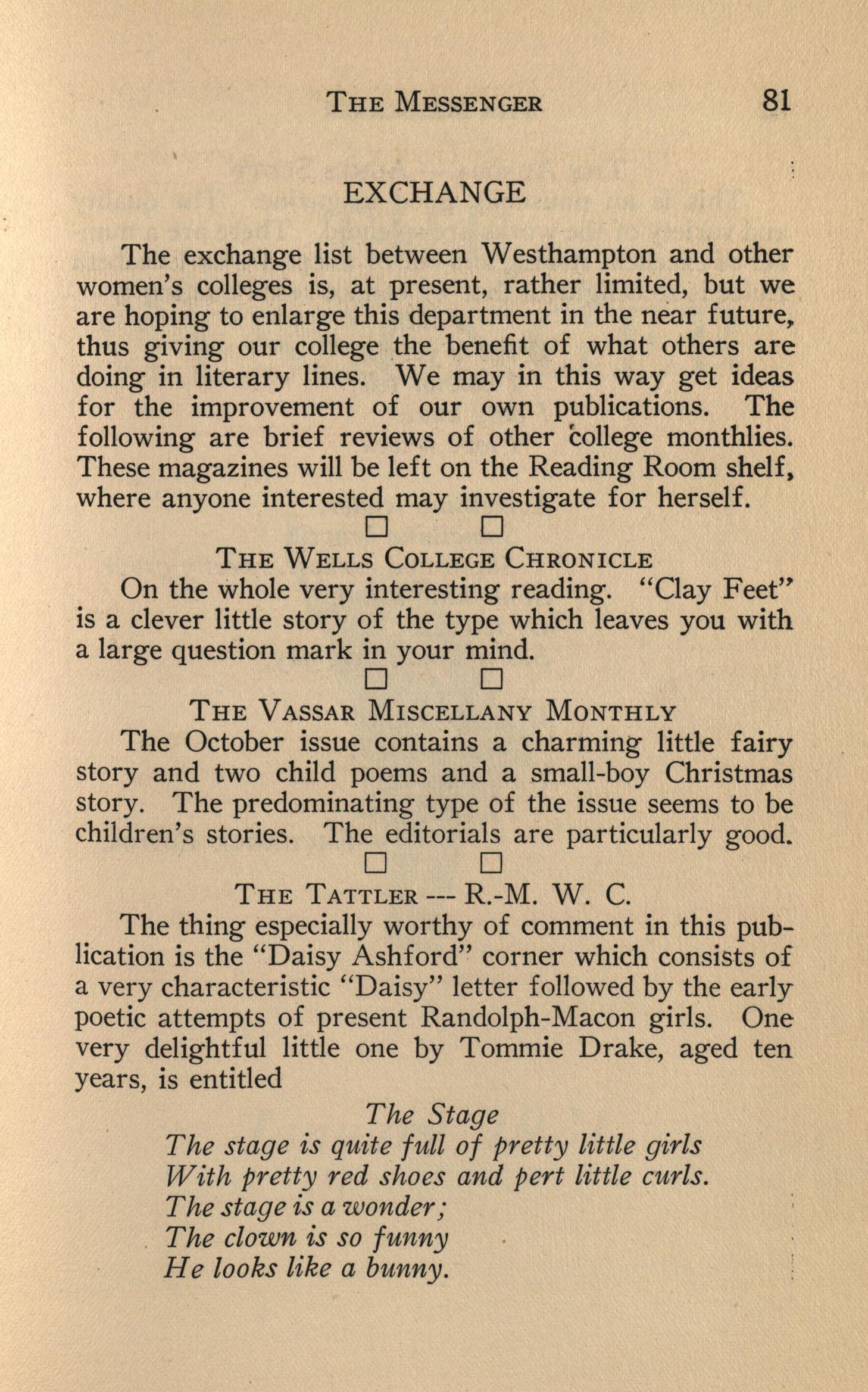
The exchange list between Westhampton and other women's colleges is, at present, rather limited, but we are hoping to enlarge this department in the near future, thus giving our college the benefit of what others are doing in literary lines. We may in this way get ideas for the improvement of our own publications. The following are brief reviews of other college monthlies. These magazines will be left on the Reading Room shelf, where anyone interested may investigate for herself.
On the whole very interesting reading. "Clay Feet" is a clever little story of the type which leaves you with a large question mark in your mind.
The October issue contains a charming little fairy story and two child poems and a small-boy Christmas story. The predominating type of the issue seems to be children's stories. The editorials are particularly good.
The thing especially worthy of comment in this publication is the "Daisy Ashford" corner which consists of a very characteristic "Daisy" letter followed by the early poetic attempts of present Randolph-Macon girls. One very delightful little one by Tommie Drake, aged ten years, is entitled
The Stage
The stage is quite full of pretty little girls With pretty red shoes and pert little curls. The stage is a wonder; The clown is so funny He looks like a bunny.

This is an unusua.41:y-goodmagazine. The quality and variety of the works are splendid. There are a num- berof ·.excellerit stories, ana ·0ne of t'he poems :by Elizabeth · Euloc;is so•<\leFighHul'th.it\ 've 1<:a.1motres:rst qti©tingii:t: ¥mirth Wh at'is youtk? q <eanno't"tell;· I •only kn:ow -If 'love it 'well.
.Something 'tender, !i_omething -brave, ,Slight a:nd earnes't, :sweetly grave, Something mystic Of today, Sad and i'nJfinitelyigay, What is youth? I cannot 'tell; .J only know I love tt well. ---EXCHANGE EDITOR.